30 Best Moral stories in English with Good Moral
In the mesmerizing world of storytelling, where every word builds a colourful fabric of lessons and inspiration, we present “30 Engaging Moral Stories in English.” These aren’t simply stories, they’re lights of knowledge, each with a significant lesson at its centre.

These stories provide vital insights into the human experience and the values that define our lives, from the uplifting experiences of loving animals to the journeys of outstanding men. Join us on an unforgettable journey through these engaging stories, each story indicated to leave you with a useful lesson that you may keep with you throughout your life’s chapters.

1. The Kind Elephant
In a lush jungle, there lived a wise and kind elephant named Ellie. Animals from all around sought her advice because she was known for her gentle wisdom.
One day, Leo, a young and boastful lion, challenged Ellie to a strength contest. But Ellie proposed a different challenge: to make the most animals smile in a day.
Leo roared at the animals, trying to make them smile, but they were too scared. Ellie, on the other hand, listened to their problems and shared her wisdom, bringing smiles to their faces. By the end of the day, Ellie had won the contest.
Leo realized that true greatness was not just about strength but also about kindness and wisdom. He asked Ellie to teach him, and from that day on, he became a wiser and kinder king.
Moral: True greatness comes from kindness and wisdom, not just physical strength.
2. The Magical Paintbrush
In a small village, there lived a poor but talented artist named Mia. She dreamed of a magic paintbrush that could bring her paintings to life. One day, an old man gave her a magical paintbrush.
Mia began to create beautiful paintings, and every stroke of the brush made her creations come alive. She used this power to help her village, making food and shelter for those in need.
But word of her magic paintbrush reached a greedy king who demanded it for himself. Mia refused, and the king grew angry. He sent his soldiers to take the brush by force. When they tried, the brush painted a fierce storm, and the soldiers fled.
Mia, realizing the brush’s potential for misuse, decided to hide it where no one could find it. She continued to use her art to bring happiness and prosperity to her village, teaching them that true magic lies in kindness and creativity.
Moral: True magic is found in kindness and creativity, not in material possessions.
3. The Three Seeds of Hope
Once, there was a boy named Sam who found three different seeds. He decided to plant them in his garden.
The first seed grew into a tall, strong tree that bore delicious fruits. Sam shared the fruits with the hungry villagers, and they were grateful.
The second seed grew into a small but sturdy bush covered in colourful flowers. Sam used these flowers to make perfumes and oils, creating a successful business that supported his family.
The third seed, however, yielded only thorns and weeds. Sam considered uprooting it, but he decided to give it another chance. He removed the thorns and took good care of it. Over time, the patch turned into a beautiful garden with fragrant flowers and herbs, becoming a place of peace for the villagers.
Moral: With patience and care, even seemingly unpromising situations can turn into something beautiful.
4. The Kind Swan and the Crow
In a serene pond, there was a beautiful white swan named Sarah. She was known for her grace and kindness to all the creatures in the pond.
One winter, a poor injured crow named Cody asked Sarah for help. Despite their differences, Sarah allowed Cody to share her nest and fed him with her beak. She nursed him back to health.
As Cody regained his strength, he became greedy and wanted Sarah’s nest for himself. He tricked Sarah into leaving by telling her about a supposedly better lake. When she arrived, she found it was polluted and inhospitable.
Sarah returned to her old pond, tired and weak, but the other animals had seen her kindness and Cody’s betrayal. They chased Cody away, and Sarah was welcomed back with open wings.
Moral: Kindness and gratitude are rewarded with true friendship and support.
5. The Boy and the Starfish
On a vast beach, a young boy named Liam spent his days picking up stranded starfish and throwing them back into the ocean. A man passing by asked, “Why bother? You can’t save them all. What difference does it make?”
Liam picked up another starfish, tossed it into the water, and replied, “It made a difference to that one.”
He continued his mission, saving as many starfish as he could, one at a time, while the man watched in silence.
Moral: Small acts of kindness can make a big difference, even if we can’t help everyone.
6. The Greedy Squirrel
In a peaceful forest, there lived a squirrel named Sammy. Sammy was known for being very greedy. He would collect far more acorns than he needed, leaving his fellow animals with fewer to gather.
One day, a wise old owl named Olivia noticed Sammy’s behaviour and decided to teach him a lesson. She offered Sammy a deal. She would give him a magical bag that could hold as many acorns as he wanted, but it came with a catch. For every acorn he put in, he had to give one to his friends.
At first, Sammy grumbled but agreed to the deal. As he began sharing with his friends, he noticed something amazing. The more he gave, the more his friendships grew, and the happier he felt. In the end, he realized that being greedy had never brought him happiness, but sharing and kindness did.
Moral: Sharing and kindness lead to true happiness, while greed leaves you empty.
7. The Caring Sunflower
In a sunny garden, there was a beautiful sunflower named Sunny. She was the tallest and brightest in the garden, and all the other flowers looked up to her.
One day, a tiny daisy named Daisy was struggling to grow because she wasn’t getting enough sunlight. Sunny noticed Daisy’s predicament and leaned her head to provide shade and warmth. Daisy began to thrive with Sunny’s help.
As the days passed, Sunny’s stem grew weaker, and her petals began to droop. She sacrificed her own well-being to help Daisy. When the other flowers saw what Sunny had done, they rallied around her, providing support and nourishment.
Sunny may have lost some of her bright petals, but she gained something more valuable: the love and gratitude of her fellow flowers.
Moral: True beauty lies not in appearances but in the kindness and care we show to others.
8. The Little Engine That Could
In a busy toyland, there was a little blue engine who loved to help others. She wasn’t the biggest or the strongest, but she had a determined spirit. One day, a big toy train needed to be pulled over a high mountain, but the strong engines refused, saying it was too heavy.
The little blue engine stepped forward and said, “I think I can.” With great effort and determination, she started pulling the heavy load up the steep mountain, repeating to herself, “I think I can, I think I can.”
Despite the challenge, the little blue engine persevered and successfully carried the load over the mountain. She had shown that determination and a positive attitude could accomplish great things.
Moral: With determination and a positive attitude, even the smallest can achieve great feats.
9. The Fox and the Crow
In a forest, a clever fox named Felix watched a crow perched on a tree branch with a delicious piece of cheese in its beak. The crow felt proud of its prized possession.
Felix wanted the cheese and hatched a cunning plan. He praised the crow’s beautiful voice, saying, “I’m sure your singing is as lovely as your appearance. Please, sing a song for me.”
Flattered, the crow opened its beak to sing, and the cheese fell to the ground. Felix quickly grabbed it and ran away.
The crow learned a valuable lesson: beware of flattery and vanity, for they can lead to one’s downfall.
Moral: Don’t be easily swayed by flattery and always stay humble.
10. The Ant and the Grasshopper
In a meadow, there were two insects, an ant and a grasshopper. The ant was diligent and spent the summer gathering food, preparing for the coming winter. The grasshopper, however, spent the summer singing and playing, believing there was plenty of time.
When winter arrived, the ant had a cosy burrow filled with food. The grasshopper, on the other hand, had nothing and was cold and hungry.
The ant shared some of its food with the grasshopper, but the grasshopper had learned the importance of preparation the hard way.
Moral: Hard work and preparation pay off in the long run, while procrastination leads to difficulties.
11. The Helpful Firefly
In a dark forest, there was a little firefly named Finn. Finn had a unique gift – he could light up the night with his glowing tail. One day, he noticed a group of lost animals struggling to find their way in the dark.
Finn decided to help them by lighting up their path. He guided them safely back to their homes. Word of Finn’s kindness quickly spread, and soon, animals from all over the forest would seek his assistance.
Finn realized that his gift was meant to be shared with others to make their lives brighter. He spent his nights helping those in need, bringing warmth and comfort to the forest.
Moral: Sharing your unique talents and helping others can brighten not only their lives but also your own.
12. The Lonely Sunflower
In a vast field of wildflowers, there stood a tall and vibrant sunflower named Sam. Sam was so proud of his height that he looked down on the smaller flowers and refused to mingle with them.
As time passed, Sam grew lonely, and his surroundings became dull. The other flowers thrived in the community and enjoyed each other’s company, sharing the beauty of the field.
One day, a little girl visited the field and picked a sunflower to take home. She chose a small, humble flower rather than the tall, proud Sam. Sam realized that it was his arrogance that kept him from being chosen.
Moral: True beauty is not in how tall or big you are but in how you treat others and the community you build.
13. The Brave Little Turtle
In a serene pond, there lived a timid turtle named Timmy. He was always afraid of trying new things and facing challenges. Timmy’s friends often played games and explored the pond, but he hesitated.
One day, the pond experienced a severe drought, and the water level dropped dangerously low. Timmy realized he needed to be brave and find a way to save the pond and his friends.
He set out on a journey, confronting his fears along the way. Timmy met other animals, and together, they dug channels to bring water back to the pond. Timmy had learned that being brave was not about being fearless but about facing your fears when it mattered.
Moral: True bravery is not the absence of fear but the ability to overcome it when needed.
14. The Clever Monkey and the Crocodile
In a lush jungle, a clever monkey named Max and a crocodile named Clyde were best friends. They shared many happy moments together. But one day, Clyde’s wife, Clara, craved a monkey’s heart as a special treat.
Clyde didn’t want to harm his friend, Max, but he was afraid to tell his wife. So he invited Max to visit his home on the other side of the river. Max, being clever, suspected something was amiss and devised a plan.
Max told Clyde he left his heart on the tree. When they reached the middle of the river, Max pointed to the tree and said, “My heart is there, on that branch.” Clyde, wanting to please Clara, swam back to the tree, and Max escaped.
Max learned that cleverness could save him from even the trickiest situations, and Clyde realized the importance of being honest with his loved ones.
Moral: Cleverness, when used wisely, can help you out of challenging situations, but honesty is essential in any friendship.
15. The Two Builders
In a busy town, there were two builders, Rick and Chris. Rick always took shortcuts and used cheap materials to build his houses quickly. Chris, on the other hand, put in time and effort to create sturdy, high-quality homes.
People were initially drawn to Rick’s houses because they were cheaper and built faster. However, over time, the houses began to crumble and needed constant repairs. Chris’s houses, though more expensive, stood strong and lasted for generations.
Chris’s reputation grew, and people realized that quality was more important than speed or cost. Chris taught them that taking the time to do things right was always worth it in the end.
Moral: Quality and craftsmanship should always take precedence over shortcuts and quick fixes.
16. The Grateful Sparrow
Once upon a time, in a small village, there lived a kind sparrow named Sally. Sally loved to share her food with other birds and animals in the village. She would pick grains from the fields and drop them near her nest for her friends.
One day, a fierce storm hit the village, and the rain washed away all the grains in the fields. The other birds and animals couldn’t find food, and they were hungry.
Sally decided to help her friends. She flew far and wide, searching for any leftover grains or seeds. She found some and shared them with her friends. They were grateful to Sally for her kindness.
From that day on, the birds and animals in the village always helped each other, remembering how Sally had been there for them in their time of need.
Moral: Helping others in their time of need creates lasting friendships and a sense of togetherness.
17. The Curious Kitten
In a cosy neighbourhood, there was a curious little kitten named Kitty. Kitty loved to explore and discover new things. One sunny day, Kitty noticed a shiny ball of yarn in the corner of the room.
Kitty couldn’t resist the temptation and pounced on the yarn. The more Kitty played, the more tangled the yarn became. No matter how much Kitty tried, the yarn was in a big mess.
Kitty’s owner saw the mess and gently helped untangle the yarn. Then, the owner placed the yarn in a neat basket for Kitty to play with. Kitty learned that curiosity was wonderful, but it was essential to be careful with things that weren’t hers.
Moral: Curiosity is a great trait, but it’s important to handle things with care and respect.
18. The Patient Little Seed
In a vast garden, there was a tiny seed named Sam. Sam was impatient and wanted to grow into a big plant quickly. Sam would push and pull, trying to sprout right away.
But no matter how hard Sam tried, nothing happened. The other seeds around Sam were growing, and it made Sam even more impatient.
One day, Sam noticed a wise old tree in the garden. The tree said, “It takes time to grow. You can’t rush it. Just be patient, and you’ll become a strong plant.”
Sam listened to the tree’s advice and stopped rushing. Over time, Sam grew into a tall and healthy plant. Sam realized that good things come to those who wait.
Moral: Patience is a virtue, and some things take time to grow and develop.
19. The Lost Teddy Bear
In a cheerful neighbourhood, there was a little girl named Lily who had a beloved teddy bear named Teddy. Teddy went everywhere with Lily and was her best friend.
One day, Lily and her family went on a picnic in the park. While they were enjoying their time, Lily left Teddy behind. She didn’t realize it until they returned home.
Lily was heartbroken and cried for her lost friend. Her parents comforted her and promised to help find Teddy. They retraced their steps to the park, and after a thorough search, they found Teddy under a tree.
Lily was overjoyed to have her teddy bear back and learned the importance of taking care of her things. She promised never to leave Teddy behind again.
Moral: Taking care of your belongings is important, and it’s always good to have responsible adults to help when things go wrong.
20. The Grateful Rainbow
In a colourful meadow, there lived a cheerful rainbow named Roy. Roy’s beautiful colours stretched across the sky after the rain, bringing joy to all who saw it.
One day, Roy noticed a group of children playing in the meadow. They laughed and danced under the rainbow’s vibrant colours. Roy was so happy to see their joy and decided to stay longer.
The children, amazed by the extended rainbow, clapped and cheered. Roy realized that making others happy was the most beautiful thing of all.
From that day on, Roy often stayed longer, spreading happiness and making people smile.
Moral: Bringing joy to others is the most beautiful thing you can do.
21. The Helpful Little Bee
In a sunny meadow, there lived a little bee named Benny. Benny loved collecting nectar from flowers and making sweet honey for the hive. Benny was known for being the most helpful bee in the entire colony.
One day, while Benny was collecting nectar, a ladybug named Lucy approached him, asking for help. Lucy was lost and couldn’t find her way back to her family. Benny immediately flew to her rescue, guiding her back to her family.
Lucy was extremely grateful and promised to help Benny whenever he needed it. Benny had learned that being helpful not only made others happy but also earned him wonderful friends.
Moral: Being helpful not only benefits others but also brings you friendship and gratitude.
22. The Joyful Raindrop
Up in the sky, there was a cheerful raindrop named Ricky. Ricky loved to fall from the clouds and bring life to the earth by watering the plants. Ricky had a special ability to make the rainbows appear with vibrant colours after a rain shower.
One day, Ricky noticed a sad little flower named Daisy. Daisy was drooping because she hadn’t received enough rain. Ricky decided to give extra care to Daisy and showered her with gentle rain.
Daisy’s petals perked up, and she started to bloom with bright colours. Ricky’s kindness and care not only made Daisy happy but also brought joy to the entire garden.
Moral: Small acts of kindness can brighten up someone’s day and make the world a more joyful place.
23. The Brave Little Fish
In a clear, sparkling stream, there was a tiny fish named Finn. Finn was always scared and never left his safe hiding spot beneath a rock. He watched the other fish swimming freely in the stream with envy.
One day, a big bird swooped down to catch some fish. Finn’s hiding spot was the only safe place. But when Finn saw his friends in danger, he mustered up the courage to warn them about the bird.
Finn’s bravery saved the other fish from the bird’s clutches. The other fish cheered for Finn and encouraged him to swim freely with them. Finn realized that bravery could overcome fear, and he started exploring the stream with his friends.
Moral: Being brave can lead to great adventures and help you overcome your fears.
24. The Respectful Rabbit
In a peaceful forest, there lived a respectful rabbit named Rosie. Rosie had many friends from different animal families, including squirrels, deer, and birds.
One day, the animals gathered for a big feast to celebrate their friendship. They all contributed to the feast with delicious food. Rosie noticed a young owl named Oliver who was feeling left out.
Rosie approached Oliver and invited him to join the feast. The other animals welcomed Oliver, and they all had a wonderful time together.
Rosie’s respectful and inclusive behaviour not only made Oliver’s day but also strengthened the bond between the animals in the forest.
Moral: Respecting and including others can create stronger friendships and a sense of unity.
25. The Grateful Sun
In a clear blue sky, there was a warm and bright sun named Sunny. Sunny shone every day, providing light and warmth to the world. People and animals loved to bask in Sunny’s rays.
One day, a little girl named Mia was feeling cold and sad. She wished for some sunshine to cheer her up. Sunny heard Mia’s wish and decided to stay a little longer, even though it was getting late.
Mia’s face lit up with joy as she played in the sunshine. Sunny’s kindness brought happiness to Mia and showed her that wishes can come true.
Moral: Acts of kindness can bring happiness to others and make the world a brighter place.
26. The Wise Owl’s Gift
In a peaceful forest, there lived a wise old owl named Oliver. Oliver was known for his wisdom and knowledge, and animals from all around the forest came to seek his advice.
One day, a curious young squirrel named Squeaky approached Oliver. Squeaky admired Oliver’s wisdom and asked him how he had become so wise. Oliver smiled and told Squeaky that his wisdom had come from a special gift – the gift of listening.
Oliver explained that he had spent many years not just speaking but also listening carefully to the stories and experiences of other animals in the forest. He had learned valuable lessons and gained insights by paying attention to others.
Squeaky was inspired by Oliver’s wisdom and decided to follow in his footsteps, learning that sometimes the greatest knowledge comes from being a good listener.
Moral: Listening is a valuable skill that can lead to wisdom and understanding.
27. The Painted Rocks
In a quaint village, there lived a little girl named Emily. Emily loved to paint and would often create colourful paintings on rocks she found by the river. She would then place the painted rocks along the village path for others to see.
One day, a man passing through the village noticed Emily’s painted rocks and was amazed by their beauty. He asked Emily if he could buy them to sell in a far-off city where people would appreciate her talent.
Emily agreed, and her painted rocks soon became famous and sold for a high price. But as she earned money, Emily noticed that her village became dull without her colourful rocks.
She decided to return and continued to paint her rocks, sharing them with the villagers. The joy and smiles they brought to her community were worth more to her than any riches from the city.
Moral: The true value of your talents lies in the joy they bring to your community and the people you love.
28. The Lost Balloon
At a grand carnival, there was a little girl named Lily who clutched a red balloon tightly. She loved her balloon and couldn’t bear to let it go, even when she saw another child looking sad without one.
The wind grew stronger as the day went on, and Lily’s grip on her balloon slipped. She watched in dismay as her beloved balloon soared into the sky and out of her reach.
Seeing the sad child from earlier, Lily decided to share her remaining balloon. The other child’s face lit up with joy. Lily learned that sometimes, sharing and making others happy is even better than holding on to something for yourself.
Moral: Sharing can bring happiness to others and warm your heart.
29. The Generous Baker
In a small town, there was a bakery owned by a kind baker named Mr. Thompson. Mr. Thompson was known for his delicious bread and pastries, but he was even more renowned for his generosity.
Every day, he would set out a tray of fresh, warm bread outside the bakery with a sign that read, “Take what you need, pay what you can.” People who were hungry but couldn’t afford the bread could still enjoy a warm meal.
Mr. Thompson’s act of kindness inspired the whole town, and others started to follow his example, helping those in need.
Moral: Acts of generosity can inspire kindness in others and create a compassionate community.
30. The Lost Treasure Map
In a coastal village, there lived a curious boy named Timmy. One day, while exploring the beach, he found an old, crumpled map. It looked like a treasure map, and he was thrilled at the thought of finding hidden riches.
Timmy followed the map’s clues and markers diligently, digging holes in the sand along the way. He didn’t find any treasure, but he did meet a friendly old sailor named Captain Jack.
Captain Jack explained that the map wasn’t leading to gold but to a hidden message. It was a reminder that the real treasure in life is the people we meet and the adventures we have.
Timmy realized that the treasure was the lessons he had learned and the friendships he had made during his journey.
Moral: The real treasures in life are the experiences, lessons, and friendships we gather along the way.
FAQs on Moral Stories in English
What is a short moral story.
A short moral story is a little storyline that gives a lesson that teaches a valuable life principle.
Which is the best moral story?
“Ant and Grasshopper” is widely regarded as one of the best moral story classics and lasting stories, with a powerful moral lesson about the value of hard work, responsibility, and planning. It’s a well-known narrative that teaches the importance of hard work and saving for the future, making it a popular option for many.
How to write a good story
01-Engaging Beginning: Start with a captivating opening. 02-Well-Developed Characters: Create relatable and interesting characters. 03-Strong Plot Structure: Follow a clear plot structure. 04-Theme and Moral: Convey a meaningful theme or moral.
How to write a love story?
01-Develop believable characters. 02-Create tension and conflict. 03-Show love through actions and emotions. 04-Connect with readers’ emotions.
What is moral of the story
The moral of the story is its essential lesson or message, which is typically provided through the characters’ experiences. It provides direction or knowledge about life, beliefs, and conduct. In brief, it’s the story’s key point or lesson.
Share this:
- Click to share on Twitter (Opens in new window)
- Click to share on Facebook (Opens in new window)
- Click to print (Opens in new window)
- Click to share on Pinterest (Opens in new window)
- Click to share on WhatsApp (Opens in new window)
- Click to share on LinkedIn (Opens in new window)
- Click to share on Reddit (Opens in new window)
- Click to share on Tumblr (Opens in new window)
- Click to share on Telegram (Opens in new window)
- Click to share on Threads (Opens in new window)
- Click to share on X (Opens in new window)
Leave a comment Cancel reply
Save my name, email, and website in this browser for the next time I comment.

Join Discovery, the new community for book lovers
Trust book recommendations from real people, not robots 🤓
Blog – Posted on Friday, Mar 29
17 book review examples to help you write the perfect review.

It’s an exciting time to be a book reviewer. Once confined to print newspapers and journals, reviews now dot many corridors of the Internet — forever helping others discover their next great read. That said, every book reviewer will face a familiar panic: how can you do justice to a great book in just a thousand words?
As you know, the best way to learn how to do something is by immersing yourself in it. Luckily, the Internet (i.e. Goodreads and other review sites , in particular) has made book reviews more accessible than ever — which means that there are a lot of book reviews examples out there for you to view!
In this post, we compiled 17 prototypical book review examples in multiple genres to help you figure out how to write the perfect review . If you want to jump straight to the examples, you can skip the next section. Otherwise, let’s first check out what makes up a good review.
Are you interested in becoming a book reviewer? We recommend you check out Reedsy Discovery , where you can earn money for writing reviews — and are guaranteed people will read your reviews! To register as a book reviewer, sign up here.
Pro-tip : But wait! How are you sure if you should become a book reviewer in the first place? If you're on the fence, or curious about your match with a book reviewing career, take our quick quiz:
Should you become a book reviewer?
Find out the answer. Takes 30 seconds!
What must a book review contain?
Like all works of art, no two book reviews will be identical. But fear not: there are a few guidelines for any aspiring book reviewer to follow. Most book reviews, for instance, are less than 1,500 words long, with the sweet spot hitting somewhere around the 1,000-word mark. (However, this may vary depending on the platform on which you’re writing, as we’ll see later.)
In addition, all reviews share some universal elements, as shown in our book review templates . These include:
- A review will offer a concise plot summary of the book.
- A book review will offer an evaluation of the work.
- A book review will offer a recommendation for the audience.
If these are the basic ingredients that make up a book review, it’s the tone and style with which the book reviewer writes that brings the extra panache. This will differ from platform to platform, of course. A book review on Goodreads, for instance, will be much more informal and personal than a book review on Kirkus Reviews, as it is catering to a different audience. However, at the end of the day, the goal of all book reviews is to give the audience the tools to determine whether or not they’d like to read the book themselves.
Keeping that in mind, let’s proceed to some book review examples to put all of this in action.
How much of a book nerd are you, really?
Find out here, once and for all. Takes 30 seconds!
Book review examples for fiction books
Since story is king in the world of fiction, it probably won’t come as any surprise to learn that a book review for a novel will concentrate on how well the story was told .
That said, book reviews in all genres follow the same basic formula that we discussed earlier. In these examples, you’ll be able to see how book reviewers on different platforms expertly intertwine the plot summary and their personal opinions of the book to produce a clear, informative, and concise review.
Note: Some of the book review examples run very long. If a book review is truncated in this post, we’ve indicated by including a […] at the end, but you can always read the entire review if you click on the link provided.
Examples of literary fiction book reviews
Kirkus Reviews reviews Ralph Ellison’s The Invisible Man :
An extremely powerful story of a young Southern Negro, from his late high school days through three years of college to his life in Harlem.
His early training prepared him for a life of humility before white men, but through injustices- large and small, he came to realize that he was an "invisible man". People saw in him only a reflection of their preconceived ideas of what he was, denied his individuality, and ultimately did not see him at all. This theme, which has implications far beyond the obvious racial parallel, is skillfully handled. The incidents of the story are wholly absorbing. The boy's dismissal from college because of an innocent mistake, his shocked reaction to the anonymity of the North and to Harlem, his nightmare experiences on a one-day job in a paint factory and in the hospital, his lightning success as the Harlem leader of a communistic organization known as the Brotherhood, his involvement in black versus white and black versus black clashes and his disillusion and understanding of his invisibility- all climax naturally in scenes of violence and riot, followed by a retreat which is both literal and figurative. Parts of this experience may have been told before, but never with such freshness, intensity and power.
This is Ellison's first novel, but he has complete control of his story and his style. Watch it.
Lyndsey reviews George Orwell’s 1984 on Goodreads:
YOU. ARE. THE. DEAD. Oh my God. I got the chills so many times toward the end of this book. It completely blew my mind. It managed to surpass my high expectations AND be nothing at all like I expected. Or in Newspeak "Double Plus Good." Let me preface this with an apology. If I sound stunningly inarticulate at times in this review, I can't help it. My mind is completely fried.
This book is like the dystopian Lord of the Rings, with its richly developed culture and economics, not to mention a fully developed language called Newspeak, or rather more of the anti-language, whose purpose is to limit speech and understanding instead of to enhance and expand it. The world-building is so fully fleshed out and spine-tinglingly terrifying that it's almost as if George travelled to such a place, escaped from it, and then just wrote it all down.
I read Fahrenheit 451 over ten years ago in my early teens. At the time, I remember really wanting to read 1984, although I never managed to get my hands on it. I'm almost glad I didn't. Though I would not have admitted it at the time, it would have gone over my head. Or at the very least, I wouldn't have been able to appreciate it fully. […]
The New York Times reviews Lisa Halliday’s Asymmetry :
Three-quarters of the way through Lisa Halliday’s debut novel, “Asymmetry,” a British foreign correspondent named Alistair is spending Christmas on a compound outside of Baghdad. His fellow revelers include cameramen, defense contractors, United Nations employees and aid workers. Someone’s mother has FedExed a HoneyBaked ham from Maine; people are smoking by the swimming pool. It is 2003, just days after Saddam Hussein’s capture, and though the mood is optimistic, Alistair is worrying aloud about the ethics of his chosen profession, wondering if reporting on violence doesn’t indirectly abet violence and questioning why he’d rather be in a combat zone than reading a picture book to his son. But every time he returns to London, he begins to “spin out.” He can’t go home. “You observe what people do with their freedom — what they don’t do — and it’s impossible not to judge them for it,” he says.
The line, embedded unceremoniously in the middle of a page-long paragraph, doubles, like so many others in “Asymmetry,” as literary criticism. Halliday’s novel is so strange and startlingly smart that its mere existence seems like commentary on the state of fiction. One finishes “Asymmetry” for the first or second (or like this reader, third) time and is left wondering what other writers are not doing with their freedom — and, like Alistair, judging them for it.
Despite its title, “Asymmetry” comprises two seemingly unrelated sections of equal length, appended by a slim and quietly shocking coda. Halliday’s prose is clean and lean, almost reportorial in the style of W. G. Sebald, and like the murmurings of a shy person at a cocktail party, often comic only in single clauses. It’s a first novel that reads like the work of an author who has published many books over many years. […]
Emily W. Thompson reviews Michael Doane's The Crossing on Reedsy Discovery :
In Doane’s debut novel, a young man embarks on a journey of self-discovery with surprising results.
An unnamed protagonist (The Narrator) is dealing with heartbreak. His love, determined to see the world, sets out for Portland, Oregon. But he’s a small-town boy who hasn’t traveled much. So, the Narrator mourns her loss and hides from life, throwing himself into rehabbing an old motorcycle. Until one day, he takes a leap; he packs his bike and a few belongings and heads out to find the Girl.
Following in the footsteps of Jack Kerouac and William Least Heat-Moon, Doane offers a coming of age story about a man finding himself on the backroads of America. Doane’s a gifted writer with fluid prose and insightful observations, using The Narrator’s personal interactions to illuminate the diversity of the United States.
The Narrator initially sticks to the highways, trying to make it to the West Coast as quickly as possible. But a hitchhiker named Duke convinces him to get off the beaten path and enjoy the ride. “There’s not a place that’s like any other,” [39] Dukes contends, and The Narrator realizes he’s right. Suddenly, the trip is about the journey, not just the destination. The Narrator ditches his truck and traverses the deserts and mountains on his bike. He destroys his phone, cutting off ties with his past and living only in the moment.
As he crosses the country, The Narrator connects with several unique personalities whose experiences and views deeply impact his own. Duke, the complicated cowboy and drifter, who opens The Narrator’s eyes to a larger world. Zooey, the waitress in Colorado who opens his heart and reminds him that love can be found in this big world. And Rosie, The Narrator’s sweet landlady in Portland, who helps piece him back together both physically and emotionally.
This supporting cast of characters is excellent. Duke, in particular, is wonderfully nuanced and complicated. He’s a throwback to another time, a man without a cell phone who reads Sartre and sleeps under the stars. Yet he’s also a grifter with a “love ‘em and leave ‘em” attitude that harms those around him. It’s fascinating to watch The Narrator wrestle with Duke’s behavior, trying to determine which to model and which to discard.
Doane creates a relatable protagonist in The Narrator, whose personal growth doesn’t erase his faults. His willingness to hit the road with few resources is admirable, and he’s prescient enough to recognize the jealousy of those who cannot or will not take the leap. His encounters with new foods, places, and people broaden his horizons. Yet his immaturity and selfishness persist. He tells Rosie she’s been a good mother to him but chooses to ignore the continuing concern from his own parents as he effectively disappears from his old life.
Despite his flaws, it’s a pleasure to accompany The Narrator on his physical and emotional journey. The unexpected ending is a fitting denouement to an epic and memorable road trip.
The Book Smugglers review Anissa Gray’s The Care and Feeding of Ravenously Hungry Girls :
I am still dipping my toes into the literally fiction pool, finding what works for me and what doesn’t. Books like The Care and Feeding of Ravenously Hungry Girls by Anissa Gray are definitely my cup of tea.
Althea and Proctor Cochran had been pillars of their economically disadvantaged community for years – with their local restaurant/small market and their charity drives. Until they are found guilty of fraud for stealing and keeping most of the money they raised and sent to jail. Now disgraced, their entire family is suffering the consequences, specially their twin teenage daughters Baby Vi and Kim. To complicate matters even more: Kim was actually the one to call the police on her parents after yet another fight with her mother. […]
Examples of children’s and YA fiction book reviews
The Book Hookup reviews Angie Thomas’ The Hate U Give :
♥ Quick Thoughts and Rating: 5 stars! I can’t imagine how challenging it would be to tackle the voice of a movement like Black Lives Matter, but I do know that Thomas did it with a finesse only a talented author like herself possibly could. With an unapologetically realistic delivery packed with emotion, The Hate U Give is a crucially important portrayal of the difficulties minorities face in our country every single day. I have no doubt that this book will be met with resistance by some (possibly many) and slapped with a “controversial” label, but if you’ve ever wondered what it was like to walk in a POC’s shoes, then I feel like this is an unflinchingly honest place to start.
In Angie Thomas’s debut novel, Starr Carter bursts on to the YA scene with both heart-wrecking and heartwarming sincerity. This author is definitely one to watch.
♥ Review: The hype around this book has been unquestionable and, admittedly, that made me both eager to get my hands on it and terrified to read it. I mean, what if I was to be the one person that didn’t love it as much as others? (That seems silly now because of how truly mesmerizing THUG was in the most heartbreakingly realistic way.) However, with the relevancy of its summary in regards to the unjust predicaments POC currently face in the US, I knew this one was a must-read, so I was ready to set my fears aside and dive in. That said, I had an altogether more personal, ulterior motive for wanting to read this book. […]
The New York Times reviews Melissa Albert’s The Hazel Wood :
Alice Crewe (a last name she’s chosen for herself) is a fairy tale legacy: the granddaughter of Althea Proserpine, author of a collection of dark-as-night fairy tales called “Tales From the Hinterland.” The book has a cult following, and though Alice has never met her grandmother, she’s learned a little about her through internet research. She hasn’t read the stories, because her mother, Ella Proserpine, forbids it.
Alice and Ella have moved from place to place in an attempt to avoid the “bad luck” that seems to follow them. Weird things have happened. As a child, Alice was kidnapped by a man who took her on a road trip to find her grandmother; he was stopped by the police before they did so. When at 17 she sees that man again, unchanged despite the years, Alice panics. Then Ella goes missing, and Alice turns to Ellery Finch, a schoolmate who’s an Althea Proserpine superfan, for help in tracking down her mother. Not only has Finch read every fairy tale in the collection, but handily, he remembers them, sharing them with Alice as they journey to the mysterious Hazel Wood, the estate of her now-dead grandmother, where they hope to find Ella.
“The Hazel Wood” starts out strange and gets stranger, in the best way possible. (The fairy stories Finch relays, which Albert includes as their own chapters, are as creepy and evocative as you’d hope.) Albert seamlessly combines contemporary realism with fantasy, blurring the edges in a way that highlights that place where stories and real life convene, where magic contains truth and the world as it appears is false, where just about anything can happen, particularly in the pages of a very good book. It’s a captivating debut. […]
James reviews Margaret Wise Brown’s Goodnight, Moon on Goodreads:
Goodnight Moon by Margaret Wise Brown is one of the books that followers of my blog voted as a must-read for our Children's Book August 2018 Readathon. Come check it out and join the next few weeks!
This picture book was such a delight. I hadn't remembered reading it when I was a child, but it might have been read to me... either way, it was like a whole new experience! It's always so difficult to convince a child to fall asleep at night. I don't have kids, but I do have a 5-month-old puppy who whines for 5 minutes every night when he goes in his cage/crate (hopefully he'll be fully housebroken soon so he can roam around when he wants). I can only imagine! I babysat a lot as a teenager and I have tons of younger cousins, nieces, and nephews, so I've been through it before, too. This was a believable experience, and it really helps show kids how to relax and just let go when it's time to sleep.
The bunny's are adorable. The rhymes are exquisite. I found it pretty fun, but possibly a little dated given many of those things aren't normal routines anymore. But the lessons to take from it are still powerful. Loved it! I want to sample some more books by this fine author and her illustrators.
Publishers Weekly reviews Elizabeth Lilly’s Geraldine :
This funny, thoroughly accomplished debut opens with two words: “I’m moving.” They’re spoken by the title character while she swoons across her family’s ottoman, and because Geraldine is a giraffe, her full-on melancholy mode is quite a spectacle. But while Geraldine may be a drama queen (even her mother says so), it won’t take readers long to warm up to her. The move takes Geraldine from Giraffe City, where everyone is like her, to a new school, where everyone else is human. Suddenly, the former extrovert becomes “That Giraffe Girl,” and all she wants to do is hide, which is pretty much impossible. “Even my voice tries to hide,” she says, in the book’s most poignant moment. “It’s gotten quiet and whispery.” Then she meets Cassie, who, though human, is also an outlier (“I’m that girl who wears glasses and likes MATH and always organizes her food”), and things begin to look up.
Lilly’s watercolor-and-ink drawings are as vividly comic and emotionally astute as her writing; just when readers think there are no more ways for Geraldine to contort her long neck, this highly promising talent comes up with something new.
Examples of genre fiction book reviews
Karlyn P reviews Nora Roberts’ Dark Witch , a paranormal romance novel , on Goodreads:
4 stars. Great world-building, weak romance, but still worth the read.
I hesitate to describe this book as a 'romance' novel simply because the book spent little time actually exploring the romance between Iona and Boyle. Sure, there IS a romance in this novel. Sprinkled throughout the book are a few scenes where Iona and Boyle meet, chat, wink at each, flirt some more, sleep together, have a misunderstanding, make up, and then profess their undying love. Very formulaic stuff, and all woven around the more important parts of this book.
The meat of this book is far more focused on the story of the Dark witch and her magically-gifted descendants living in Ireland. Despite being weak on the romance, I really enjoyed it. I think the book is probably better for it, because the romance itself was pretty lackluster stuff.
I absolutely plan to stick with this series as I enjoyed the world building, loved the Ireland setting, and was intrigued by all of the secondary characters. However, If you read Nora Roberts strictly for the romance scenes, this one might disappoint. But if you enjoy a solid background story with some dark magic and prophesies, you might enjoy it as much as I did.
I listened to this one on audio, and felt the narration was excellent.
Emily May reviews R.F. Kuang’s The Poppy Wars , an epic fantasy novel , on Goodreads:
“But I warn you, little warrior. The price of power is pain.”
Holy hell, what did I just read??
➽ A fantasy military school
➽ A rich world based on modern Chinese history
➽ Shamans and gods
➽ Detailed characterization leading to unforgettable characters
➽ Adorable, opium-smoking mentors
That's a basic list, but this book is all of that and SO MUCH MORE. I know 100% that The Poppy War will be one of my best reads of 2018.
Isn't it just so great when you find one of those books that completely drags you in, makes you fall in love with the characters, and demands that you sit on the edge of your seat for every horrific, nail-biting moment of it? This is one of those books for me. And I must issue a serious content warning: this book explores some very dark themes. Proceed with caution (or not at all) if you are particularly sensitive to scenes of war, drug use and addiction, genocide, racism, sexism, ableism, self-harm, torture, and rape (off-page but extremely horrific).
Because, despite the fairly innocuous first 200 pages, the title speaks the truth: this is a book about war. All of its horrors and atrocities. It is not sugar-coated, and it is often graphic. The "poppy" aspect refers to opium, which is a big part of this book. It is a fantasy, but the book draws inspiration from the Second Sino-Japanese War and the Rape of Nanking.
Crime Fiction Lover reviews Jessica Barry’s Freefall , a crime novel:
In some crime novels, the wrongdoing hits you between the eyes from page one. With others it’s a more subtle process, and that’s OK too. So where does Freefall fit into the sliding scale?
In truth, it’s not clear. This is a novel with a thrilling concept at its core. A woman survives plane crash, then runs for her life. However, it is the subtleties at play that will draw you in like a spider beckoning to an unwitting fly.
Like the heroine in Sharon Bolton’s Dead Woman Walking, Allison is lucky to be alive. She was the only passenger in a private plane, belonging to her fiancé, Ben, who was piloting the expensive aircraft, when it came down in woodlands in the Colorado Rockies. Ally is also the only survivor, but rather than sitting back and waiting for rescue, she is soon pulling together items that may help her survive a little longer – first aid kit, energy bars, warm clothes, trainers – before fleeing the scene. If you’re hearing the faint sound of alarm bells ringing, get used to it. There’s much, much more to learn about Ally before this tale is over.
Kirkus Reviews reviews Ernest Cline’s Ready Player One , a science-fiction novel :
Video-game players embrace the quest of a lifetime in a virtual world; screenwriter Cline’s first novel is old wine in new bottles.
The real world, in 2045, is the usual dystopian horror story. So who can blame Wade, our narrator, if he spends most of his time in a virtual world? The 18-year-old, orphaned at 11, has no friends in his vertical trailer park in Oklahoma City, while the OASIS has captivating bells and whistles, and it’s free. Its creator, the legendary billionaire James Halliday, left a curious will. He had devised an elaborate online game, a hunt for a hidden Easter egg. The finder would inherit his estate. Old-fashioned riddles lead to three keys and three gates. Wade, or rather his avatar Parzival, is the first gunter (egg-hunter) to win the Copper Key, first of three.
Halliday was obsessed with the pop culture of the 1980s, primarily the arcade games, so the novel is as much retro as futurist. Parzival’s great strength is that he has absorbed all Halliday’s obsessions; he knows by heart three essential movies, crossing the line from geek to freak. His most formidable competitors are the Sixers, contract gunters working for the evil conglomerate IOI, whose goal is to acquire the OASIS. Cline’s narrative is straightforward but loaded with exposition. It takes a while to reach a scene that crackles with excitement: the meeting between Parzival (now world famous as the lead contender) and Sorrento, the head of IOI. The latter tries to recruit Parzival; when he fails, he issues and executes a death threat. Wade’s trailer is demolished, his relatives killed; luckily Wade was not at home. Too bad this is the dramatic high point. Parzival threads his way between more ’80s games and movies to gain the other keys; it’s clever but not exciting. Even a romance with another avatar and the ultimate “epic throwdown” fail to stir the blood.
Too much puzzle-solving, not enough suspense.
Book review examples for non-fiction books
Nonfiction books are generally written to inform readers about a certain topic. As such, the focus of a nonfiction book review will be on the clarity and effectiveness of this communication . In carrying this out, a book review may analyze the author’s source materials and assess the thesis in order to determine whether or not the book meets expectations.
Again, we’ve included abbreviated versions of long reviews here, so feel free to click on the link to read the entire piece!
The Washington Post reviews David Grann’s Killers of the Flower Moon :
The arc of David Grann’s career reminds one of a software whiz-kid or a latest-thing talk-show host — certainly not an investigative reporter, even if he is one of the best in the business. The newly released movie of his first book, “The Lost City of Z,” is generating all kinds of Oscar talk, and now comes the release of his second book, “Killers of the Flower Moon: The Osage Murders and the Birth of the FBI,” the film rights to which have already been sold for $5 million in what one industry journal called the “biggest and wildest book rights auction in memory.”
Grann deserves the attention. He’s canny about the stories he chases, he’s willing to go anywhere to chase them, and he’s a maestro in his ability to parcel out information at just the right clip: a hint here, a shading of meaning there, a smartly paced buildup of multiple possibilities followed by an inevitable reversal of readerly expectations or, in some cases, by a thrilling and dislocating pull of the entire narrative rug.
All of these strengths are on display in “Killers of the Flower Moon.” Around the turn of the 20th century, oil was discovered underneath Osage lands in the Oklahoma Territory, lands that were soon to become part of the state of Oklahoma. Through foresight and legal maneuvering, the Osage found a way to permanently attach that oil to themselves and shield it from the prying hands of white interlopers; this mechanism was known as “headrights,” which forbade the outright sale of oil rights and granted each full member of the tribe — and, supposedly, no one else — a share in the proceeds from any lease arrangement. For a while, the fail-safes did their job, and the Osage got rich — diamond-ring and chauffeured-car and imported-French-fashion rich — following which quite a large group of white men started to work like devils to separate the Osage from their money. And soon enough, and predictably enough, this work involved murder. Here in Jazz Age America’s most isolated of locales, dozens or even hundreds of Osage in possession of great fortunes — and of the potential for even greater fortunes in the future — were dispatched by poison, by gunshot and by dynamite. […]
Stacked Books reviews Malcolm Gladwell’s Outliers :
I’ve heard a lot of great things about Malcolm Gladwell’s writing. Friends and co-workers tell me that his subjects are interesting and his writing style is easy to follow without talking down to the reader. I wasn’t disappointed with Outliers. In it, Gladwell tackles the subject of success – how people obtain it and what contributes to extraordinary success as opposed to everyday success.
The thesis – that our success depends much more on circumstances out of our control than any effort we put forth – isn’t exactly revolutionary. Most of us know it to be true. However, I don’t think I’m lying when I say that most of us also believe that we if we just try that much harder and develop our talent that much further, it will be enough to become wildly successful, despite bad or just mediocre beginnings. Not so, says Gladwell.
Most of the evidence Gladwell gives us is anecdotal, which is my favorite kind to read. I can’t really speak to how scientifically valid it is, but it sure makes for engrossing listening. For example, did you know that successful hockey players are almost all born in January, February, or March? Kids born during these months are older than the others kids when they start playing in the youth leagues, which means they’re already better at the game (because they’re bigger). Thus, they get more play time, which means their skill increases at a faster rate, and it compounds as time goes by. Within a few years, they’re much, much better than the kids born just a few months later in the year. Basically, these kids’ birthdates are a huge factor in their success as adults – and it’s nothing they can do anything about. If anyone could make hockey interesting to a Texan who only grudgingly admits the sport even exists, it’s Gladwell. […]
Quill and Quire reviews Rick Prashaw’s Soar, Adam, Soar :
Ten years ago, I read a book called Almost Perfect. The young-adult novel by Brian Katcher won some awards and was held up as a powerful, nuanced portrayal of a young trans person. But the reality did not live up to the book’s billing. Instead, it turned out to be a one-dimensional and highly fetishized portrait of a trans person’s life, one that was nevertheless repeatedly dubbed “realistic” and “affecting” by non-transgender readers possessing only a vague, mass-market understanding of trans experiences.
In the intervening decade, trans narratives have emerged further into the literary spotlight, but those authored by trans people ourselves – and by trans men in particular – have seemed to fall under the shadow of cisgender sensationalized imaginings. Two current Canadian releases – Soar, Adam, Soar and This One Looks Like a Boy – provide a pointed object lesson into why trans-authored work about transgender experiences remains critical.
To be fair, Soar, Adam, Soar isn’t just a story about a trans man. It’s also a story about epilepsy, the medical establishment, and coming of age as seen through a grieving father’s eyes. Adam, Prashaw’s trans son, died unexpectedly at age 22. Woven through the elder Prashaw’s narrative are excerpts from Adam’s social media posts, giving us glimpses into the young man’s interior life as he traverses his late teens and early 20s. […]
Book Geeks reviews Elizabeth Gilbert’s Eat, Pray, Love :
WRITING STYLE: 3.5/5
SUBJECT: 4/5
CANDIDNESS: 4.5/5
RELEVANCE: 3.5/5
ENTERTAINMENT QUOTIENT: 3.5/5
“Eat Pray Love” is so popular that it is almost impossible to not read it. Having felt ashamed many times on my not having read this book, I quietly ordered the book (before I saw the movie) from amazon.in and sat down to read it. I don’t remember what I expected it to be – maybe more like a chick lit thing but it turned out quite different. The book is a real story and is a short journal from the time when its writer went travelling to three different countries in pursuit of three different things – Italy (Pleasure), India (Spirituality), Bali (Balance) and this is what corresponds to the book’s name – EAT (in Italy), PRAY (in India) and LOVE (in Bali, Indonesia). These are also the three Is – ITALY, INDIA, INDONESIA.
Though she had everything a middle-aged American woman can aspire for – MONEY, CAREER, FRIENDS, HUSBAND; Elizabeth was not happy in her life, she wasn’t happy in her marriage. Having suffered a terrible divorce and terrible breakup soon after, Elizabeth was shattered. She didn’t know where to go and what to do – all she knew was that she wanted to run away. So she set out on a weird adventure – she will go to three countries in a year and see if she can find out what she was looking for in life. This book is about that life changing journey that she takes for one whole year. […]
Emily May reviews Michelle Obama’s Becoming on Goodreads:
Look, I'm not a happy crier. I might cry at songs about leaving and missing someone; I might cry at books where things don't work out; I might cry at movies where someone dies. I've just never really understood why people get all choked up over happy, inspirational things. But Michelle Obama's kindness and empathy changed that. This book had me in tears for all the right reasons.
This is not really a book about politics, though political experiences obviously do come into it. It's a shame that some will dismiss this book because of a difference in political opinion, when it is really about a woman's life. About growing up poor and black on the South Side of Chicago; about getting married and struggling to maintain that marriage; about motherhood; about being thrown into an amazing and terrifying position.
I hate words like "inspirational" because they've become so overdone and cheesy, but I just have to say it-- Michelle Obama is an inspiration. I had the privilege of seeing her speak at The Forum in Inglewood, and she is one of the warmest, funniest, smartest, down-to-earth people I have ever seen in this world.
And yes, I know we present what we want the world to see, but I truly do think it's genuine. I think she is someone who really cares about people - especially kids - and wants to give them better lives and opportunities.
She's obviously intelligent, but she also doesn't gussy up her words. She talks straight, with an openness and honesty rarely seen. She's been one of the most powerful women in the world, she's been a graduate of Princeton and Harvard Law School, she's had her own successful career, and yet she has remained throughout that same girl - Michelle Robinson - from a working class family in Chicago.
I don't think there's anyone who wouldn't benefit from reading this book.
Hopefully, this post has given you a better idea of how to write a book review. You might be wondering how to put all of this knowledge into action now! Many book reviewers start out by setting up a book blog. If you don’t have time to research the intricacies of HTML, check out Reedsy Discovery — where you can read indie books for free and review them without going through the hassle of creating a blog. To register as a book reviewer , go here .
And if you’d like to see even more book review examples, simply go to this directory of book review blogs and click on any one of them to see a wealth of good book reviews. Beyond that, it's up to you to pick up a book and pen — and start reviewing!
Continue reading
More posts from across the blog.
60 Best Historical Fiction Novels of All Time
Is time travel impossible? Book lovers can answer with a resounding “no”. If you’re feeling just a little sick of the present, look no further: here are the 60 best historical fiction novels to bring you back in time.
It’s an exciting time to be a book reviewer. Once confined to print newspapers and journals, reviews now dot many corridors of the Internet — forever helping others discover their next great read. That said, every book reviewer will face a familiar panic: how...
The 30 Best YA Fantasy Books for Teens
Fantasy is a (literally) magical genre — and a great coping mechanism for not-so-magical times like, say, adolescence. However, even if you're no longer a young adult...
Heard about Reedsy Discovery?
Trust real people, not robots, to give you book recommendations.
Or sign up with an
Or sign up with your social account
- Submit your book
- Reviewer directory

Want to be a book reviewer?
Review new books and start building your portfolio.
- Craft and Criticism
- Fiction and Poetry
- News and Culture
- Lit Hub Radio
- Reading Lists

- Literary Criticism
- Craft and Advice
- In Conversation
- On Translation
- Short Story
- From the Novel
- Bookstores and Libraries
- Film and TV
- Art and Photography
- Freeman’s
- The Virtual Book Channel
- Behind the Mic
- Beyond the Page
- The Cosmic Library
- The Critic and Her Publics
- Emergence Magazine
- Fiction/Non/Fiction
- First Draft: A Dialogue on Writing
- The History of Literature
- I’m a Writer But
- Lit Century
- Tor Presents: Voyage Into Genre
- Windham-Campbell Prizes Podcast
- Write-minded
- The Best of the Decade
- Best Reviewed Books
- BookMarks Daily Giveaway
- The Daily Thrill
- CrimeReads Daily Giveaway
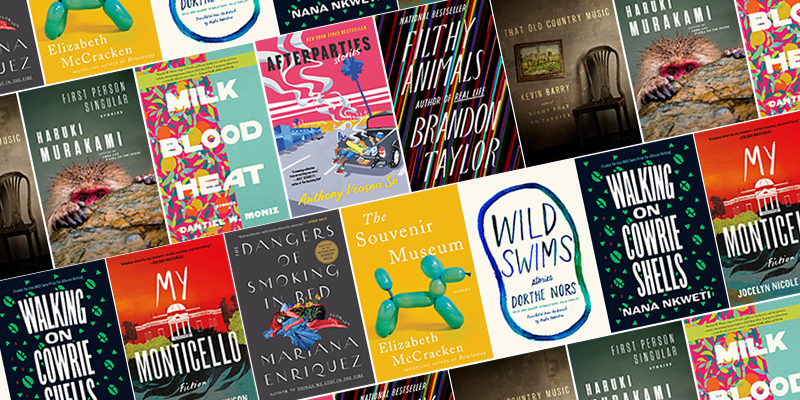
The Best Reviewed Short Story Collections of 2021
Featuring haruki murakami, brandon taylor, elizabeth mccracken, kevin barry, lily king, and more.

Well, friends, another grim and grueling plague year is drawing to a close, and that can mean only one thing: it’s time to put on our Book Marks stats hats and tabulate the best reviewed books of the past twelve months.
Yes, using reviews drawn from more than 150 publications, over the next two weeks we’ll be revealing the most critically-acclaimed books of 2021, in the categories of (deep breath): Memoir and Biography ; Sci-Fi, Fantasy, and Horror ; Short Story Collections; Essay Collections; Poetry; Mystery and Crime; Graphic Literature; Literature in Translation; General Fiction; and General Nonfiction.
Today’s installment: Short Story Collections .
Brought to you by Book Marks , Lit Hub’s “Rotten Tomatoes for books.”
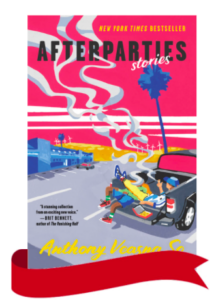
1. Afterparties by Anthony Veasna So (Ecco)
22 Rave • 5 Positive • 1 Mixed
“The presence of the author is so vivid in Afterparties , Anthony Veasna So’s collection of stories, he seems to be at your elbow as you read … The personality that animates Afterparties is unmistakably youthful, and the stories themselves are mainly built around conditions of youth—vexed and tender relationships with parents, awkward romances, nebulous worries about the future. But from his vantage on the evanescent bridge to maturity, So is puzzling out some big questions, ones that might be exigent from different vantages at any age. The stories are great fun to read—brimming over with life and energy and comic insight and deep feeling.”
–Deborah Eisenberg ( New York Review of Books )
2. Filthy Animals by Brandon Taylor (Riverhead)
19 Rave • 7 Positive • 2 Mixed Read an interview with Brandon Taylor here
“Taylor plays the Lionel-Charles-Sophie storyline for all its awkwardness and resentment, but it can feel like a note held too long to suspend commitment, which is the resolution we’re trained to expect … The violence is neither glamorous nor gratuitous; it is senseless without being pointless. In contrast, Taylor presents such earnest moments of vulnerability in Anne of Cleves that my breath hitched … Some writers have the gift of perfect pitch when writing dialogue; Taylor’s gift is perfect tempo. In a band of writers, he’d be the drummer who sticks to a steady moderato. He neither rushes a story to its high notes nor drags the pace so that we can admire his voice. And as a plotter, he doesn’t rely on gasp-inducing reveals … Taylor’s superpower is compressing a lifetime of backstory into a paragraph – sometimes just a sentence … I’ve come to expect, in fiction, the story of the Sad Gay Youth who is rejected by his often religious family and thereafter becomes self-destructive or reckless. And while Taylor refracts versions of this story throughout the collection, he does so without overly romanticising it … He is a writer of enormous subtlety and of composure beyond his years.”
–Ian Williams ( The Guardian )

3. First Person Singular by Haruki Murakami (Knopf)
13 Rave • 17 Positive • 7 Mixed • 5 Pan
“… a blazing and brilliant return to form … a taut and tight, suspenseful and spellbinding, witty and wonderful group of eight stories … there isn’t a weak one in the bunch. The stories echo with Murakami’s preoccupations. Nostalgia and longing for the charged, evocative moments of young adulthood. Memory’s power and fragility; how identity forms from random decisions, ‘minor incidents,’ and chance encounters; the at once intransigent and fragile nature of the ‘self.’ Guilt, shame, and regret for mistakes made and people damaged by foolish or heartless choices. The power and potency of young love and the residual weight of fleeting erotic entanglements. Music’s power to make indelible impressions, elicit buried memories, connect otherwise very different people, and capture what words cannot. The themes become a kind of meter against which all the stories make their particular, chiming rhythms … The reading experience is unsettled by a pervasive blurring of the lines between fantasy and reality, dream and waking … Most of the narrators foreground the act of telling and ruminate on the intention behind and effects of disclosing secrets, putting inchoate impulses, fears, or yearnings into clear, logical prose … This mesmerizing collection would make a superb introduction to Murakami for anyone who hasn’t yet fallen under his spell; his legion of devoted fans will gobble it up and beg for more.”
–Pricilla Gilman ( The Boston Globe )
4. That Old Country Music by Kevin Barry (Doubleday)
13 Rave • 10 Positive •1 Mixed
“There’s not a bad story in the bunch, and it’s as accomplished a book as Barry has ever written … Barry does an excellent job probing the psyche of his diffident protagonist, and ends the story with an unexpected moment of sweetness that’s anything but cloying—realism doesn’t need to be miserablism, he seems to hint; sometimes things actually do work out … Barry has a rare gift for crafting characters the reader cares about despite their flaws; in just 13 pages, he manages to make Hannah and Setanta come to life through sharp dialogue and keen observations … Barry proves to be a master of writing about both love and cruelty … Barry brilliantly evokes both the good and bad sides of love, and does so with stunningly gorgeous writing … There’s not an aspect of writing that Barry doesn’t excel at. His dialogue rings true, and he’s amazingly gifted at scene-setting—he evokes both the landscape of western Ireland and the landscape of the human heart beautifully. His greatest accomplishment, perhaps, is his understanding of the ways our collective psyche works; he seems to have an innate sense of why people behave the way we do, and exactly what we’re capable of, both good and bad.”
–Michael Schaub ( NPR )
5. Milk Blood Heat by Dantiel W. Moniz (Grove)
17 Rave • 1 Positive Listen to an interview with Dantiel W. Moniz here
“Mortality is the undercurrent in Dantiel W. Moniz’s electrifying debut story collection, Milk Blood Heat , but where there’s death there is the whir of life, too. A lot of collections consist of some duds, yet every single page in this book is a shimmering seashell that contains the sound of multiple oceans. Reading one of Moniz’s stories is like holding your breath underwater while letting the salt sting your fresh wounds. It’s exhilarating and shocking and even healing. The power in these stories rests in their veracity, vitality and vulnerability.”
–Michelle Filgate ( The Washington Post )
6. The Dangers of Smoking in Bed by Mariana Enriquez (Hogarth)
15 Rave 2 Positive Read a story from The Dangers of Smoking in Bed here
“There’s something thrilling about other people’s suffering—at least within this collection’s 12 stories of death, sex and the occult. Horrors are relayed in a stylish deadpan … Enriquez’s plots deteriorate with satisfying celerity … Largely it’s insatiable women, raggedy slum dwellers and dead children—those who are ordinarily powerless—who wield unholy power in this collection, and they seem uninterested in being reasonable. And Enriquez is particularly adept at capturing the single-minded intensity of teenage girls … If some of these stories end vaguely, the best ones close on the verge of some transgressive climax … To Enriquez, there’s pleasure in the perverse.”
–Chelsea Leu ( The New York Times Book Review )
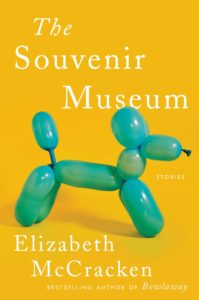
7. The Souvenir Museum by Elizabeth McCracken (Ecco)
13 Rave • 2 Positive • 1 Mixed Read Elizabeth McCracken on savoring the mystery of stories here
“Elizabeth McCracken’s The Souvenir Museum begins with one of the funniest short stories I’ve read in a long time … I had to stop reading ‘The Irish Wedding’ several times to explain to my husband why I was laughing so hard. I kept thinking: I wish I were reading a whole book about these people … they’re all beguiling … This tale, like much of McCracken’s work, captures the mixed bag that characterizes most people’s lives … McCracken’s writing is never dull. She ends this fantastic collection with a second English wedding and its aftermath, nearly 20 years after the first, delivering happiness tempered by sobering circumstances—and a satisfying symmetry.”
–Heller McAlpin ( NPR )
8. Wild Swims by Dorthe Nors (Graywolf)
13 Rave • 1 Positive Read an excerpt from Wild Swims here
“How slippery the work of the Danish writer Dorthe Nors is, how it sideswipes and gleams … The stories are vivid the way a flash of immobilizing pain is vivid … Perhaps because they’re so very short and because they mostly sketch slight interior shifts in her characters, Nors’s stories all feel a little bashful, a little tender. Surely this is intentional … Most of her stories are too short to linger deeply in time or consciousness; the characters spin back into their silence almost as soon as they emerge on the page. Nors is a master at portraying female rage, but here there is also no violent explosion outward, instead a sort of inner collapse; her characters assiduously resist confronting their fury until it rises up against them and attacks their bodies … The sense of simultaneous, furious upwelling into text and retraction into shame or reticence gives the stories a powerful undercurrent, as if they were constantly wrestling with themselves. Inherently self-contradicting, they wobble interestingly on their axes, pulled between outraged individualism and the restrictive Janteloven.”
–Lauren Groff ( The New York Review of Books )
9. Walking on Cowrie Shells by Nana Nkweti (Graywolf)
12 Rave • 1 Mixed Read an interview with Nana Nkweti here
“The pure energy of the words strikes first, the thrumming, soaring, frenetic pace of Nana Nkweti’s expression … None of these stories end with a miraculous healing. Even where revelations occur, they never erase scars. Nkweti uses genre tropes to subvert our expectations. She employs the zombie story, the fairy tale, and the confessional in order to invert conventions … The levity of Nkweti’s writing can make even passing descriptions a delight … Occasionally the writing veers into the overwrought … But the sheer speed of Nkweti’s expression allows for correction in midair, and her keen descriptive eye provides more pleasures than missteps … Her inventiveness dazzles.”
–Lee Thomas ( Los Angeles Review of Books )
10. My Monticello by Jocelyn Nicole Johnson (Henry Holt)
9 Rave • 4 Positive 1 Mixed Read Jocelyn Nicole Johnson on how writing “vengeful fiction” can make you a better person, here
“Jocelyn Nicole Johnson uses history to spectacular effect in her debut fiction collection … What makes My Monticello particularly resonant is that it does not stray far from life as we know it today. In the near future conjured by Johnson, there are the heat waves and wildfires that bring climate change into view. There is fallout from a fraught election. There is the vile replacement theory rhetoric of the right wing. But the lives of Johnson’s richly drawn characters—their personal stories—are always in focus. And, because of it, the storytelling is propulsive, as we follow these refugees along a harrowing journey, with danger ever at their heels. My Monticello is, quite simply, an extraordinary debut from a gifted writer with an unflinching view of history and what may come of it.”
–Anissa Gray ( The Washington Post )
Our System:
RAVE = 5 points • POSITIVE = 3 points • MIXED = 1 point • PAN = -5 points
- Share on Facebook (Opens in new window)
- Click to share on Twitter (Opens in new window)
- Click to share on Google+ (Opens in new window)
- Click to share on LinkedIn (Opens in new window)
- Click to share on Reddit (Opens in new window)
- Click to share on Tumblr (Opens in new window)
- Click to share on Pinterest (Opens in new window)
- Click to share on Pocket (Opens in new window)

Previous Article
Next article, support lit hub..

Join our community of readers.
to the Lithub Daily
Popular posts.

Follow us on Twitter

On the Fleeting Wonder of Youth and the Surreal Permanence of Motherhood
- RSS - Posts
Literary Hub
Created by Grove Atlantic and Electric Literature
Sign Up For Our Newsletters
How to Pitch Lit Hub
Advertisers: Contact Us
Privacy Policy
Support Lit Hub - Become A Member
Become a Lit Hub Supporting Member : Because Books Matter
For the past decade, Literary Hub has brought you the best of the book world for free—no paywall. But our future relies on you. In return for a donation, you’ll get an ad-free reading experience , exclusive editors’ picks, book giveaways, and our coveted Joan Didion Lit Hub tote bag . Most importantly, you’ll keep independent book coverage alive and thriving on the internet.

Become a member for as low as $5/month

8 Standout Short Stories With Moral Lessons
Nov 22, 2023
Sometimes, I want a short story to simply be a moment of escape. I don’t want to experience an important life lesson; I just want to be entertained like in Shirley Jackson’s “The Lottery” or Edgar Allan Poe’s “The Tell-Tale Heart.” Other times, however, I want to soak in short stories with moral ideals!
A moral, or theme, teaches us something about ourselves and others. We get to learn and grow in some tangible way, and stories that provide this offering are necessary in the literary canon.
Keep reading below for 8 Standout Short Stories With Moral Lessons that you can use in ANY secondary classroom!
Need help with Reading Test Prep? Check out this FREE Pack of 3 Test Prep Activities to help students achieve success on standardized tests!

Table of Contents
A moral, for all intended purposes, is another word for THEME. A theme is the message of a text. Because it is a message, it MUST be written in a complete sentence and contain a connection to a topic or idea from the text. A simple phrase is not quite enough for a thematic statement .
Developing themes for short stories with moral lessons would be a fantastic focus while reading any of the texts below!
1. “To Build a Fire” by Jack London
I love “To Build a Fire” so much! It mirrors my own life in so many ways, which is why it is one of my favorite short stories with moral lessons!
The protagonist, a man with an overabundance of pride and confidence, ultimately fails in an extreme fight for survival. Like me, he believes he can defy the odds and escape an impossible situation.
Teaching this story with passages from The Call of the Wild or White Fang might help in rounding out similar ideas regarding the conflict of Man vs. Nature !
Click below for easy-to-teach activities for To Build a Fire by Jack London!

2. “The Cactus” by O. Henry
One of my favorite things about this short story by O. Henry is its clever twist ending! Many short stories with moral lessons have similar twist endings, which could be why they make such great additions to thematic units !
O. Henry’s “The Cactus” tells the story of a budding romance. A young man tries to charm a young woman, but his boastful nature leads to an unfortunate misunderstanding.
Personally, I think we have all been there, at least when it comes to boastfulness. We all have something we get a little prideful about, to our own detriment most of the time.
You could teach a simple plot activity or examine how the characters change and/or develop over the course of the story!
Click to get teaching ideas here>>> The Cactus Lesson BUNDLE

3. “After Twenty Years” by O. Henry
Loyalty is a concept students are extremely focused on in middle and high school, so including short stories with moral ideas connected to loyalty is a great way to encourage students to engage with certain texts! How can a student even navigate the school hallways without friends to help along the way? Loyalty is vital!
But all friendships change over time as any adult knows. The main characters, an officer and a criminal, experience this situation in the story “After Twenty Years” by O. Henry !
Breaking down this easy-to-read plot through a focus on comparing and contrasting the two main characters will help your students get to the moral (theme) of the story quite easily, as you really feel for both characters (even the criminal one).
Click to buy this BUNDLE to make teaching this short story SIMPLE & EASY!
4. “The Pedestrian” by Ray Bradbury
The story “The Pedestrian,” like its title, is incredibly unassuming. A man in a not-far-off future walks his neighborhood alone. Unlike others who sit in front of screens day and night, the protagonist chooses to go for a stroll, a seemingly innocuous activity.
While on his walk, he encounters an unmanned, robotic police vehicle. Because of its programming, it cannot understand Leonard’s (protagonist’s) intentions and labels him mentally incapable, carting him off to an asylum.
This dark tale teaches about the dangers of reliance on and addiction to technology, a moral we can all learn from! If you need help teaching characterization and theme for “The Pedestrian,” go here !
Need some ideas for teaching scary short stories? Click below!

5. “The Gift of the Magi” by O. Henry
If you are anywhere near the holiday season, “The Gift of the Magi” by O. Henry is one of the best short stories with moral attributes woven throughout!
This short story depicts a couple lamenting their slightly impoverished state. They want to give each other gifts to celebrate the Christmas season; however, they have limited means, like most people in the world today.
Instead of sitting around moping, they both choose to sacrifice the little they have in an interesting way in order to surprise the other for Christmas. The moral, or theme, involving sacrifice will encourage anyone who reads this short story to think beyond oneself during the holiday season.
Want an easy way to teach characterization, reading comprehension, and visualization for The Gift of the Magi ? Click the image below!

6. “The Scarlet Ibis” by James Hurst
I don’t know about you, but if you have read “The Scarlet Ibis” by James Hurst , I know you MUST have shed a tear or two. Good short stories with moral elements tend to do so unexpectedly.
Two brothers, one of whom experiences a disability, interact with each other as many siblings do. There is a constant tug of war between brotherly love and annoyance that most people with brothers or sisters can readily understand.
By the end of the story, we cry with the protagonist as he weeps for his brother who dies a tragic death. This story may be difficult to read for some, but it is completely worth it.
We need to be reminded once in a while that life is not just about us and what makes us happy. It also involves investing in the lives of others, especially in the lives of those less fortunate than we are. Ultimately, patience regarding family must take center place in our lives, which the protagonist learns too late. If you need step-by-step activities to teach this classic story, see this link !
7. “The Necklace” by Guy de Maupassant
I have yet to teach a student who did not like “The Necklace” by Guy de Maupassant . And engagement is super important when choosing short stories with moral concepts!
Unlike the female protagonist in “The Gift of the Magi,” Mathilde Loisel in the story “The Necklace” is self-focused. She cannot see the beauty of the comfort and security of her middle-class life.
Instead, she always thinks about the finer things in life she cannot attain. I think we have all been there a time or two. We may not envision the same “finer” things, but we all pretty much want more than we currently have.
When Mathilde Loisel is invited to a party, she borrows her friend’s necklace, a symbol to her of wealth. At some point, she loses the “expensive” diamond necklace and replaces it without telling her friend about its loss. Now, deep in debt, she and her husband become embittered and worn down through extremely difficult physical work. The resolution of the story involves the revelation that the necklace was, in fact, a cheap fake.
Can you imagine the impact of this knowledge on your psyche? Sometimes, it is simply better to tell the truth, even if it hurts your pride to do so. Clearly, this story shines as a prime example of classic short stories with moral concepts everyone should read!

8. “Thank You, Ma’am” (also known as “Thank You, M’am”) by Langston Hughes
During or around the week of Thanksgiving, “Thank You, Ma’am” (also known as “Thank You, M’am”) by Langston Hughes is one of THE BEST short stories with moral lessons to teach!
Let me give you a quick recap: A young boy attempts to steal a person from an older woman. Interestingly, she does not call the police and demand immediate punishment but invites the young man into her home, feeds him, and demonstrates love and care towards him.
Everyone could learn a thing or two from the older woman, Mrs. Jones.
Here are some thematic statements/morals one could learn from this story:
- Sometimes it is difficult to fathom someone’s kindness.
- Certain moments in life can change how you see someone.

Why teach short stories with moral lessons?
So often, our English curricula are rife with death, destruction, and despair. Think Romeo and Juliet, “The Raven,” or “An Occurrence at Owl Creek Bridge.” Don’t get me wrong; I love a good scare or death scene.
Sometimes, however, I want to feel hope in the human experience. We need to read about life, love, freedom, and other ideals that are important to us. Foremost, we must offer more short stories with moral lessons to our students, so they too can experience what can be!
If you want to make teaching short stories with moral lessons or other entertaining tales an EASY feat, get the BUNDLE below!

Need more help with teaching short stories with moral lessons? Check out my store Kristin Menke-Integrated ELA Test Prep !

Hi, I’m KRISTIN!
I primarily focus on integrating multiple disciplines and subjects. The goal is to make teaching simplified and effective!
Let's Connect
- Follow Follow
Click below to download “13 Simple Strategies to make test prep a breeze!”

30+ Best short stories in English with moral (Valuable lessons for kids)

Looking for short stories in English with moral ? Check out this list of must-read short stories for children with unique moral lessons.
These very short stories with morals in English language teach children about morality and ethics. They also help them develop their critical thinking skills .
These are short learning stories that you can read at bedtime. You will not be disappointed by these classic short moral stories in English and they work like a charm for kids of any age .
✅>>>>Also, if you are tired of bedtime story struggles and want to instill moral values effortlessly, then get this bestselling stories . I personally have found it useful. <<<<

The Gita: For Children + The Vedas and Upanishads for Children (Set...
- The Gita: For Children + The Vedas and Upanishads for Children (Set of 2 books)
Also Read – 10 Lines short stories with Morals
In this page very short stories in English with morals are available both as pictures and in pdf. Just download and read.
Also Read – 50+ short folktale stories with moral lesson
- How Speech Therapy Games Can Help Your Child Thrive
- 10 Tenali Raman Stories
- Best Bible Stories for Kids
Short story for teenager with moral lesson
A collection of very short moral stories in english for students – see what is inside video.
Click here to Download Moral stories for kids PDF (Absolutely FREE for a limited time)
Click on below pic to download and read these short stories with morals for kids and learn from them

I can never imagine my childhood without stories. It was fascinating. But kids today are lost in a digital world. While we grew up listening to stories or reading good stories books, our kids are hooked on their screens watching cartoons or playing games on their mobiles.
✅ Here is our latest article on>>> How To Inculcate Moral Values in Children. <<<
As if it weren’t enough, the pandemic hit hard their childhood and made them homebound. Even schools are teaching online. Reading books is fast becoming an alien concept to kids.
But all hope is not lost. Kids have an inherent liking for fantasy and wonderland. They respond well to stories told to them. We as parents should read them stories from a very tender age- a habit they will carry forward into their lives ahead.
Also Read – 20+ Easy & Enchanting Sanskrit Slokas For Kids: Unlock the Wisdom of Ancient India
Classic Moral stories in English
Classic moral stories in English are a great way to teach children about important life lessons. There are many stories moral in English that have been passed down through the generations, and they continue to be popular today. stories morals in English can teach children about right and wrong, responsibility, honesty, and other important life lessons. In addition, short moral stories in English are often entertaining and can help children to develop a love for reading.
Check – 13+ Inspiring Indian Mythological Stories for Kids with Morals
There are many must read moral stories in English for kids to choose from, so finding the right one for your child can be a challenge. However, there are some tips that can help you choose the best short stories with moral lessons for kids in English for your child.
First, consider your child’s age and interests. moral stories for kids that are too difficult or too simple will likely not hold your child’s attention. Second, look for stories that teach important life lessons. Third, choose stories that are entertaining and will help your child to develop a love for reading.
Also Read – How To Teach Moral Values To Kids
5 lines story with moral for nursery class
1. Once upon a time, there was a little girl who was very naughty.
2. She always made trouble for others and never listened to her elders.
3. One day, she ran away from home and got lost in the forest.
4. A kind old lady found her and helped her find her way back home.
5. The little girl learned her lesson and was never naughty again.
Moral of the story: It is always better to be good and obey your elders. Otherwise, you may end up in big trouble.
4 line stories in English ( moral value story in English )
1. Once upon a time, there was a beautiful princess who lived in a castle with her loving parents.
2.One day, a wicked witch cast a spell on the princess, turning her into a frog.
3.The only way to break the spell was for a prince to kiss her.
4.Fortunately, a brave prince came along and broke the spell, and they lived happily ever after.
Another story about an ugly duckling
1.Once upon a time, there was an ugly duckling who was rejected by everyone.
2.But one day, he met a kindhearted woman who accepted him for who he was.
3.And she helped him to see that he was really a beautiful swan.
4.They lived happily ever after.
3 line stories in English
Here is another very short story about a poor boy
1.Once upon a time, there was a poor boy who had to work hard every day just to survive.
2.But one day, he met a wealthy man who took him under his wing and taught him the ways of business.
3.The boy became a successful businessman himself, and he never forgot the man who had helped him.
1.Once upon a time, there was a girl who dreamed of becoming a singer.
2.But her parents told her that it was impossible, and she should just be content with her life.
3.However, the girl never gave up on her dream, and she eventually became a famous singer.

Moral Stories from Panchatantra (Pack of 10 Books) | Bedtime story books...
- Moral Stories from Panchatantra, Bedtime short stories
- Story books for kids,library collection
- Written in easy language,vibrant illustrations
- Perfect for 3 years up till 8 years
- Made in India
- Ideal-size for little Kids
- English story book

10 lines short stories with moral
1. Aesop’s fables are a great example of 10 lines short stories with moral for kids. They teach valuable lessons about life and how to live it in a simple, yet effective way.
2. Another 10 lines short story with moral for kids is “The Ant and the Grasshopper”. This story teaches kids the importance of hard work and how it pays off in the end.
3. “The Boy Who Cried Wolf” is yet another 10 lines short story with moral for kids that teaches an important lesson.

The Illustrated Stories of Akbar and Birbal: Classic Tales From India

The Ant and the Grasshopper story in English in 10 lines ( best English story with moral )
The Ant worked hard all summer long, gathering food for the winter. The Grasshopper laughed and played, doing nothing to prepare for the cold months ahead.
When winter came, the Grasshopper had nothing to eat while the Ant was well-prepared with a cozy home and plenty of food. The Grasshopper begged the Ant for help, but the Ant refused, saying, “You should have worked hard like me when there was food to be had.”
The Grasshopper eventually starved to death, learning too late the importance of hard work and preparation.
Short puppet story with moral lesson
The three little pigs went out into the world to seek their fortunes. The first little pig built himself a straw house, and the second little pig built himself a stick house. But the third little pig built himself a brick house, and it was this house that withstood the big bad wolf’s huffing and puffing.
The moral of this story is that it pays to be prepared. The third little pig had taken the time to build a strong house, and as a result, he was able to withstand the wolf’s attacks. If the other pigs had been as prepared as the third little pig, they would have been able to avoid becoming the wolf’s dinner.
What is puppet story?
A puppet story is a short story that uses puppets as the main characters. Puppet stories are often used to teach children moral lessons or to entertain them. Many popular children’s stories, such as The Three Little Pigs and Pinocchio, began as puppet stories.
Also Read – 10+ Best Moral Stories for Puppet Show
The Boy Who Cried Wolf story in English 10 lines ( 10 lines moral stories )
1. There was a boy who lived in a village near a forest.
2. The boy used to tend to the sheep in the village.
3. One day, the boy saw a wolf in the forest and cried out, “Wolf! Wolf!”
4. The villagers came running, but when they got there, they saw that there was no wolf.
5. The boy laughed and the villagers went back to their homes.
6. The next day, the boy saw the wolf again and cried out, “Wolf! Wolf!”
7. The villagers came running, but when they got there, they saw that there was no wolf.
8. The boy laughed and the villagers went back to their homes.
9. The third day, the boy saw the wolf again and cried out, “Wolf! Wolf!”
10. This time, when the villagers came, they saw that there was a wolf. The boy had lied so many times that they didn’t believe him and the wolf ate the boy.
The moral of the story is that you should never lie, because if you do, people won’t believe you even when you’re telling the truth.
Collection of moral stories in English small
If want to get some good books on moral stories for kids online, check out below:
- 108 Moral Stories (Illustrated) for Children
- 199 Moral Stories – Self Teaching Moral Stories for 3 to 6 Year Old Kids
- Panchatantra Moral Stories (Illustrated) (Set of 10 Books) – Story Books for Kids
- Moral Stories from Aesop Fables (Hindi) Set of 20 books for kids
Benefits of Short Moral stories for kids (in English)
- Narrating stories build strong interpersonal bonds and keep them away from the screen too.
- They boost the child’s fantasy and creativity.
- Stories increase their concentration power.
- The child’s vocabulary is enhanced.
- Kids get exposed to a wider world- a real and practical one.
- Kids learn to be patient while listening to stories.
- Stories are a great way to teach them valuable lessons for their lives ahead.
Check out these 30+ (5 to 10 lines) very short stories in English with moral values
As moms navigating the ever-evolving landscape of parenting, we’re always on the lookout for the perfect stories that strike the balance between entertainment and valuable life lessons. The challenge of finding the best short stories in English with morals can be overwhelming, especially when we desire narratives that leave a lasting impact on our children’s character. Well, fellow moms, I’m here to ease that journey for you.
Join me in discovering a curated collection of the Best Short Stories in English with Moral – each tale carefully chosen to not just engage but to impart invaluable lessons that our little ones will carry into the future.
Let’s turn storytelling into a transformative experience for both us and our children. Ready to dive into a world of captivating narratives and meaningful insights?
Let the storytelling adventure commence!
- The Bird-catcher And The Pigeons – Unity is strength pigeon story with pictures (a small story in English with moral)
The Eagle And The Woodcutter
The foolish lion and the clever rabbit short story pdf, the loyal mongoose, the mice that ate iron, the lion and the mouse, fox and crane story in english pdf, the fox and the grapes short story with moral, the axe and the woodcutter, the greedy lion, the brahmin and the cheats, the greedy hunter and the rabbit, the ant and the elephant, the monkey and the crocodile, short story monkey and cap seller story with pictures pdf, the hare and the tortoise, the daydreamer milkman, the cats and the monkey, greedy dog story in english pdf, the golden geese, a farmer and his four sons, bellingâ the cat, the boy who cried wolf, the fox and the crow, the pigeon and the ant, three fishes, the talkative tortoise, akbar and birbal, midas and his golden touch, the farmer and the well story in english pdf, a short moral story in english with moral for kids, time is valuable story, liked this list of short english moral stories for kids, the bird-catcher and the pigeons – u nity is strength pigeon story with pictures ( a small story in english with moral ).
Once a flock of pigeons was caught in a bird catcher’s net. They tried to free themselves but couldn’t. So, they all panicked. There was an old pigeon. He calmed them down and said,†We should not panic if we want to escape from here.
The birds calmed down and listened to him. The old pigeon asked them to follow his instructions and said,†We will fly together at the count of three and take this net with us. Just remember to fly together.â€
The bird-catcher was coming to take the birds away when the unexpected happened. The birds flapped their wings together and flew away with the net! The bird-catcher could not do anything. He was shocked to see such wisdom and unity in birds.
Moral : You can achieve anything with unity. We should be calm in difficult situations to overcome them.

Set of 20 Classic Tales & Favourite Story Books | English Short...

Check out this awesome bookset Moral Story Books for Kids (Pack of 10 Books) – This set has books with all time favourite stories for kids.
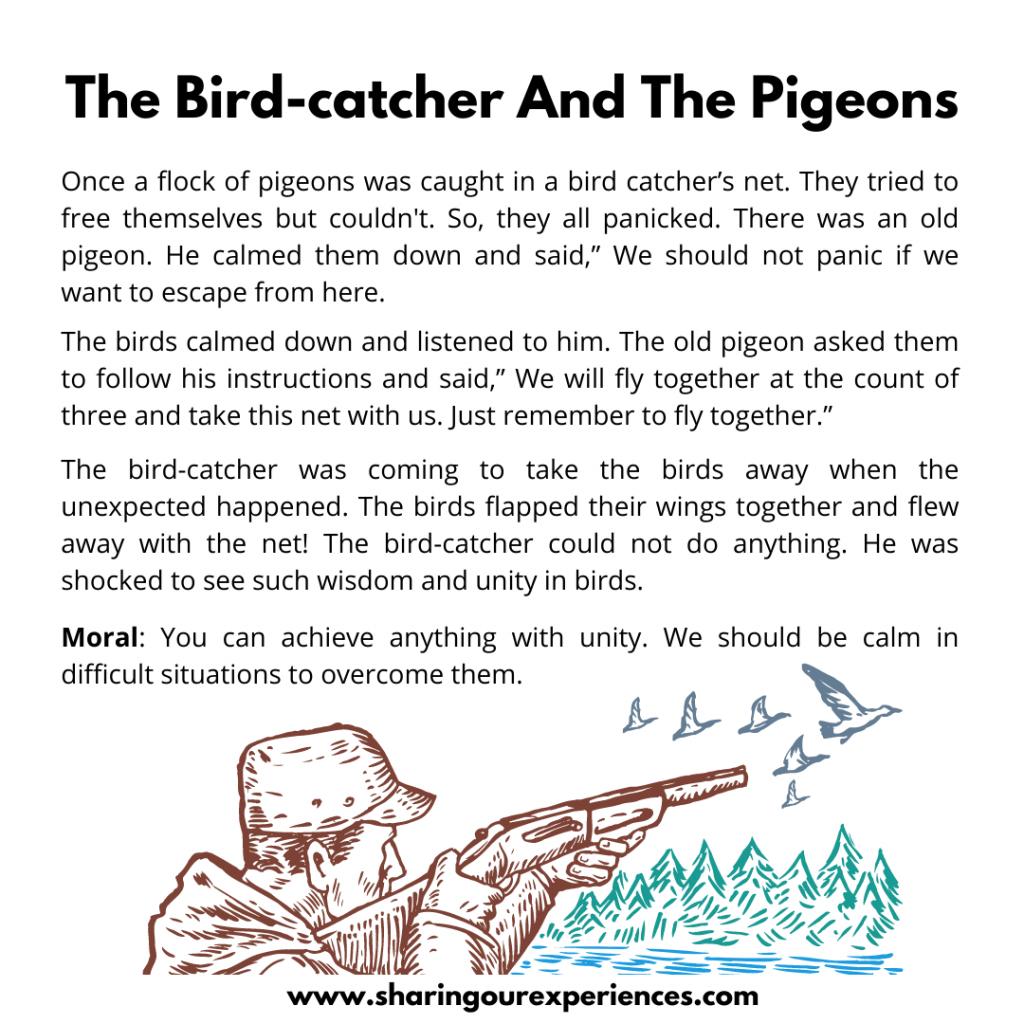
There lived a kind woodcutter in a village. He once freed an eagle from a trap. One day he went to the hills to cut trees for wood. The hill was steep, so the woodcutter could not come down and needed help.
Upset, he sat down on the rock and waited for some help. Suddenly, an eagle flew down close to him and took away his hat. The woodcutter was angry and he started chasing the bird. After some time, he realized he has found the way down the hill.
It then occurred to him that the bird was the same eagle he had once rescued. He now understood why the eagle flew away with his hat. He thanked the eagle for its brilliant idea and said,†You took away my hat so that I can follow you and reach here. You are my true friend. Thank you!”
Moral: Kindness is always rewarded. We should always help others selflessly.
Also Read – Raising Kind Kids: Expert Tips for Developing Empathy in Children
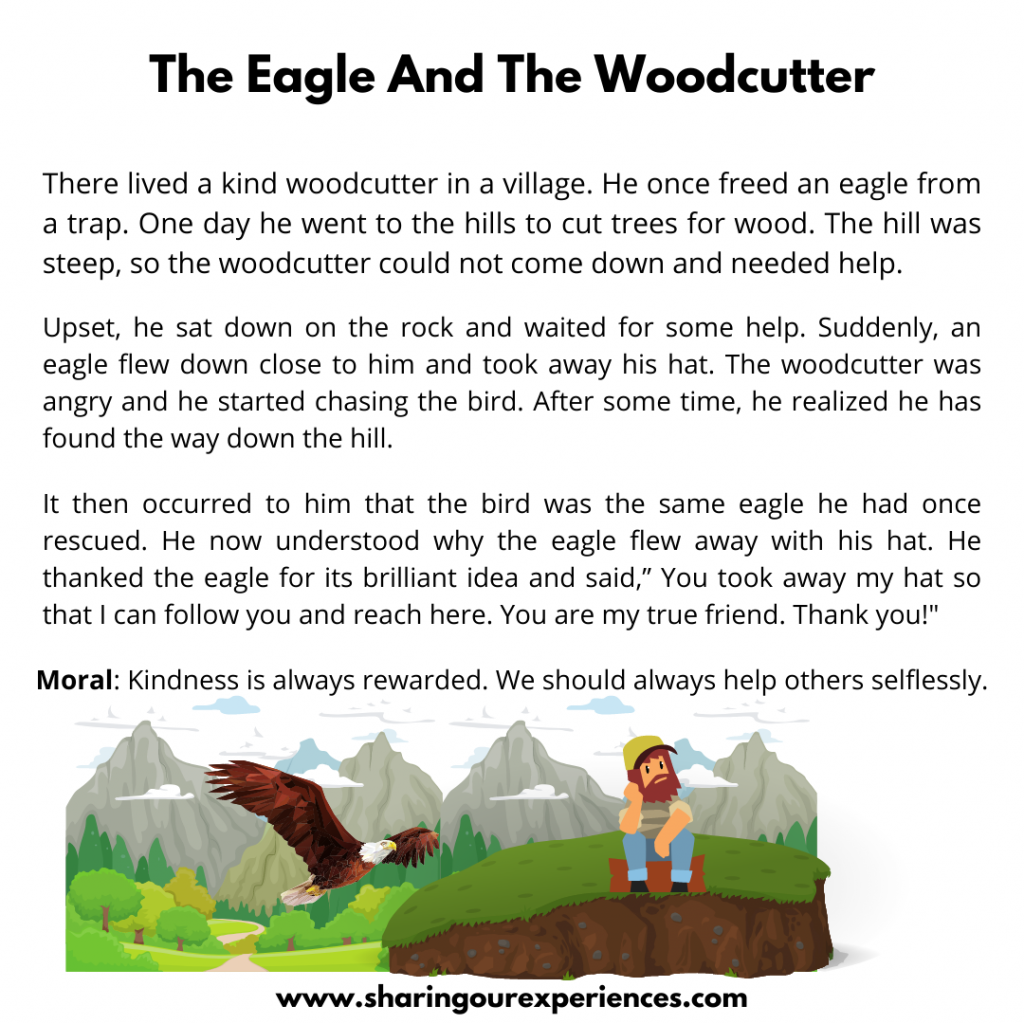
Also, Read – 30 Fun and Easy Random Acts of Kindness Ideas for Kids – Spread Love and Positivity!
Once, there lived a lion in a jungle. He was very cruel and greedy. He used to hunt and kill other animals even when wasn’t hungry. All the animals were afraid of him.
One day, they gathered together and went to the lion. They said,†Oh king of the jungle, if you hunt at this rate, we all will be killed soon, and you will soon run out of food. Every day, we will send you one animal for food. This way you will have easy food and we will get a chance to survive.
The lion agreed and from that day on he would get an animal as his meal at his home. This continued for several days.
One day, it was the turn of a young hare. He was clever and did not want to be eaten away by the cruel lion. He thought of a plan to get rid of the lion altogether.
The next day he got up late and walked very slowly toward the lion’s den. He even slept on the way. Finally, he reached the lion after sunset. Seeing the hare, the lion roared fiercely as he was very hungry.
The small rabbit was a little food for him. But the rabbit did not get scared. Instead, he told the lion -†Oh mighty king! I was stopped by another lion. He said that he was the new king of the jungle. He even took the other two hares that the animals had sent with me. He wanted to eat me too, but somehow I escaped and came to you.â€
Hearing this the hungry lion got angrier and told the hare to take him to this new lion so that he could kill him. The hare readily agreed and led him to a well and said, “ See, he is here, growling and staring at me.â€
The lion looked into the well. He saw his own reflection growling back. Furious, he jumped into the well and died. The clever hare rejoiced and ran away to share this news with the other animals.
Moral: We should keep calm in times of crisis. We should not believe whatever we hear.
Also Read – How To Help Your Child Cope With Anger And Calm Down
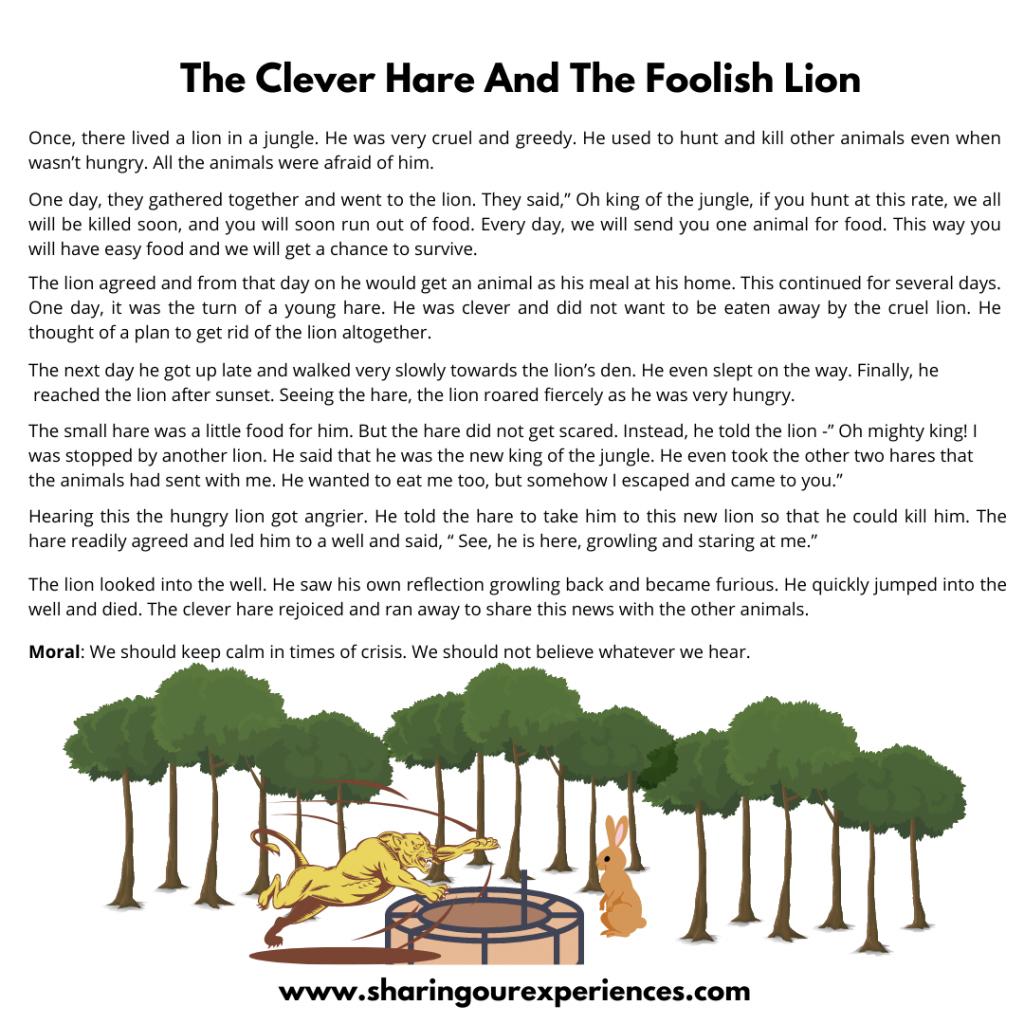
✅ We don’t want you to miss our Trending Article >>> Krishna Shloka for Children <<< Perfect and Easy shlokas with meaning.
If you want to teach shlokas to your child, you will absolutely love this recommendation from us- My First Shloka Book – This book has activities too and is favouite among many kids I know. Makes for a great gift.
Once there lived a farmer with his wife. They had an infant baby. One day, the farmer found an injured mongoose while returning home from the fields.
He told his wife that he would nurse the mongoose to health and keep it as a pet. The wife didn’t like the idea but agreed reluctantly. The mongoose recovered soon and played around in the house. The wife kept it away from her infant son.
One day, the wife left the sleeping baby with her husband and went out to fetch some groceries. She told him to keep the mongoose away from the child. Meanwhile, the farmer got an urgent call from the field and he left the son with the mongoose. He trusted the mongoose and was sure that his child was safe with him.
After some time, the farmer’s wife returned with a big grocery basket. She saw the mongoose standing outside the gate with blood on his mouth and paw. Without a second thought, she yelled and smashed the poor animal with the basket full of groceries. She ran inside crying and wailing but was shocked to see her son sleeping peacefully near a dead snake.
Now, the reality dawned upon her. She understood that a snake must have come to bite her son, but the mongoose killed the snake to save the baby. The bloodstain was that of the snake’s. She rushed out to check on the mongoose. The poor loyal mongoose was dead.
Moral: We should not jump to conclusions. We should not take decisions in a hurry.
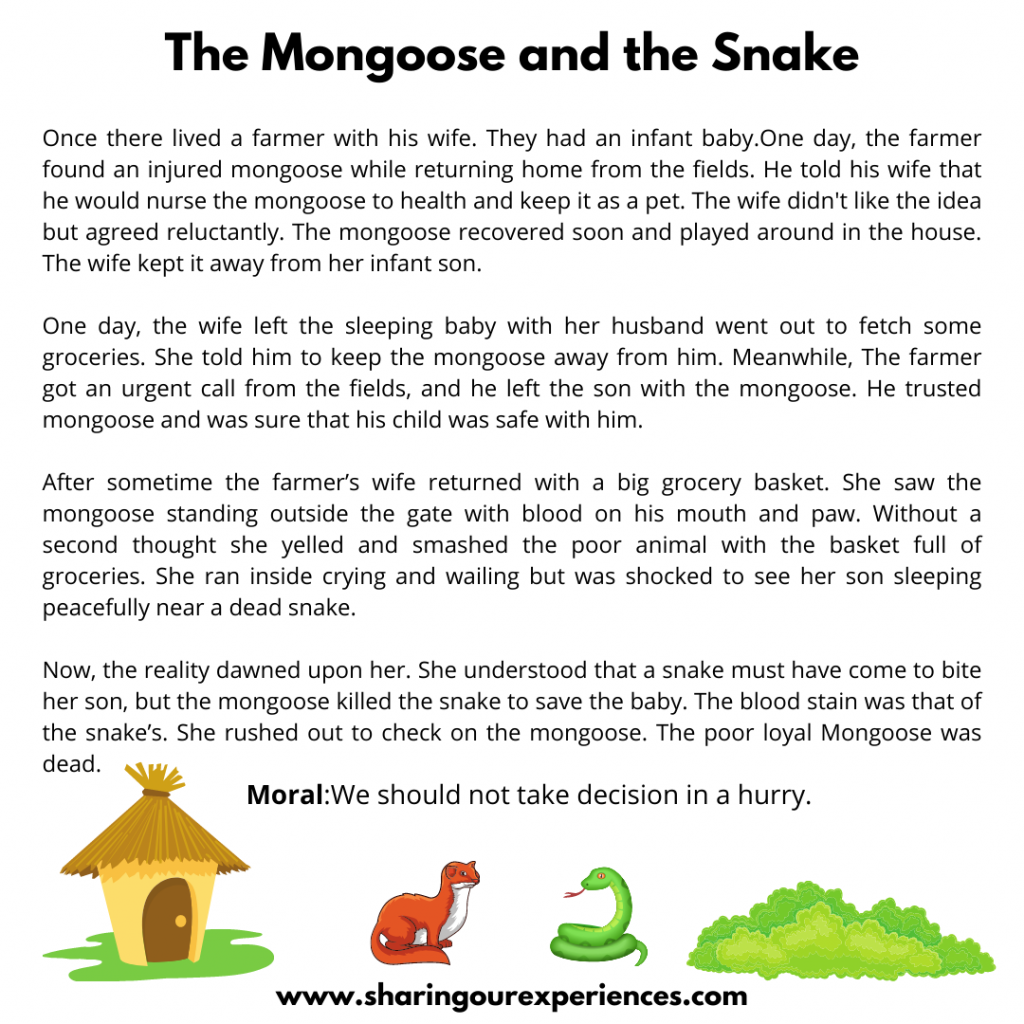
Mohan and Sohan were good friends and lived in a city. One day, Mohan decided to visit his family in the village and left a heavy iron chest with Sohan. He said,†Sohan, I would return in a couple of months. Till then take care of my belongings.â€
The next day, Mohan went away to his village. Three months later, he returned to the city and went straight to meet Sohan. Sohan welcomed him and served him food. While leaving he told Sohan that he wants to take his iron chest with him. Sohan was greedy, he didn’t want to return the chest to Mohan. The iron box would fetch him good money if he were to sell it in the market.
He said to Mohan that his house has many mice, and they ate away his iron chest and said,†I am sorry my friend.†Mohan immediately understood the dishonest intentions of Sohan. He asked his friend not to be sorry as it was not his fault. And went away. Before leaving he asked Soham to send his son to his house so that he could give him the gifts he had bought. Soham sent his son with Mohan.
Soham thought Mohan had fallen for his lie and was very happy. Mohan locked the child in a room. When the child didn’t return by the evening, the father went to Mohan to enquire about his son.
Mohan casually said that an eagle flew away with his son. He tried to save him but could not. Soham was furious as he knew that it was a lie. Soon both the friends began to quarrel and took the matter to the court.Â
The judge asked Mohan to return the child as he was lying. To this, he replied,†If mice can eat iron, then an eagle can carry away a child too.†The judge now asked for the entire matter to be revealed. Mohan told the entire story. Sohan understood he had been caught. He accepted his mistakes and returned the iron chest to Mohan and got back his son.
Moral : Greed has its downfall.

A lion was once sleeping in his den when a mouse started running up and down his body just for fun. This woke up the lion , and he was quite angry.
He was about to eat the mouse when the mouse pleaded with the lion to set him free. “I promise you, I will be of great help to you someday if you save me.†The lion laughed at the mouse’s confidence and let him go.
One day, a few hunters came into the forest and trapped the lion in a net. They tied him up against a tree. The lion started to roar and struggled to free himself.
Soon, the mouse walked past and noticed the lion in trouble. He ran and called his friends for help. Together they gnawed on the ropes to set the lion free. They ran off into the jungle and remain friends thereafter.
Moral : A small act of kindness can go a long way.
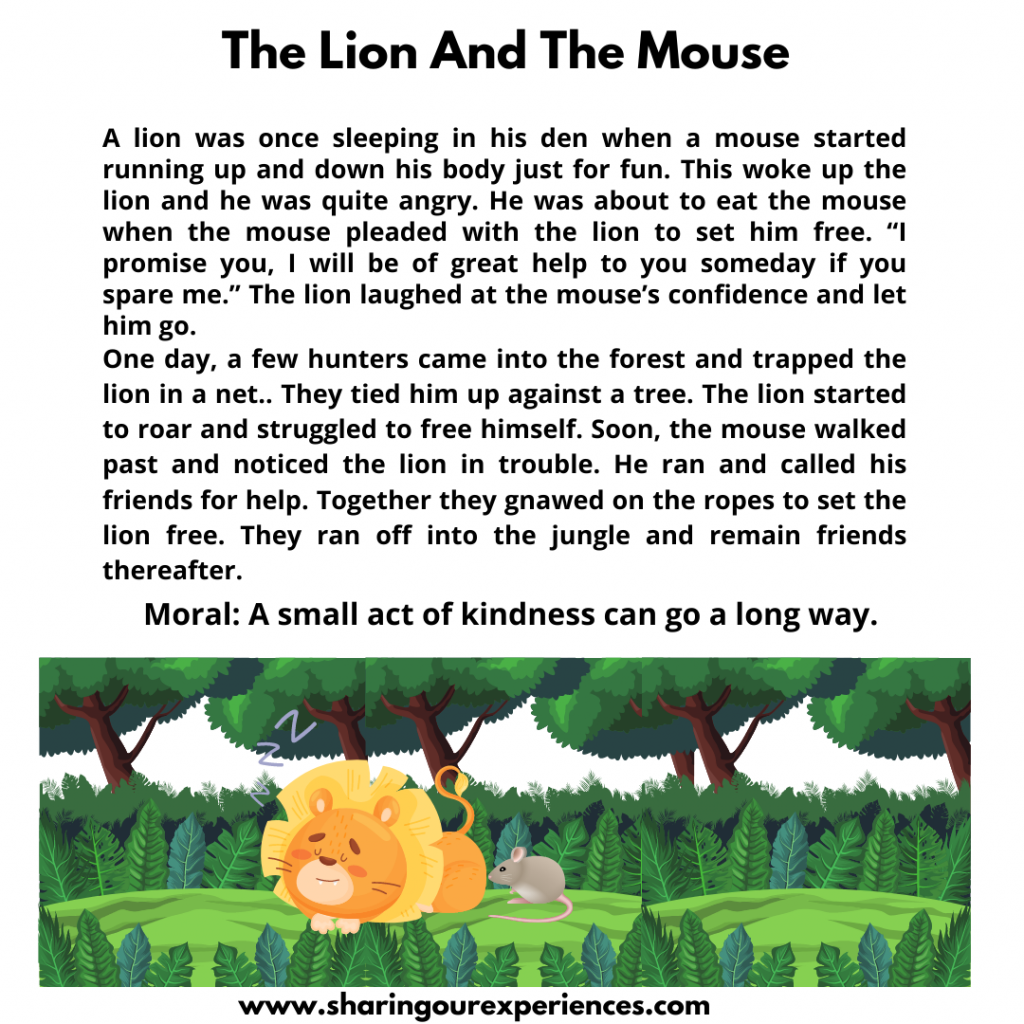
Also Read – How to teach kindness to kids
One day, a wicked fox invited a crane for dinner. The crane was very happy with the invitation. She reached the fox’s home on time and knocked at the door with her long beak. She has been excited the whole day and was extremely hungry.
The fox soon served some soup in shallow bowls for both of them. The crane was surprised and angry too, as she couldn’t have soup at all. Her long beak couldn’t help her drink from the bowl.
But, the fox licked up his soup quickly. Feeling cheated and humiliated, she decided to teach the fox a lesson soon.Â
She didn’t show her anger and behaved politely with the fox. Before leaving she invited him for dinner the next day. She made rice porridge for the dinner and served it in two tall narrow vases.
She happily drank her porridge from the vase. The fox tried hard but couldn’t, as the neck of the vessel was narrow. The fox understood everything. He had learned his lesson and had to go home hungry.
Moral : A selfish act backfires sooner or later.

If your child likes stories and storybooks, then he/she will love this set of books- Best story books by Sudha Murty <<< The most amazing stories you’ll ever read to your kid!

Once a fox wandered across the jungle in order to get some food. It was very hot, and the fox was very hungry. He looked everywhere, but couldn’t find anything that he could eat.
His stomach was hurting by now, but he continued his search. Soon, he spotted a vineyard that was laden with big juicy grapes. He looked around and saw no one. He thought to himself that the grapes must be really sweet to eat. So he decided to steal some grapes.
He jumped high, but he couldn’t reach the grapes. He tried again and again, but he could not catch a bunch of grapes. He went back and forth to build up speed but still, the grapes were beyond his reach.
The grapes were too high, but he refused to give up. He tried a few more times, and jumped high in the air but couldn’t reach the grapes.
 It was getting dark and the fox was getting angry. He finally gave up as his legs started to hurt. Walking away, he said, “I’m sure the grapes are sour. I am wasting my time and energy on them.
Moral : We pretend to hate something when we can’t have them.

Once there lived a woodcutter in a village. He was poor but hard-working. He used to go to the forest to cut down trees for wood. He sold them in the market and earned money for some food.
One day as he was cutting a tree, his axe accidentally fell into the river. The river was deep and was flowing fast. It carried away his axe swiftly. The woodcutter sat at the bank of the river and began to cry.
Suddenly, the Goddess of the river arose and asked him what happened. The woodcutter told her the story. The Goddess of the river offered to help him by looking for his axe.
She disappeared into the river and soon came up with a golden axe. The Goddess asked the woodcutter if it was his axe, but the woodcutter said it was not his.
She disappeared again and this time came back with a silver ax. Again, She asked him if it belongs to him, but the woodcutter said that that was not his either.
The Goddess disappeared into the water again and this time came back with an iron axe. The woodcutter jumped with joy and said it was his. The Goddess was impressed with the woodcutter’s honesty and gifted him both the golden and the silver axes.
Moral : Honesty is the best policy.
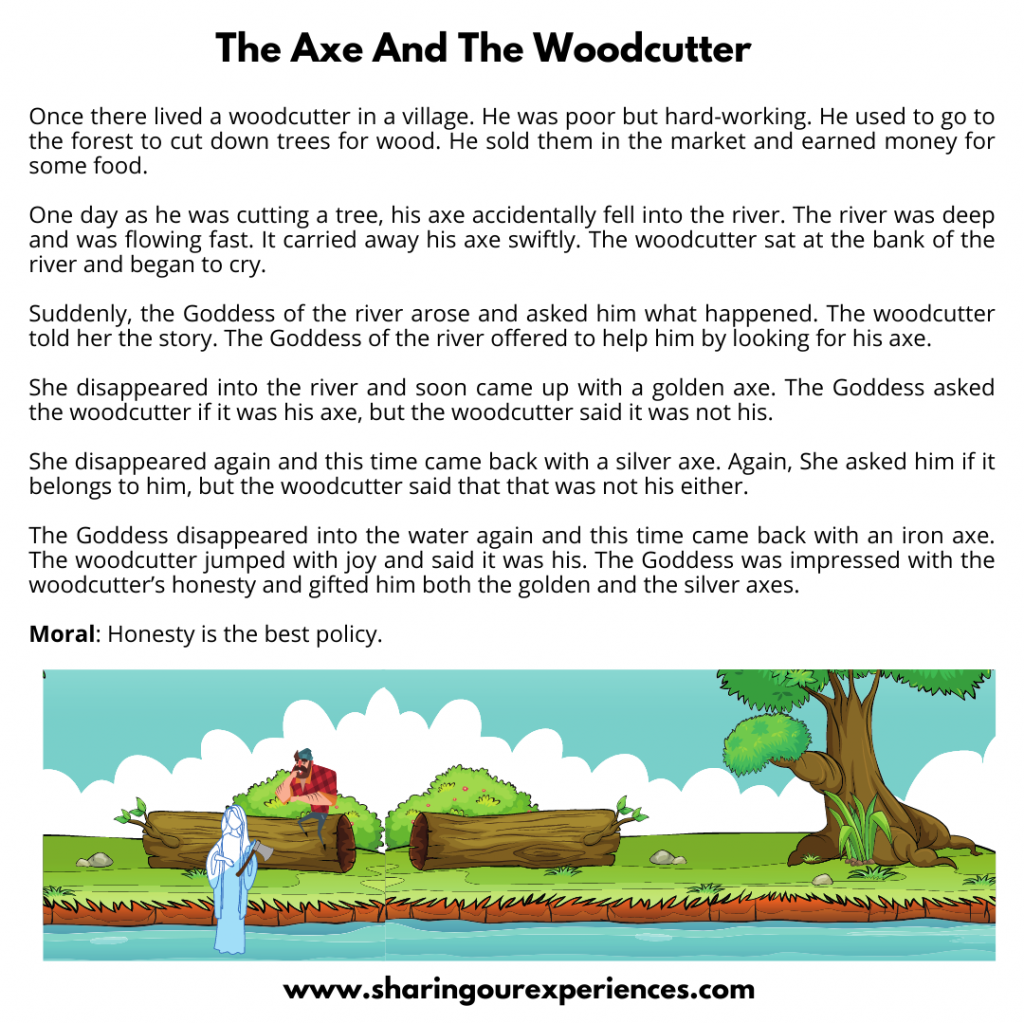
On a hot summer day, a lion in the forest started feeling hungry. He went hunting for food. Soon he spotted a rabbit roaming around alone. He thought to himself, “Such a small rabbit as this can’t satisfy my hunger.â€Â
Instead of catching the rabbit, the lion let it go. Just then, a beautiful deer passed by, and the lion decided to hunt it down.
So, he ran behind the deer. Since he was weak because of the hunger, he could not keep up with the deer’s speed. Soon, he was tired and could no longer chase the deer.
He let go of the deer and went backing looking for the rabbit to fill his stomach for some time. But, the rabbit was gone. The lion was sad and remained hungry for a long time.
Moral :Greed is never a good thing. We should be happy with whatever we get.
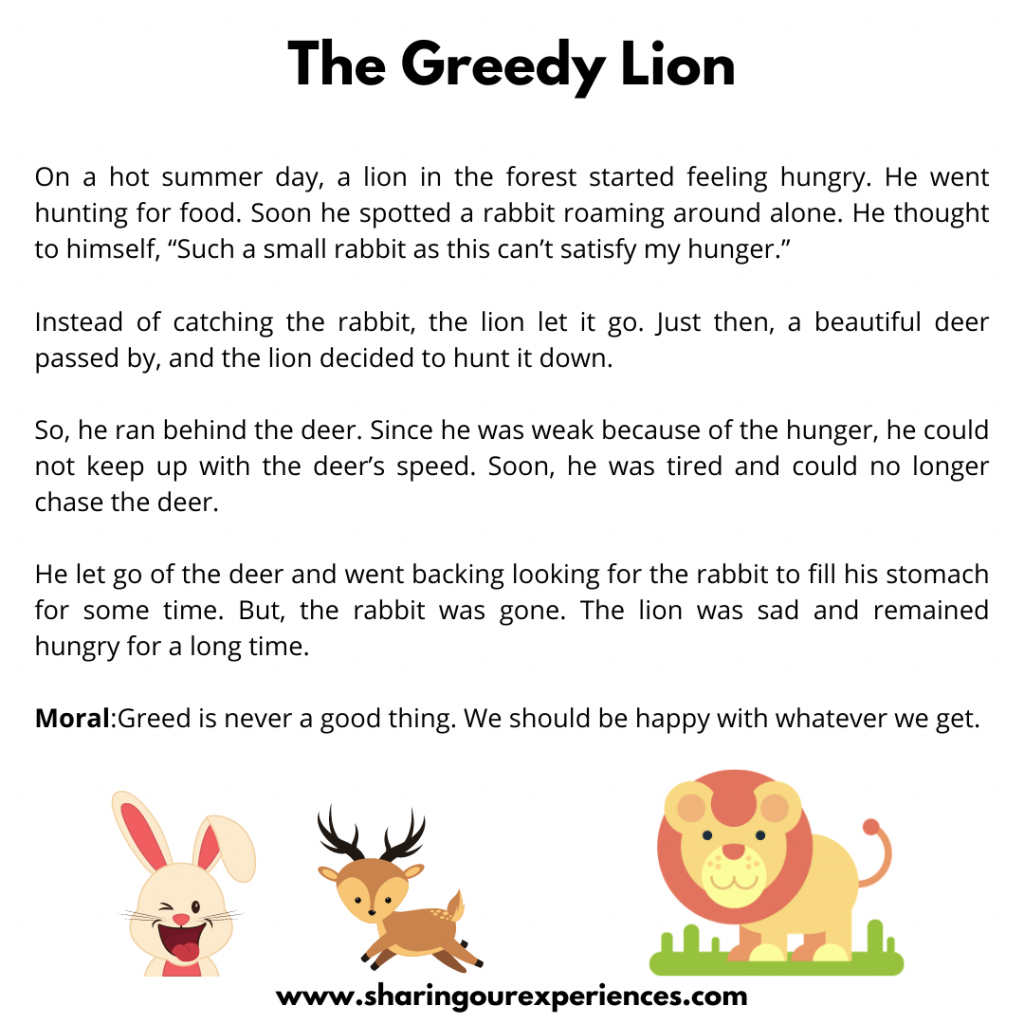
There lived a simple brahmin in a village. One day, he went to another village to attend a religious ceremony. As a gift, he received a goat. He put the animal on his shoulder and started walking towards home.
On the way, a group of three cheats spotted him with the goat. They wanted to feast on the goat. They knew the brahmin would not give the goat to them easily, so they decided to trick him. They made a plan and started working on it.
They hid behind a tree in some distance and waited for the brahmin to pass by. As soon he passed by, the first cheat approached him and said in a surprised tone,†Why are you carrying a dog on your shoulder?. You are such a pious man.†The brahmin replied angrily that it was a goat, not a dog. The cheat smiled inwardly and apologized.
The Brahmin walked away cursing the cheat. A few minutes later, the second cheat approached the brahmin and enquired,†Why are you carrying a dead animal on your shoulder. You are a holy man, it doesn’t suit you.â€
Now, the brahmin was furious. He shouted back angrily and started cursing the man. He said,†Are you blind? Can’t you see that I am carrying a goat, you blind fool!†The rogue pretended innocence and said,” I say whatever I see in front of me.” The brahmin called him an idiot and began to walk very fast towards his home.
As planned, the third cheat now approached the brahmin. He stopped him and asked,†Why are you carrying a donkey on your shoulder?†The brahmin grew impatient and started abusing the cheat. But the trickster continued with his lies and convinced him that he was indeed carrying a donkey and walked away.
Now, the Brahmin started shaking in fear. The three cheats gathered at a distance and watched everything. Their plan was successful. The brahmin was convinced that he was carrying some evil creature on this shoulder. Every person he met on the way saw a different creature on his shoulder. He started to shake in fear. He threw the goat on the road and ran away hurriedly to his home without looking back.
The cheats laughed heartily. They took the goat home and feasted on it. They enjoyed the fact that they could fool the brahmin easily.
Moral : We should not let go of our common sense. We should not believe whatever anyone says.
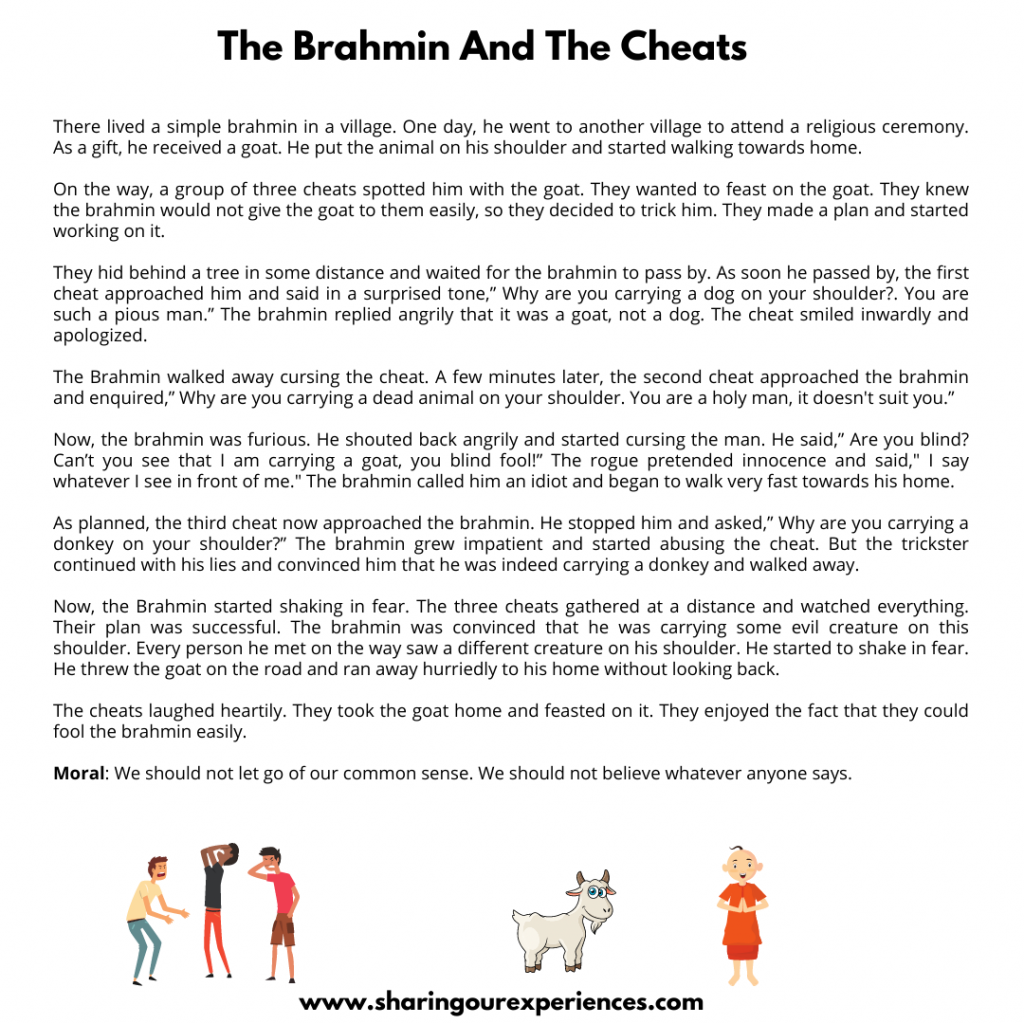
A hunter once caught a rabbit. The rabbit was very scared. He then calmed down and thought of a plan to save himself.Â
He was a clever rabbit. He said to the hunter,†I know of a place which is full of gold. You can have it all for yourself. You can become so rich that you will not need to work for your living.”
Now, the hunter was greedy. He was easily trapped in the rabbit’s plan. He said,†You take me to that place.â€The rabbit said,†First you have to free me, and then follow me to reach that place.â€Without a second thought, the hunter placed the rabbit on the ground.
Without wasting another second, the rabbit ran away swiftly. The hunter was left wondering and he regretted his decision. But now, it was too late to do anything. He never got to see any gold and even lost the rabbit he had captured.
Moral : Greed leads to loss. We should be patient in every situation.
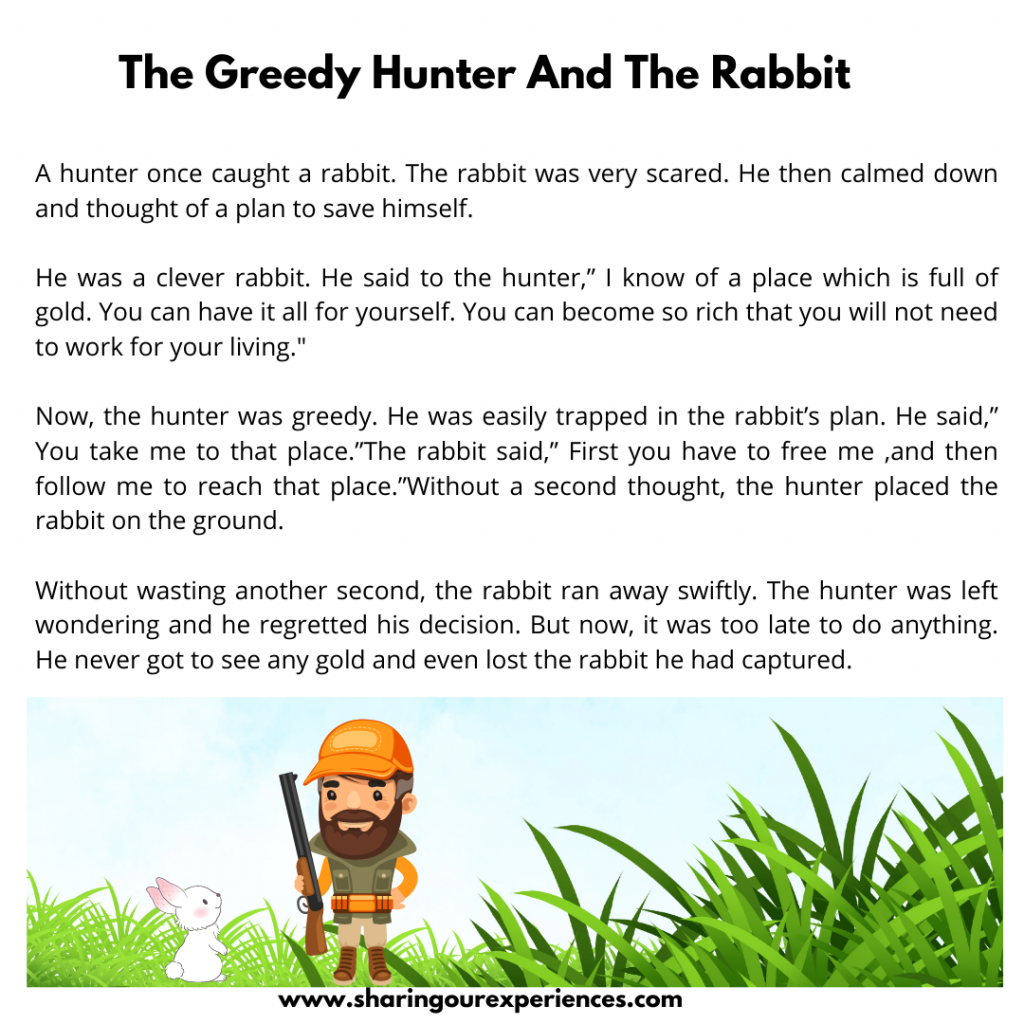
There once lived an elephant in a jungle. He was very arrogant and short-tempered. He was very proud of his strength and huge body. The other animals in the jungle feared him a lot. He enjoyed doing things that showed off his strength and always troubled other small animals in the jungle.
In that jungle, there also lived a family of ants in a tiny hole. The ant used to despise the elephant for his haughty nature. One day, when the ants were away to collect food, the elephant stopped them and sprayed a trunk full of water on them.
The ants got angry and said,†You should not trouble others for your pleasure.â€The elephant shouted angrily and said,†You tiny creatures, keep quiet, or I will crush you to death.â€
Now, the ants decided to reach the arrogant animal a lesson for life. They slowly crept under his trunk and spread to his ears and started biting him. The elephant became restless and started crying for help.
None of the animals came forward to rescue him. They were happy to see him getting punished for his acts. He kept apologizing to the ants, but they continued to bite him.
When they were sure that he has learned his lesson, they let him go and said, “This is how others feel when you hurt them.†The ants marched off leaving a wailing elephant there. Then on, the elephant never troubled anyone in the jungle.
Moral : Pride and arrogance never go unpunished.
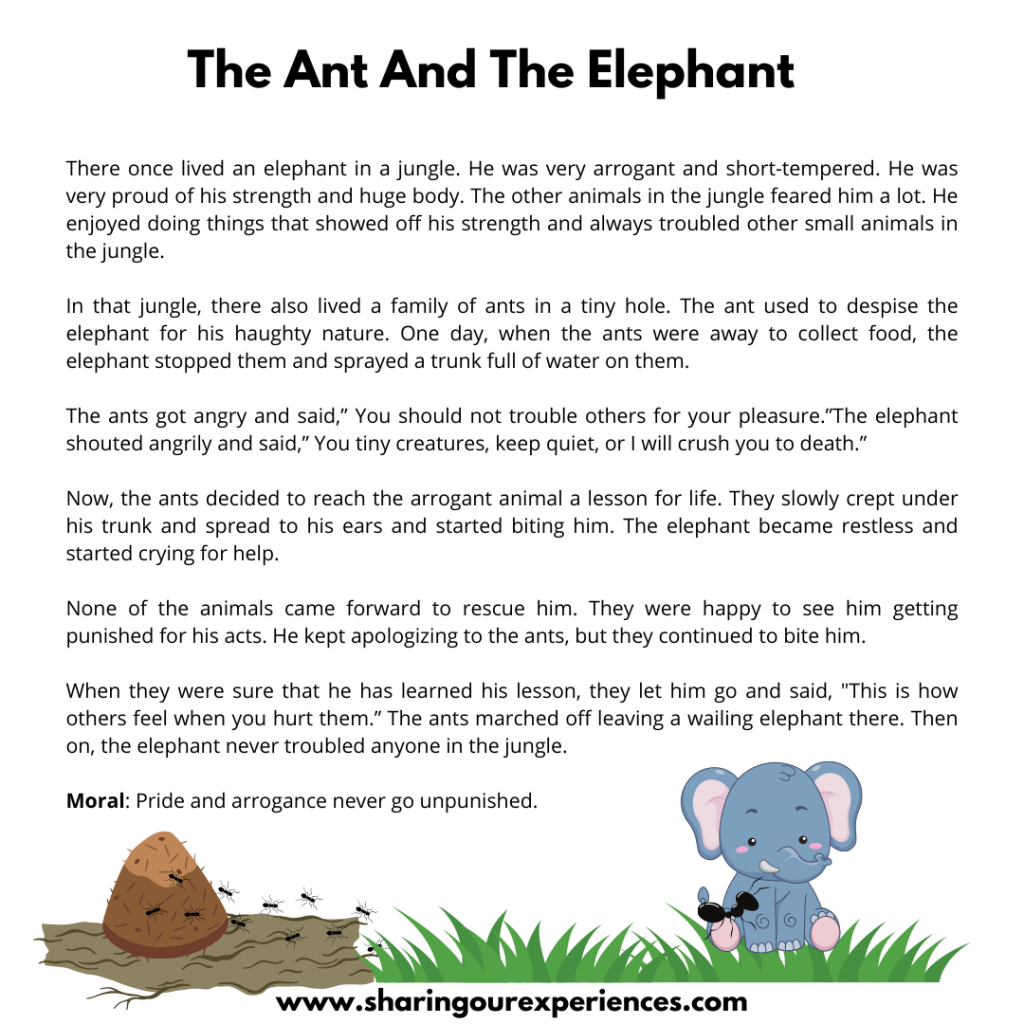
Once a monkey and a crocodile were friends. The monkey lived on a jamun tree on the bank of the river where the crocodile lived. The monkey used to feed on the jamuns and share them with the crocodile.
One day, the crocodile took some fruits home for his wife. The wife tasted it and loved the fruit. She asked her husband,†Where did you get these from?†The crocodile then told her about his friend, monkey. The wife expressed her desire to eat the monkey’s heart.
The crocodile refused, but she continued to persuade her husband. Finally, he gave in. He was upset as he loved the monkey much and did not want to see him killed. The next day he lied to the monkey that his wife had invited him (the monkey) for dinner. The monkey gladly accepted the invitation. He jumped on the crocodile’s back and reached the middle of the river.Â
The monkey noticed that the crocodile was looking lost. The crocodile could no longer hide anything. He said that his wife would eat his heart. He didn’t want to cheat his friend but was left with no other option.
The monkey was shocked, but he calmed himself and said in a friendly tone,†Why did not tell me earlier? I left my heart on the tree. Let’s swim back to the bank to get it .â€The foolish crocodile immediately agreed and quickly swam back to the river bank.
The monkey quickly jumped off the crocodile’s back and climbed up to the topmost branch of the tree. He shouted,†You fool, how can someone live without his heart. You don’t deserve to be my friend. Get lost.â€The crocodile was sad to lose his good friend forever.
Moral : Foolishness can make you take wrong decisions.

There was a cap seller . He used to make and sell caps to neighboring villages and markets. One day, he packed all his caps in a basket and set afoot on his journey. It was a hot day. He got tired of walking and decided to rest under a big banyan tree. Since he was very tired, he fell asleep.Â
After some time, he woke up. He was shocked to see his basket empty. The caps were missing. He started looking everywhere when he suddenly spotted a monkey wearing a cap.Â
He looked up to the tree and saw many monkeys wearing his cap. He now understood everything.When he was sleeping, several monkeys came down the tree and pulled the cap seller’s basket. They picked up the caps and climbed back up the trees.Â
The cap seller became very upset. He shouted at the monkeys on the tree. The monkeys yelled back at him. The cap seller was irritated. He picked up few stones from the ground and threw them at the monkeys to scare them. But the monkeys started pelting stones in return too.Â
The cap seller was frustrated now. He started crying. The monkeys started crying too. Now, he realized that the monkeys were imitating him.
He thought of an idea and threw his cap on the ground. Seeing this, all the monkeys copied his action and did exactly the same. The cap seller quickly collected his caps in the basket and ran away.
Moral : Wisdom is powerful than strength.
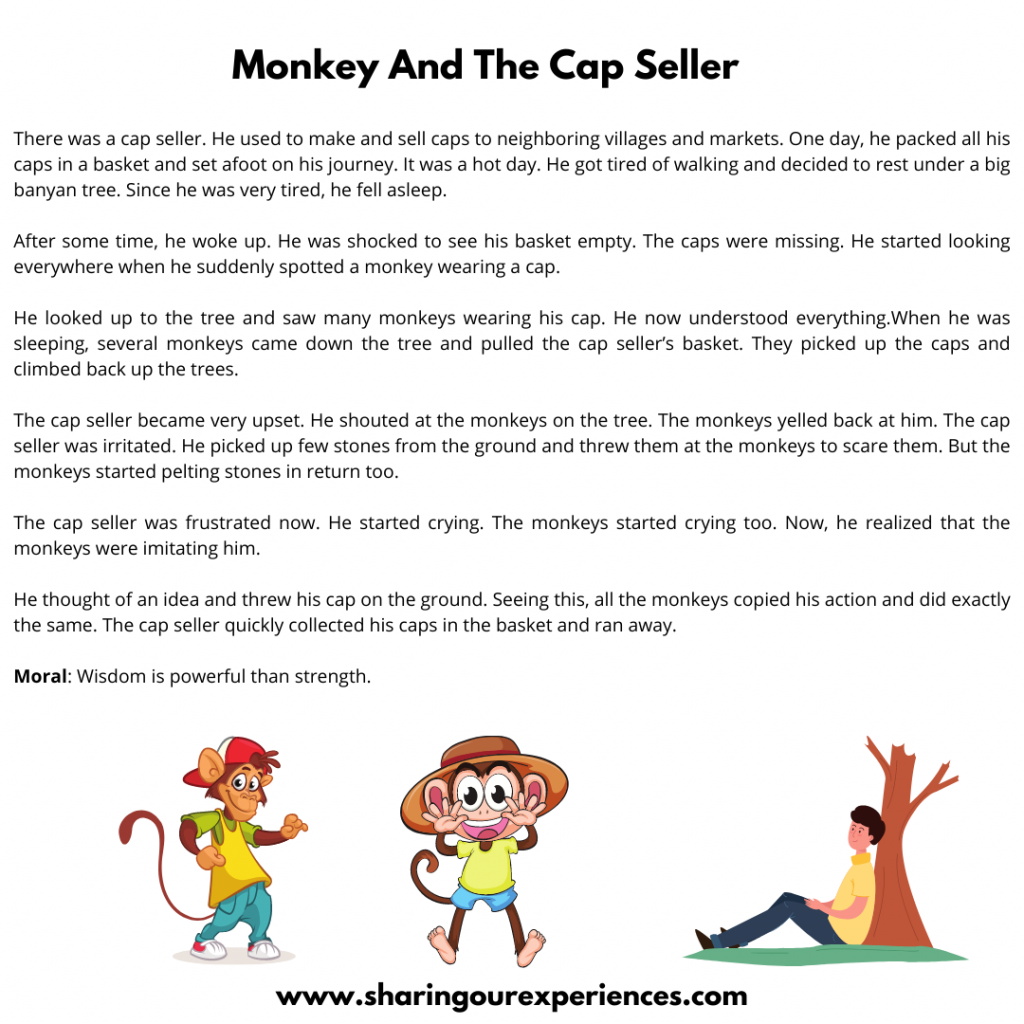
There once lived a hare in a jungle. He was very proud of himself. In the same jungle lived an old tortoise. The arrogant hare found him funny and always made fun of his slow pace in front of other animals.
The tortoise lost his cool one day and challenged the hare for a race. Everybody was surprised, and the hare was laughing loudly. Nevertheless, he accepted the challenge. The race was to take place the next day. The winner had to reach the bank of the river. They started the running race.
The hare ran very fast. But the tortoise walked very slowly. Within no time, the proud hare was halfway through the distance. He thought to himself that the tortoise with his slow pace can never match him. So, he decided to rest under a tree for some time. But, he soon fell asleep.
On the other hand, the tortoise continued to walk towards the finishing point without pausing for a rest. He passed by the sleeping hare. Soon, it was sunset. There was a loud noise of clapping.Â
That day the hare had slept longer than usual. When he woke up, he heard the clapping sound at a distance. He ran fast towards the finishing line. He was shocked to see the old tortoise at the finishing line. All the animals were celebrating his victory. The hare had learned his lesson for life. He never mocked anybody thereafter.
Moral :Slow and steady wins the race.
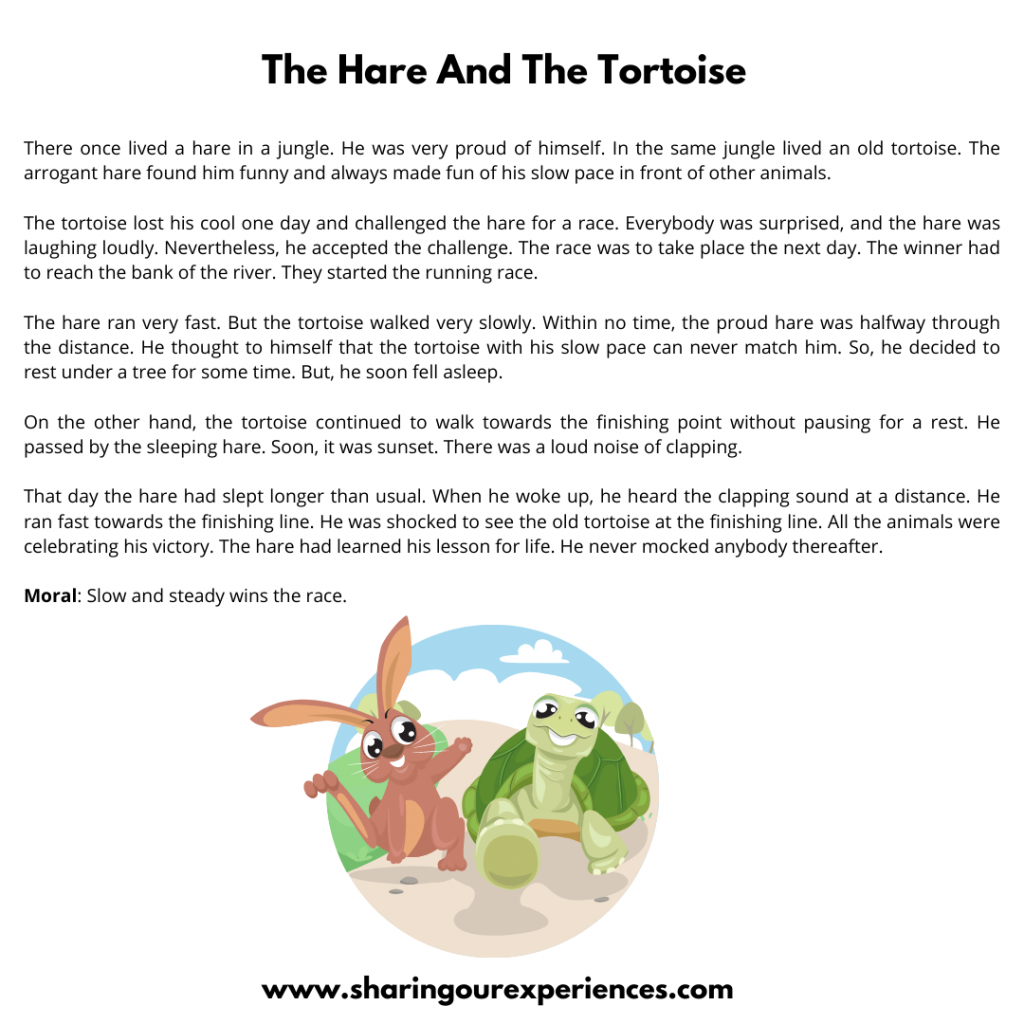
We found amazing and irresistible deal on Kindle Paperwhite 10th gen Kindle gives you access to a variety of free, unlimited books; makes your investment worth it.
Once upon a time, there lived a poor milkman. He was extremely lazy. He did not want to do any hard work. He was, always busy daydreaming about getting rich.
One morning he milked his cows and set out to sell the milk in the market. While walking, he began to dream about becoming rich.
He dreamt: “ I will sell the milk in the market. With the money, I would buy a hen. The hen will lay eggs. Some will be sold in the market. Some will hatch and become chicks. These chicks will become cocks and hens, who, in turn, will lay hundreds of eggs. I would soon have his poultry farm
He kept on imagining:â€.Again, I will sell all the hens to buy some bull. And finally, sell the bulls to buy a small house. While thinking about all this, he overlooked a stone on the way.
He fell over it and the milk spilled on the ground. All his dreams were broken in a second, and he realized he was daydreaming.
Moral : Work hard to fulfil your dreams.

Two cats once found a piece of bread. They both were very hungry. They were not willing to share the food with each other. They started fighting for the bread. One cat said, “I found it first it’s mine.” Another cat said, “No I found it first, it’s mine”Â
A monkey was seeing this from a distance. He wanted to eat the bread too. He thought of a plan to eat it himself. He approached the cats and asked them why they were quarreling. The cats told him everything. He then offered to solve the matter. He said,†I will divide the bread into two equal halves and give it to you.â€
Both the cats agreed to his proposal and gave him the bread. He cunningly divided the bread into two uneven pieces- one was bigger than the other. He then took a big bite from the bigger part. But this made the other part bigger than the other. He continued doing this until he ate the whole of the bread.
The two cats were too late to realize his cleverness. The monkey fled away after eating their bread right in front of them. They now realized that had they shared the bread with each other, they would not have been left hungry.
Moral : If two people fight, the third one takes an undue advantage.
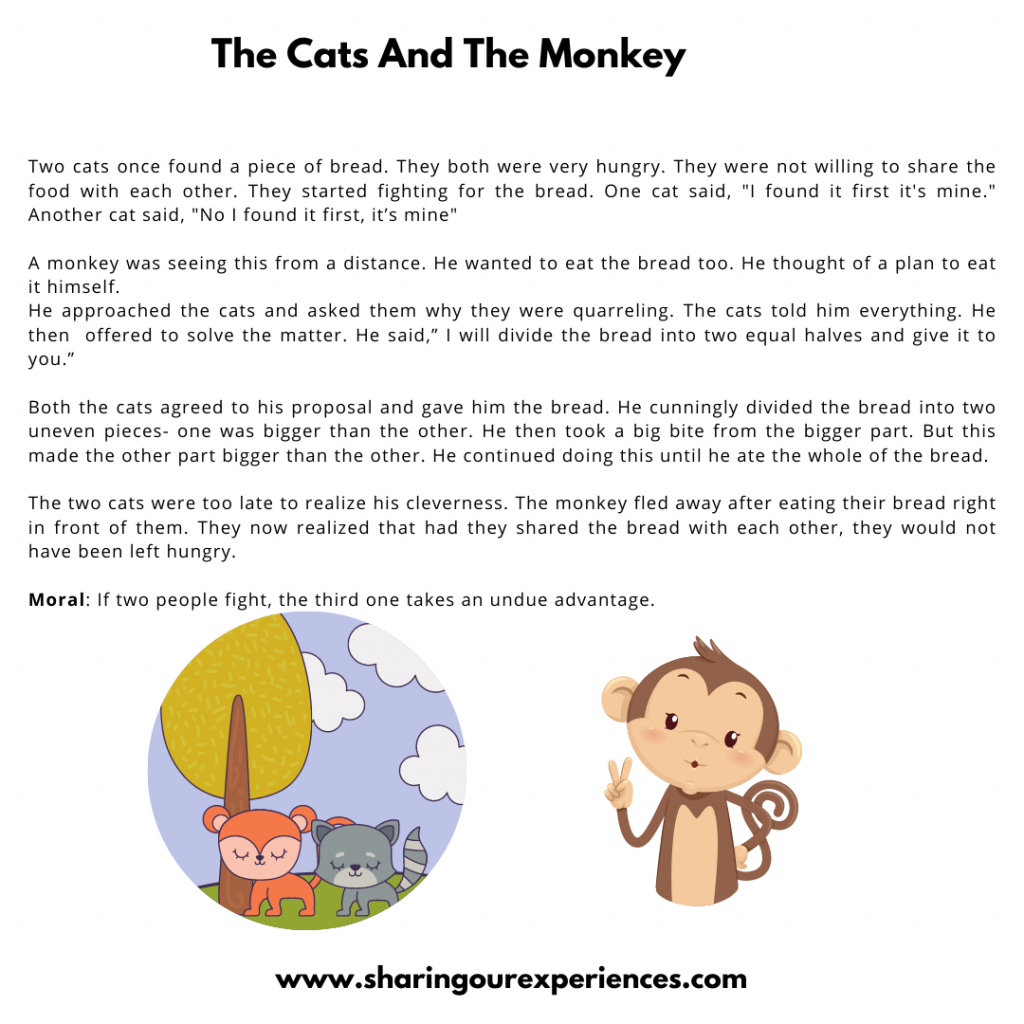
A greedy dog once found a juicy bone lying near a meat shop. He picked it up and held it tightly in his mouth. He looked here and there, and then, ran away to a lonely place. He stopped at a bridge over the river that ran nearby.Â
There he saw his reflection in the water. He thought that there was another dog with a bone in the water. He got greedier and thought of taking away that bone from the other dog.Â
He immediately started barking at his reflection in the water. The moment he opened his mouth, the bone in his mouth fell into the river. The greedy dog did not get any bone and even lost the one he had. He realized his mistake and left the place feeling upset.
Moral : Greed causes pain and brings regret.
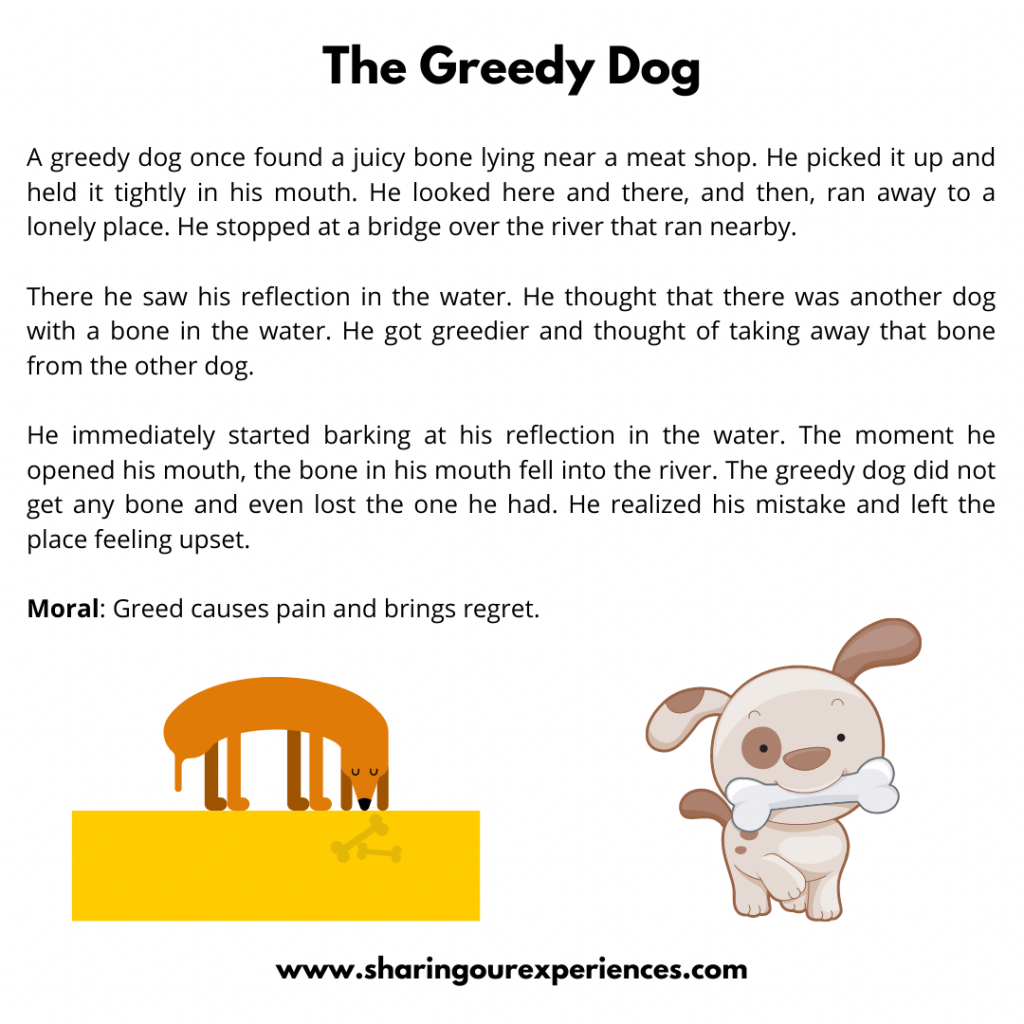
H ave you checked out Caravan mini for stories, Poems, songs, shlokas and bhajans ?? It is an awesome device that will make your life easy and something your child will truly love!! Check out Caravan Mini for kids Reviews
Once a fairy gifted a magical goose to a poor farmer. It laid one golden egg every morning. The farmer made money by selling that golden egg in the market. Slowly, he became rich.
Now, the farmer became greedy. He wanted more wealth. He thought to himself,†This goose gives me just one golden egg a day. What if I cut it open and take out all the golden eggs at once? I will be the wealthiest person in the village.â€
Without a second thought, the farmer took a knife and killed the goose. He cut open his belly, but could not find any egg there. He started crying when he realized his mistake. He not only lost the goose but also the golden egg it laid every day.
Moral : Greed causes miseries.
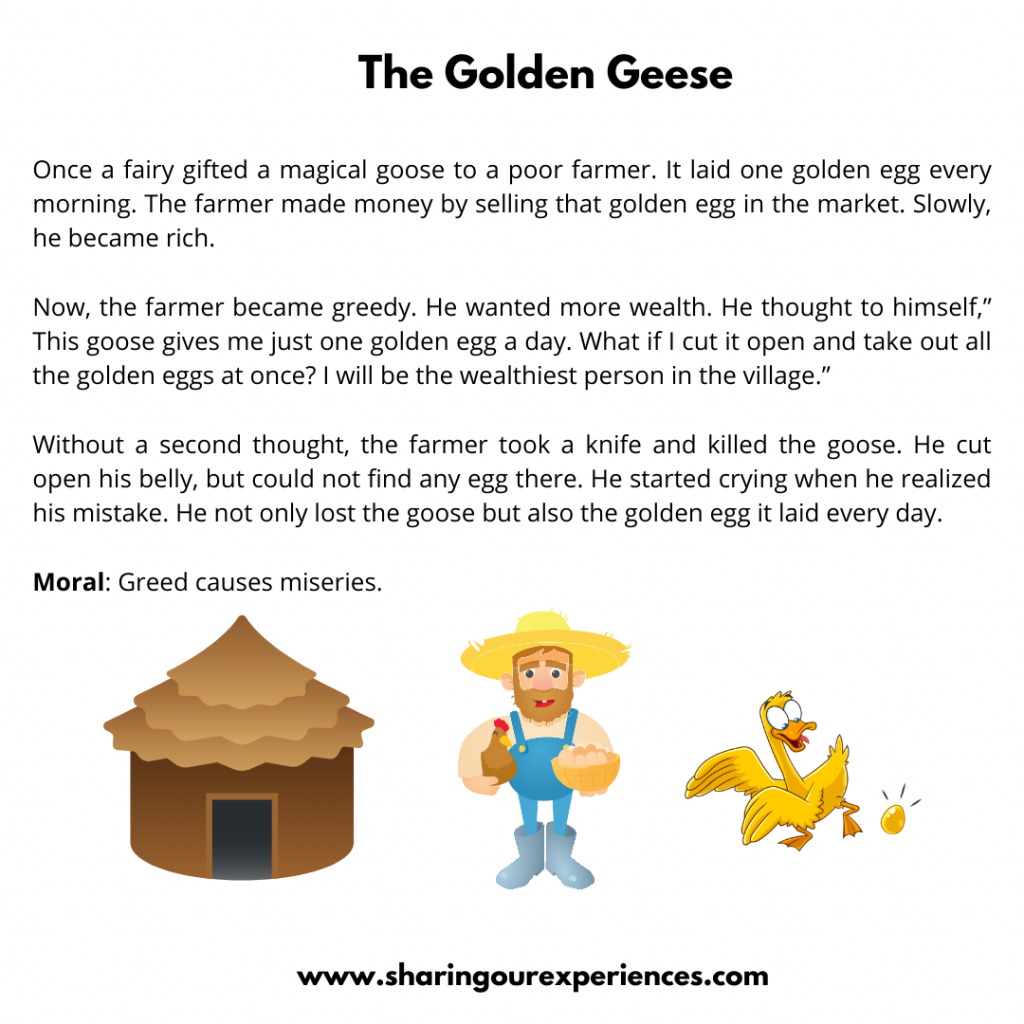
Once there lived an old farmer in a village. He had four sons. They were always quarreling with each other. The farmer tried hard to bring unity among them. He would request them to live with love and peace, but they would never listen to his advice. He was always worried about their future.
One day, he fell sick. He thought that it was his chance to bring harmony among his sons. So, he called his sons and asked each of them to bring a few sticks. They brought the sticks to their father.
The farmer asked one of them to tie the sticks in a bundle. He then asked each of them to try and break the sticks.
One by one, all the four sons tried to break the bundle but failed. Then, the farmer untied the bundle. He gave one stick to each of them and asked them to break it. This time they were able to do it easily.
The farmer said, “I just wanted to show you that if you are united nobody can defeat you. But you keep quarreling among yourself, you will be easily broken by anyone.â€The sons learned their lesson and lived happily with their father thereafter.
Moral : Unity is strength.
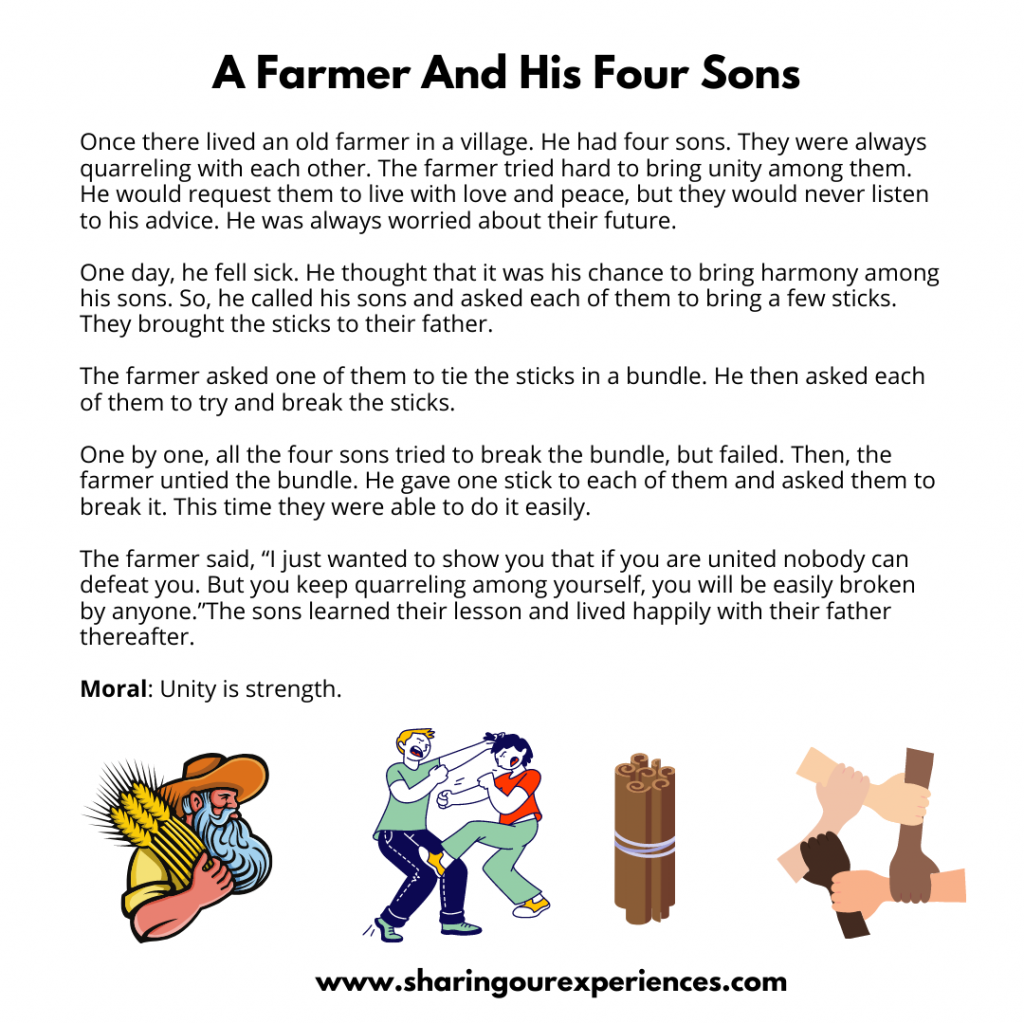
Once there was a big warehouse full of rice bags. Many rats lived there and ruined the grains. The owner was tired of finding ways to keep the rats away. So, he bought a cat and left it in the warehouse.
The cat would silently play around and chased the rats away. The rats were terrified and decided to have a meeting. They gathered together one evening at a secluded place and started their discussion. They were very confused and couldn’t think of any solution to stop the cat.Â
Suddenly one of the rats said, ” We should tie a bell around the cat’s neck. If we tie a bell around the cat’s neck, we can hear the sound of the bell when the cat comes. This way we would be alerted.”Â
The rats found the idea interesting. Then a rat asked, “who will tie the bell around the cat’s neck?” Now, all the rats fell silent as no one was willing to take a risk. They understood that it is easier said than done.
Moral :Most things are easier said than done.            Â
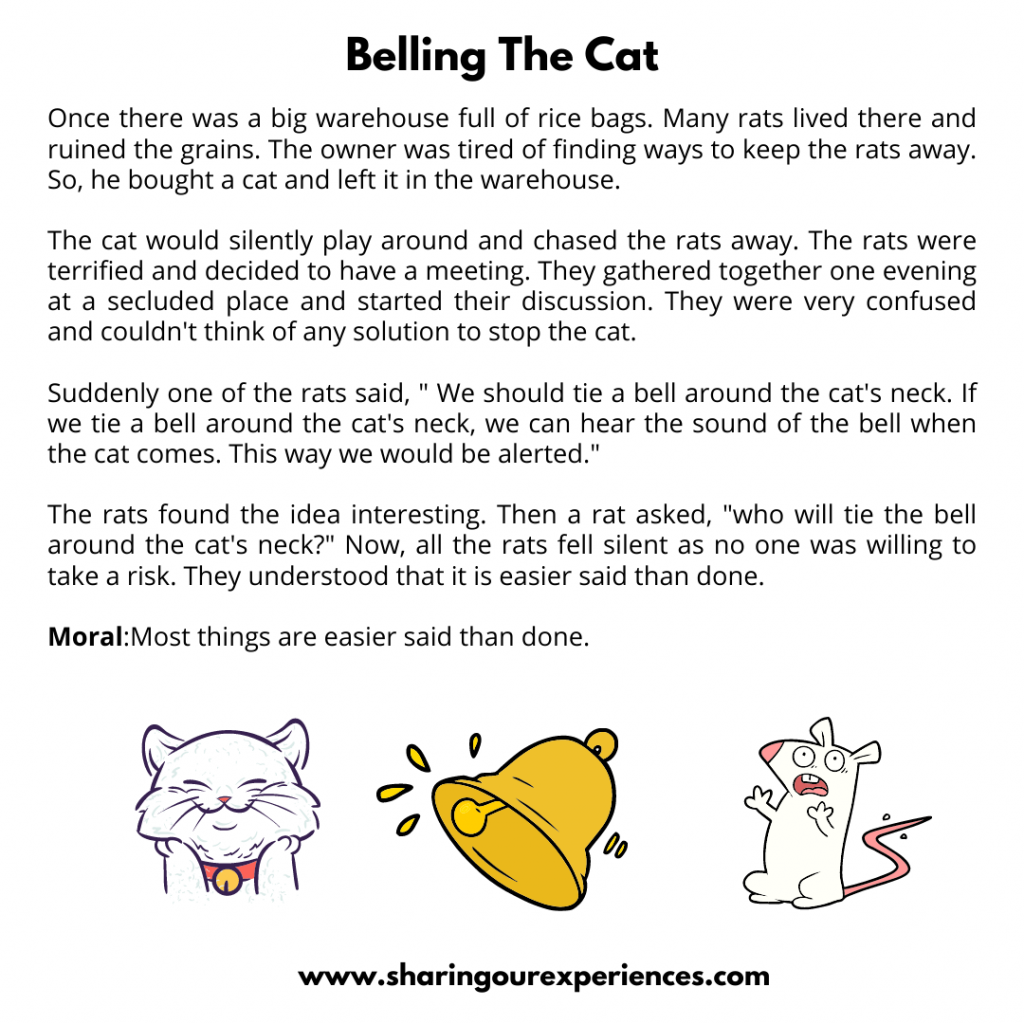
There was a shepherd boy who had to look after a flock of sheep. He was very lazy and always troubling others. One day, he took his flock to the hills to graze. He felt bored and decided to play a trick on the villagers for some fun.
He shouted, “Help! Wolf! Wolf!†The villagers who were working on the farm heard his cries. They took some tools and rushed out of the village to help the shepherd boy. On reaching the hills, they were surprised to see that there was no wolf.
The boy laughed loudly, “Ha, Ha, Ha! I fooled you all. I was only playing a trick on you.†The villagers were enraged, and they went back.
A few days later, the boy played this trick again. Again he cried, “Help! Help! Wolf! Wolf!â€Â This time, too, the villagers rushed up the hills to help him. Again, they found that the boy had tricked them. They were very angry with him for being so naughty and reckless. But, the boy laughed at them.
Then one day, a wolf actually came to the hills where the sheep were grazing. The wolf attacked the sheep one by one. The boy cried out for help. He shouted, “Help! Help! Wolf! Help! Somebody!â€
The villagers heard his cries, but they thought the boy was tricking them again. They continued to work ignoring his cries. The boy somehow escaped from there, but his sheep were eaten by the wolf. He now learned his lesson for life. He promised himself to never lie again and trouble others.
Moral : No one trusts a person who lies, even if he is telling the truth.
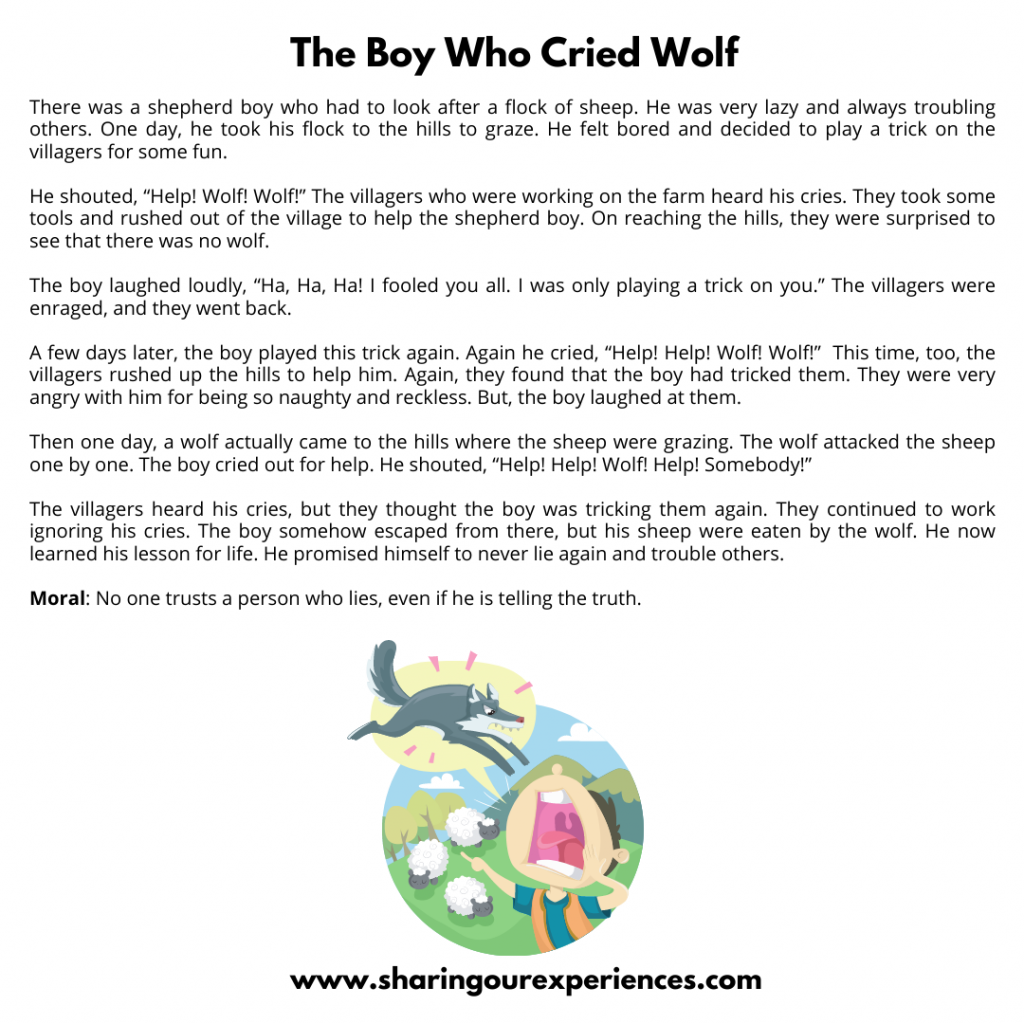
AÂ crow once found a big piece of cheese. He held the cheese in his beak and flew away to a nearby tree. A fox was passing by when he saw the crow with the big piece of cheese in his mouth.Â
He went to the crow and said ” Good morning, dear crow. You have a lovely piece of cheese with you. Could you please share a bit with me?”.Â
The crow refused and looked away. The fox begged a little, but the crow wouldn’t listen. He just sat there, quietly eating his cheese.Â
But the fox didn’t give up. He continued persuading the crow. He called the crow handsome and praised his black feathers. He said,†You have a beautiful voice too. Everyone in the forest is praising your voice. Can you sing a sweet song for me?”.Â
The fox saw the crow swelling with pride. The foolish crow believed the cunning fox. He suddenly forgot all about the cheese and began to sing.Â
As soon as the crow began to sing, the piece of cheese fell down to the ground. The fox immediately picked it up and ran away. The crow was left crying on the tree all by himself.Â
Moral:Â Beware Of flatterer.
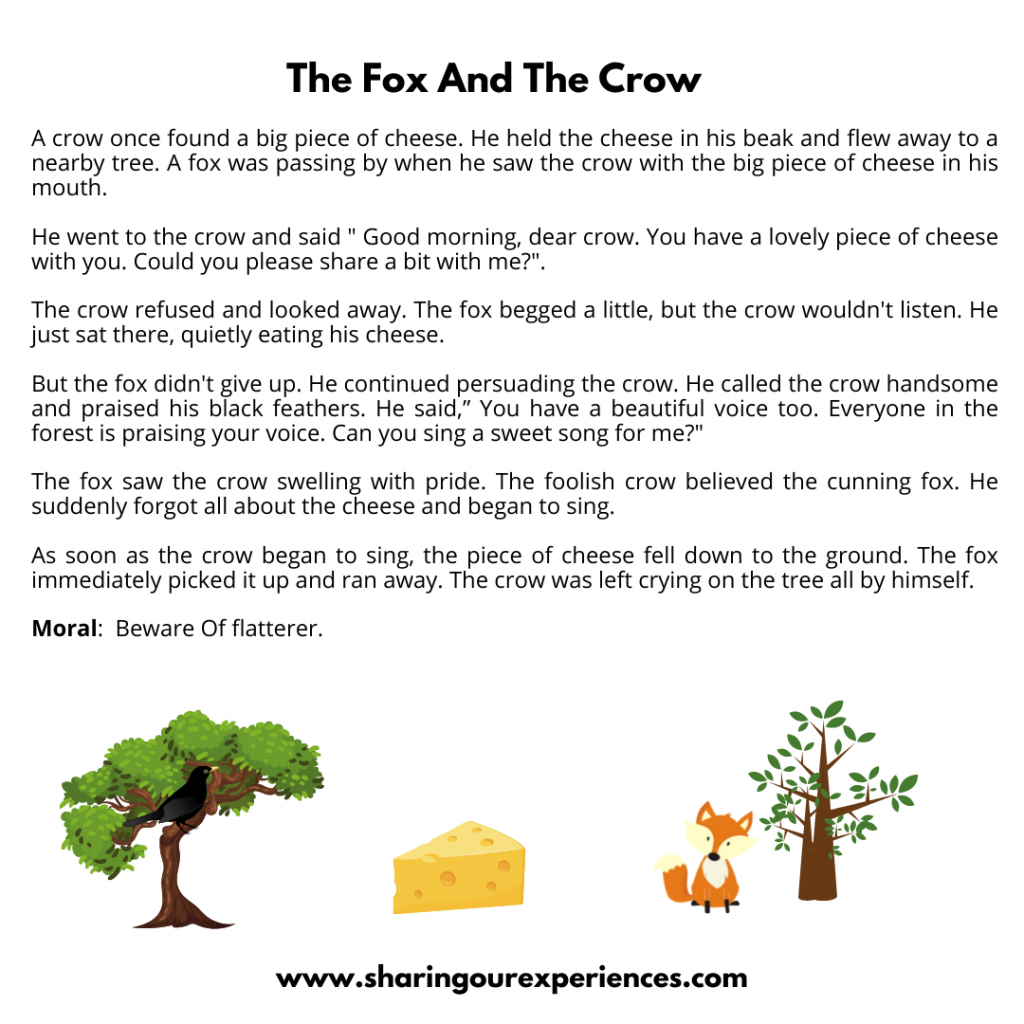
Long ago, a pigeon flew down to drink water from a river. While drinking, she noticed an ant flowing away with the water. She thought of helping the ant. She looked around and plucked some leaves from the tree. She then flew over the river and dropped it into the water near the struggling ant.Â
The ant quickly climbed over the leaf and reached the shore safely. The ant was grateful to the bird and thanked her. The pigeon smiled and said that it was her duty to help someone in need. She then flew away.
 A few days later, a hunter came to the jungle. He was aiming at a pigeon that sat on a nearby tree. The ant was walking through the forest when she noticed the hunter with a gun.
She immediately recognized the pigeon who had saved her life. She decided to return the favor by helping the bird. She crept into the hunter’s trousers and bit him hard.
The hunter fired the shot but missed his target because of the ant bite. The pigeon heard the gunshot and was alarmed. She flew away.
The ant, too, quickly jumped off the hunter’s leg and fled into the forest. The hunter sat there upset and saw the pigeon flying away.
Moral : We should always help others selflessly.
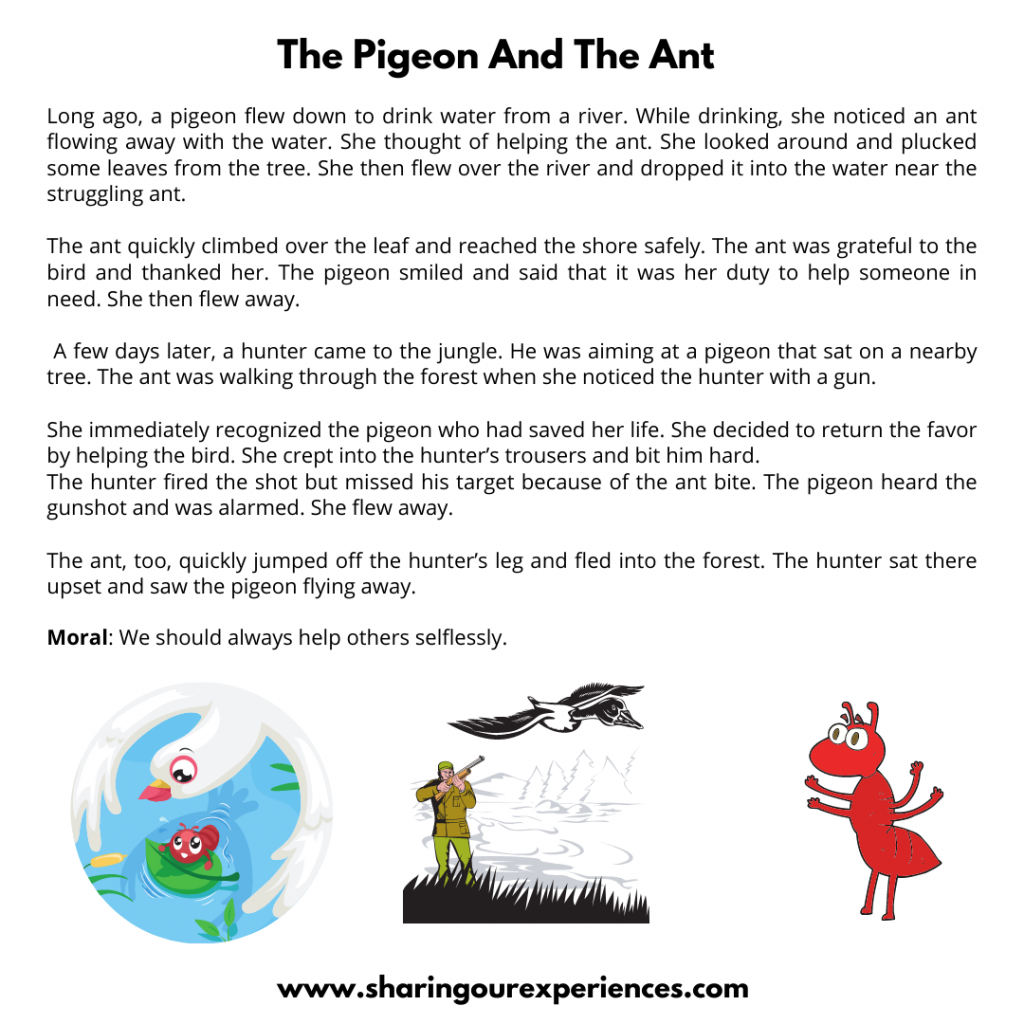
Once there lived three fishes in a lake. They were very good friends. They loved playing with the other fishes in the lake. One day, some fisherman came near the lake. They saw many fishes there and decided to come back the next day to catch them all.
One of the three fish heard the fishermen talking. She hurried back to her friends and alerted them. She suggested that they should leave the lake immediately and go to some safer place. To this, the second fish agreed, but the third fish refused to go.Â
She said, “ It is not wise to run away from here. If we are destined to die, then we will surely die. Nobody can save us. So, I am not going anywhere.
The first fish said her goodbyes to her friends and immediately left with her family to some other lake. The second fish waited for the morning. When she saw the fishermen, she, too, left the lake with her family.
The fishermen spread their nets and captured all the fish from the lake. The third fish was also captured, and they all died.
Moral : We should act immediately when we see a danger approaching.
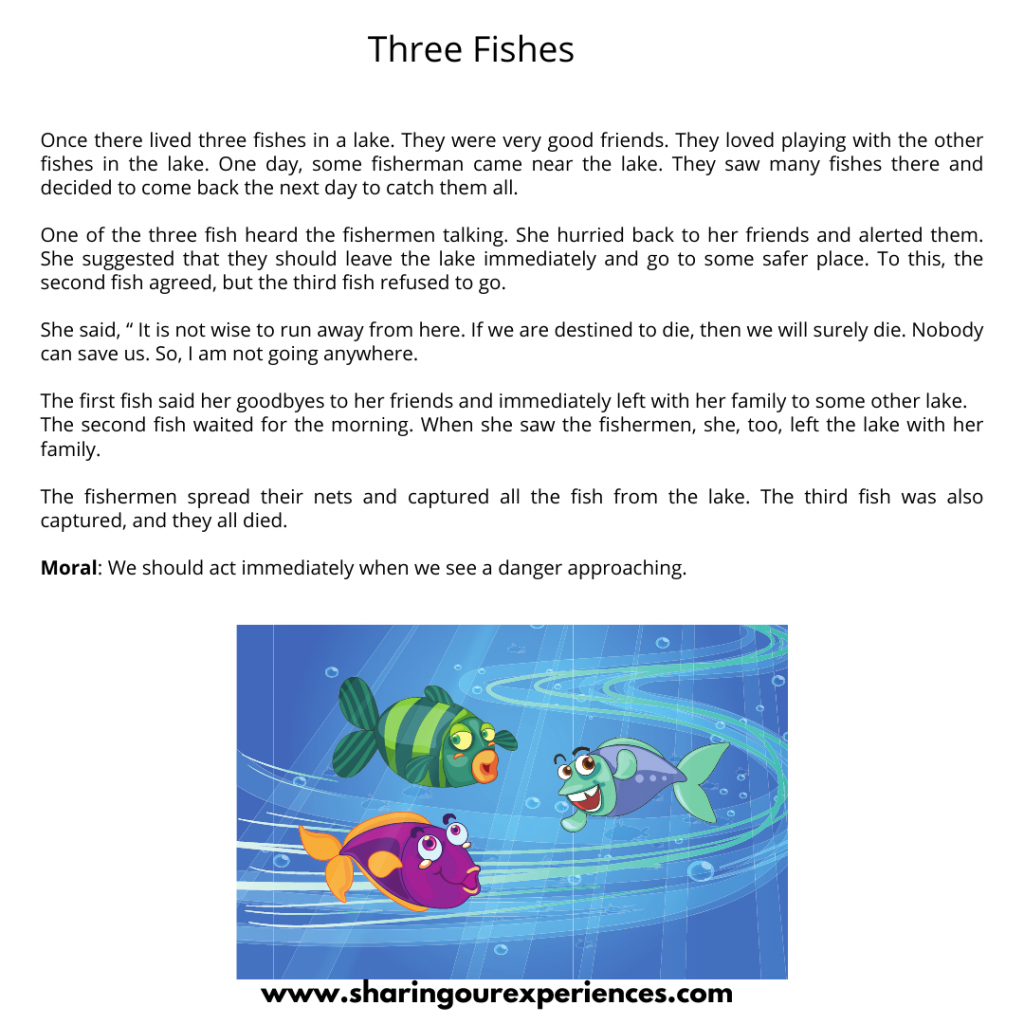
Long ago, there lived a tortoise and two swans in a pond. They were very good friends. The tortoise was very talkative. He used to talk to swans for a very long time. All of them were happy.
Once there was a drought and it lasted for a long time. The water in the pond dried up. There was no water to drink even and it was now impossible to live there. So, the swans decided to fly away to some other place.
The tortoise requested the swans to take him along too. But, since he couldn’t fly, they sat down to think and found a way. The swans suggested an idea according to which the tortoise would have to hold a piece of the stick by its mouth and the swans will hold the ends of that stick.
They warned the tortoise to not talk during their journey. The tortoise promised, and the three friends set out to fly. On their way, they crossed several villages. Many villagers saw the tortoise and made fun of the tortoise.Â
This enraged the tortoise and he couldn’t control himself. He opened his mouth to speak. As soon as he did so, he fell down and died. The swans were shocked to see their friend die. The tortoise lost his life because of his foolishness.
Moral : We should listen to our friend’s advice.
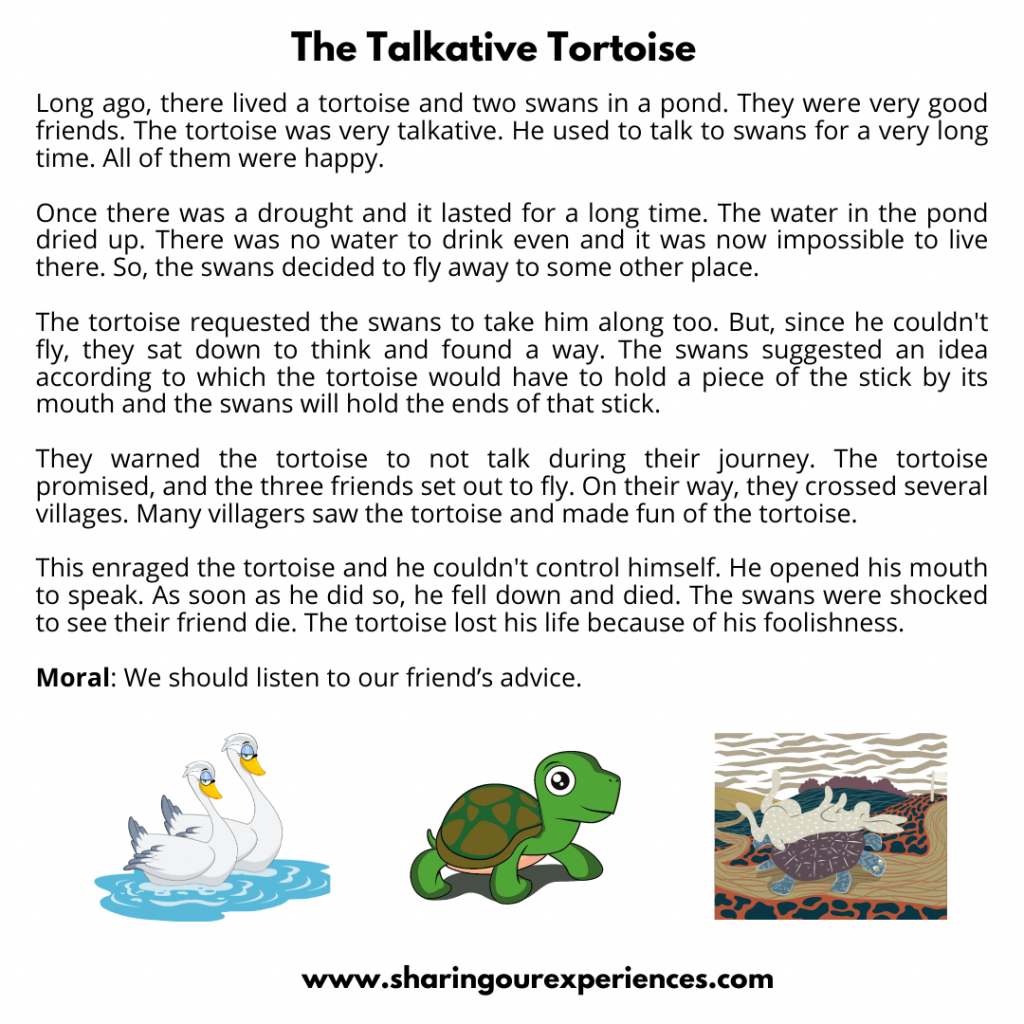
Emperor Akbar was famous for asking tricky questions to his courtiers. One day, his question left everyone in the courtroom puzzled. Just then, Birbal walked in and asked what the matter was.
The other courtiers repeated the question to him. The question was, “How many crows are there in the city?â€
Birbal thought for a moment and smiled. He replied,†There were ten thousand, six hundred and twenty-nine crows in the city.” When asked how he knew the answer, Birbal replied, “Ask your men to count the number of crows. If there are more, then the relatives of the crows must be visiting them from nearby cities. If there are fewer, then the crows from our city must be visiting their relatives who live outside the city.â€Â
The courtiers applauded the witty answer of Birbal. Pleased with the answer, Akbar presented Birbal with precious gifts.
Moral : Having an explanation for your answer is just as important as having an answer.

Long ago, King Midas ruled in ancient Greece. He was a fair and wise king. His people were happy and prosperous under his rule. The king was known for his love for gold and his love for his only daughter, Marigold.
One day, he gave royal treatment to Silenus, the best friend of God Dionysus( the God of wine). Pleased with the king’s selfless hospitality, Dionysus granted him a wish.
Midas was overjoyed. He thought for a second and asked a boon that whatever he touches turns into gold. God granted him the wish. He said that from the following morning his mere touch will turn everything gold.
Midas eagerly waited for the sunrise. He couldnt wait to use his newly-acquired powers. He went about touching various objects and they turned into gold!
He was shouting with joy. After some time, he became hungry. The moment he touched a glass of water he could not drink it. It became solid gold. As he picked the bread, he could not eat it. It turned into gold.
He groaned in dismay and realized his folly. Just then, his daughter came to hug him. The moment she touched her father, she turned into a gold statue.
The king started wailing and realized that his golden touch is not a blessing. He begged God Dionysus to pardon his mistake and take back his boon. Since Midas was a kind-hearted man, Dionysus appeared before him and took away the golden touch power he had given to the king.
Everything turned back to normal immediately. Marigold came and hugged her father. Midas no longer considered gold as the greatest thing in the world. He had a hearty breakfast with his daughter.
Moral : Greed always causes pain and brings about downfall.
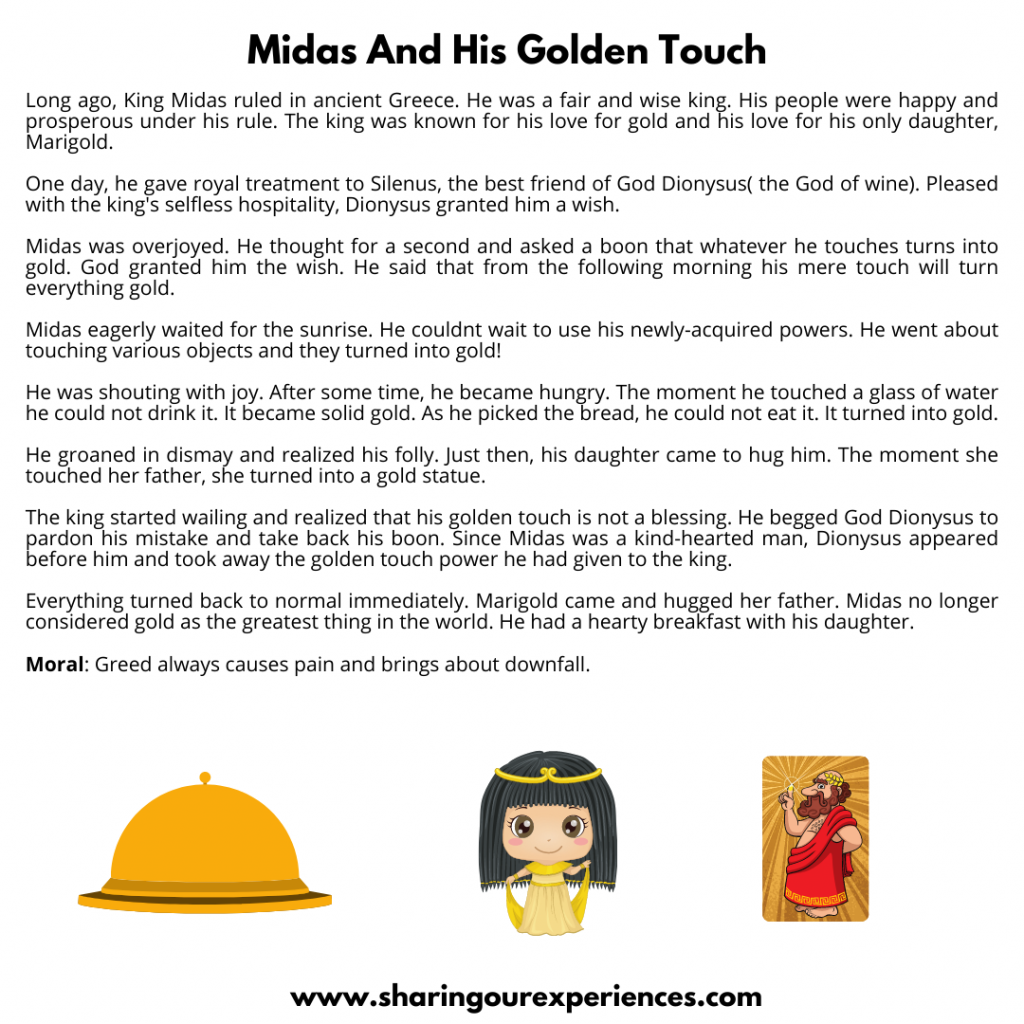
One day, a farmer named Bholaram, bought a well from his neighbor, Dharma. Dharma was a cunning man. When Bholaram went to fetch water from the well the next day, Dharma stopped him.
When asked why, he said that he had sold only the well to Bholaram, not the water. In order to use the water, Bholaram must pay for it.
Bholaram was shocked to see the cunningness of his neighbour. He took the matter to the court of Emperor Akbar. There, his minister, Birbal was given the responsibility to solve the matter.
Birbal called Dharma and asked why he was not letting Bholaram take the water from the well. To this, he replied,” I just sold the well, not the water within it. So, Bholaram has no right over the water.”
Birbal thought for a second and said, ” Since you have sold the well to the farmer, you have no right to keep your water in it. If you do so, you have to pay him the rent for using his well. Else, take out all your water immediately.
Dharma was caught off guard. He realized his cunning scheme stood no chance before the razor-sharp wit of Birbal. He apologized and went home.
Moral : Cheating can never lead to happy endings. You have to pay for your mistakes.
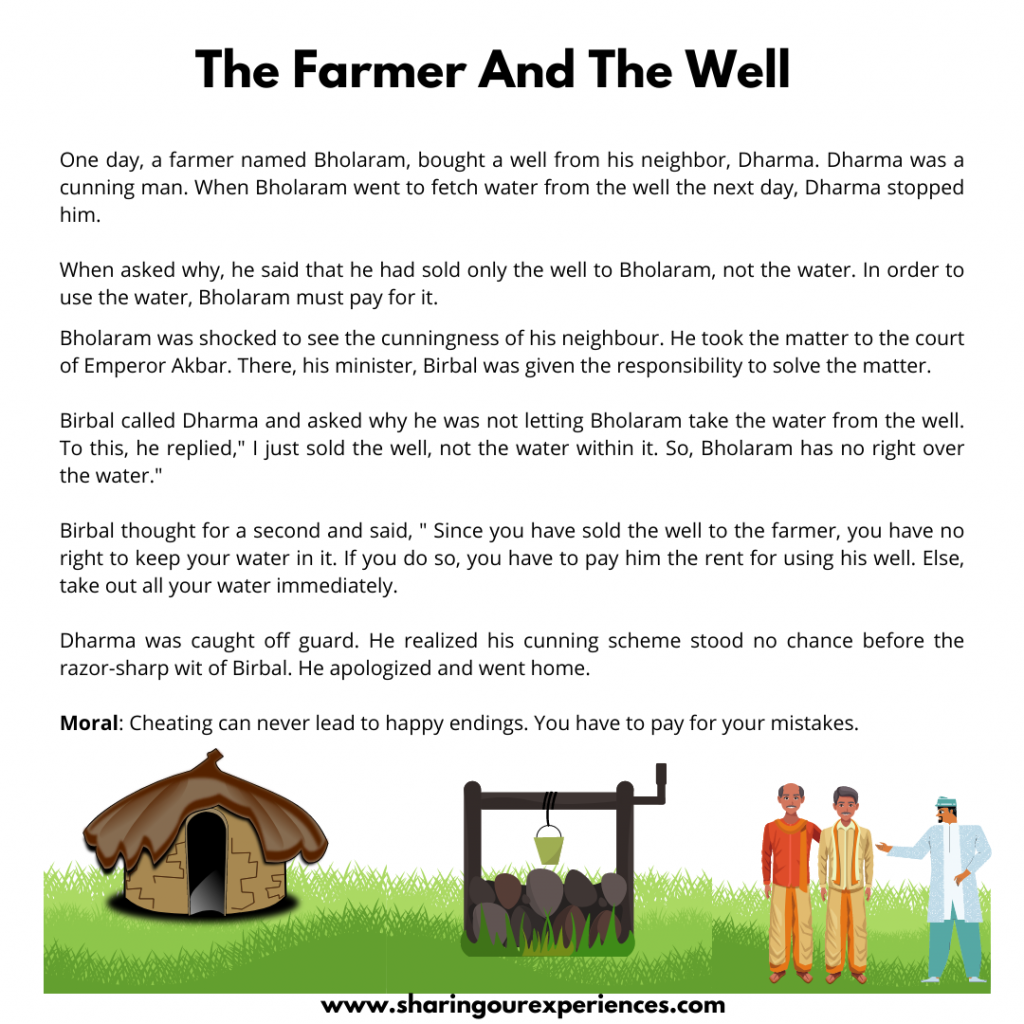
One day, a group of students were sitting in class when their teacher walked in. She had a stack of papers in her hand and began passing them out to the students.
“These are your mid-term exams,” she said. “I’ll be grading them and returning them to you tomorrow.”
The students groaned as they took their exams. They all knew that this was going to be a long night.
As the students worked on their exams, one of the boys began to cheat. He looked around the room to see if anyone was watching, and then he began to copy the answers from the student next to him.
The boy continued to cheat for a few minutes, but then he started to feel guilty. He knew that he was doing something wrong, and he didn’t want to get caught.
So, the boy stopped cheating and finished the exam on his own.
When the teacher returned the exams the next day, the boy was relieved to see that he had gotten a good grade. He had learned his lesson and realized that cheating is never the right thing to do.
Once upon a time, a wise man said that time is the most valuable thing a person can have. He was right! Just think about all the things you can do with your time: learn new things, play with friends, explore the world, help others, and so much more.
So don’t waste your time! Use it wisely, and you’ll be sure to achieve great things in life.
Another short story below,
One day, a little girl was playing in her backyard when she found a watch. She was excited to have found such a pretty thing and ran to show her mom. Her mom was very pleased and told her that she could keep the watch, but she must always remember that time is very valuable. The little girl was very happy and thanked her mom. She wore the watch all the time and made sure to be extra careful with it. Whenever she looked at the watch, she remembered her mom’s words and was reminded of how valuable time is.
Another short story about a girl below
Once upon a time there was a little girl who had a very special gift. She could make time stand still. She used her gift to help other people. She would help them finish their chores or tasks so they could have more free time. One day, she met a woman who was very sad. She had lost her husband and was having a hard time coping. The little girl used her gift to help the woman. She made time stand still so the woman could grieve and spend time with her husband’s spirit. The woman was very grateful and the little girl realized that her gift was very valuable. She used it to help others and make their lives better.
If you like this article on short stories do not forget to share it with others. Anything else we would love to hear from you, so do let us know your inputs in the comments below
Tag – short stories with moral , best English story with moral , moral value story in English , moral stories in English matter , small story in english with moral

How to Potty Train your Toddler- toilet training essentials you need to buy

80+ Heartfelt Father's Day Quotes for Father and Son
A curious mind who loves to reason and dig for facts, a part- time blogger and a full-time mother to a super active baby doll, and a mythology lover. I love to muse over anything that piques my curiosity and pen down my feelings as and when possible.

10+ Best Moral Stories for Puppet Show

50+ short folktale stories with moral lesson

Empowering Parents: 10 Lines short stories with Morals – Your Solution to Engaging and Educating Your Children
Leave a reply cancel reply.
- Free worksheets
- Early Childhood Education
- Parenting Tips
- Kids Activities and Crafts
- Money-Making and Saving tips
- Downloadable Worksheets
- Bestsellers
- Sharing our Experiences – Our Story: Get to Know Us Better
- How to earn money FAQs
- Get in Touch: Contact Us Today
- Shipping and Delivery
- Return and Refund Policy
- Privacy Policy

Easter Fun Activity Bundle

Shopping cart
ⓒ 2024 Foreword Magazine, Inc. All rights reserved.
- Book Reviews
- Short Stories
- #shortstories
Book Review
Life Is Like a Box of Chocolates
by Gabriella Harrison
The linked stories of "Life Is Like a Box of Chocolates" follow a determined girl’s coming-of-age and romantic pursuits. Dana Jetey’s novel-in-stories "Life Is Like a Box of Chocolates" follows the personal development and choices of... Read More
- #juvenilefiction
Story of the Everything, the Nothing, and Other Strange Stories
by Peter Dabbene
"Story of the Everything, the Nothing, and Other Strange Stories" is Gyula Gábor Tóth’s unusual and whimsical collection of illustrated fables. Made up of interactive, silly, and thought-provoking tales, the book includes entries... Read More
Honeymoons in Temporary Locations
The threat of climate change looms over the short stories of Ashley Shelby’s "Honeymoons in Temporary Locations", resulting in a zesty mix of humor, speculative science fiction, and melancholia. Set in a future wracked by environmental... Read More
Delinquents and Other Escape Attempts
by Joseph S. Pete
Nick Rees Gardner’s scathing short story collection captures lives of not-so-quiet desperation in the Rust Belt. These linked stories vivify Westinghouse, Ohio, an imaginary depressed Midwestern town wherein some people’s only... Read More
Prisms, Veils
by Karen Rigby
In theologian David Bentley Hart’s erudite short story collection, characters from Greek myths and literature have happenstance encounters with scholars and others. Hinting at both focused, rational ways of understanding the tangible... Read More
Balloon Theater
Concerned with interiority and the distances that exist between people, "Balloon Theater" is an evocative literary collection. In the pieces of Steve Moncada Street’s atmospheric literary collection "Balloon Theater", people strive for... Read More
Exile in Guyville
Within its compact length of six stories, Amy Lee Lillard’s collection "Exile in Guyville" packs a major punch with its hard-hitting science fiction that centers women’s perspectives. Sometimes darkly humorous and sometimes just... Read More
Of Fathers & Gods
by N.T. McQueen
Jim Roberts’s gritty short story collection Of Fathers & Gods reconciles ideas of fatherhood with faith. Told from a miscellany of viewpoints, these stories are forceful when it comes to the most challenging parts of being human.... Read More
Taking too long? Try again or cancel this request .
You are using an outdated browser. Please upgrade your browser to improve your experience.

10 Novels with Moral Dilemmas You’ll Contemplate for Days
Right and wrong, good and evil—some novels take place in worlds where the correct paths are easy to find, where the heroes are saints, and the villains are sinners. However, there’s something to be said for a good book that makes you question your foundations of thinking and consider difficult subjects. These books will have you trying to unravel your own thoughts about fairness and morality as the characters make the hard choices, confronting big ideas and even bigger consequences. So if you’re looking to be challenged by a read this month, here are ten novels sure to put your principles to the test.

Depending on where you grew up, tent revivals are nothing new, but Monica West’s REVIVAL SEASON crafts an intricate and spellbinding story around a family that runs one of these moving houses of worship. The Hortons are a complicated bunch: Father Samuel is an iron-fisted preacher, Joanne serves as both mother of three and perpetual victim of Samuel’s abuse, son Caleb is working to be more like his father, daughter Miriam narrates the story and struggles with her faith, and Hannah, the youngest child, has cerebral palsy. As they travel across the south to preach to different towns, tensions run high, and Miriam starts to wonder how a loving God could let so much suffering happen to their little family.

The daughter of one of the South’s most famous Baptist preachers discovers a shocking secret about her father that puts her at odds with both her faith and her family in this “tender and wise” (Ann Patchett, author of Commonwealth ) debut novel.
Every summer, fifteen-year-old Miriam Horton and her family pack themselves tight in their old minivan and travel through small southern towns for revival season: the time when Miriam’s father—one of the South’s most famous preachers—holds massive healing services for people desperate to be cured of ailments and disease.This summer, the revival season doesn’t go as planned, and after one service in which Reverend Horton’s healing powers are tested like never before, Miriam witnesses a shocking act of violence that shakes her belief in her father—and in her faith.
When the Hortons return home, Miriam’s confusion only grows as she discovers she might have the power to heal—even though her father and the church have always made it clear that such power is denied to women. Over the course of the next year, Miriam must decide between her faith, her family, and her newfound power that might be able to save others, but, if discovered by her father, could destroy Miriam.
Celebrating both feminism and faith, Revival Season is a story of spiritual awakening and disillusionment in a Southern, black, Evangelical community. Monica West’s transporting coming-of-age novel explores complicated family and what it means to live among the community of the faithful.
MENTIONED IN:
My Book Haul: 9 Shiny New Additions to My Shelf
By Sharon Van Meter | September 16, 2021
Editors Recommend: 10 Sizzling Reads for the Summer
By Off the Shelf Staff | July 27, 2021
By Sara Roncero-Menendez | July 13, 2021
10 Books That Celebrate Black Love, Joy, and Life
By Off the Shelf Staff | June 18, 2021
Book Club at the Beach: What My Club is Reading This Summer
By Holly Claytor | June 15, 2021

Sage Singer is a baker, who works through the night so that no one sees her scarred face and while grieving the loss of her parents. She has only a few friends, including the elderly Josef Weber from her grief support group, who is also a loyal bakery patron. When Josef opens up about a terrible secret, and asks Sage to help end his life, she has a difficult choice to make. THE STORYTELLER is a testament to Jodi Picoult’s prowess as a writer, and she has crafted a story with characters so enthralling, you’ll find it hard to put it down. Not to mention the last-minute twist that will turn the entire story on its head in the best possible way.

An astonishing novel about redemption and forgiveness from the “amazingly talented writer” ( HuffPost ) and #1 New York Times bestselling author Jodi Picoult.
Some stories live forever...
Sage Singer is a baker. She works through the night, preparing the day’s breads and pastries, trying to escape a reality of loneliness, bad memories, and the shadow of her mother’s death. When Josef Weber, an elderly man in Sage’s grief support group, begins stopping by the bakery, they strike up an unlikely friendship. Despite their differences, they see in each other the hidden scars that others can’t.
Everything changes on the day that Josef confesses a long-buried and shameful secret and asks Sage for an extraordinary favor. If she says yes, she faces not only moral repercussions, but potentially legal ones as well. With the integrity of the closest friend she’s ever had clouded, Sage begins to question the assumptions and expectations she’s made about her life and her family. In this searingly honest novel, Jodi Picoult gracefully explores the lengths to which we will go in order to keep the past from dictating the future.
Jodi Picoult Sweepstakes: Enter for a Chance to Win 7 Emotional Must-Read Novels
By Off the Shelf Staff | September 19, 2022
The 10 Most Popular Books of July
By Off the Shelf Staff | July 30, 2021
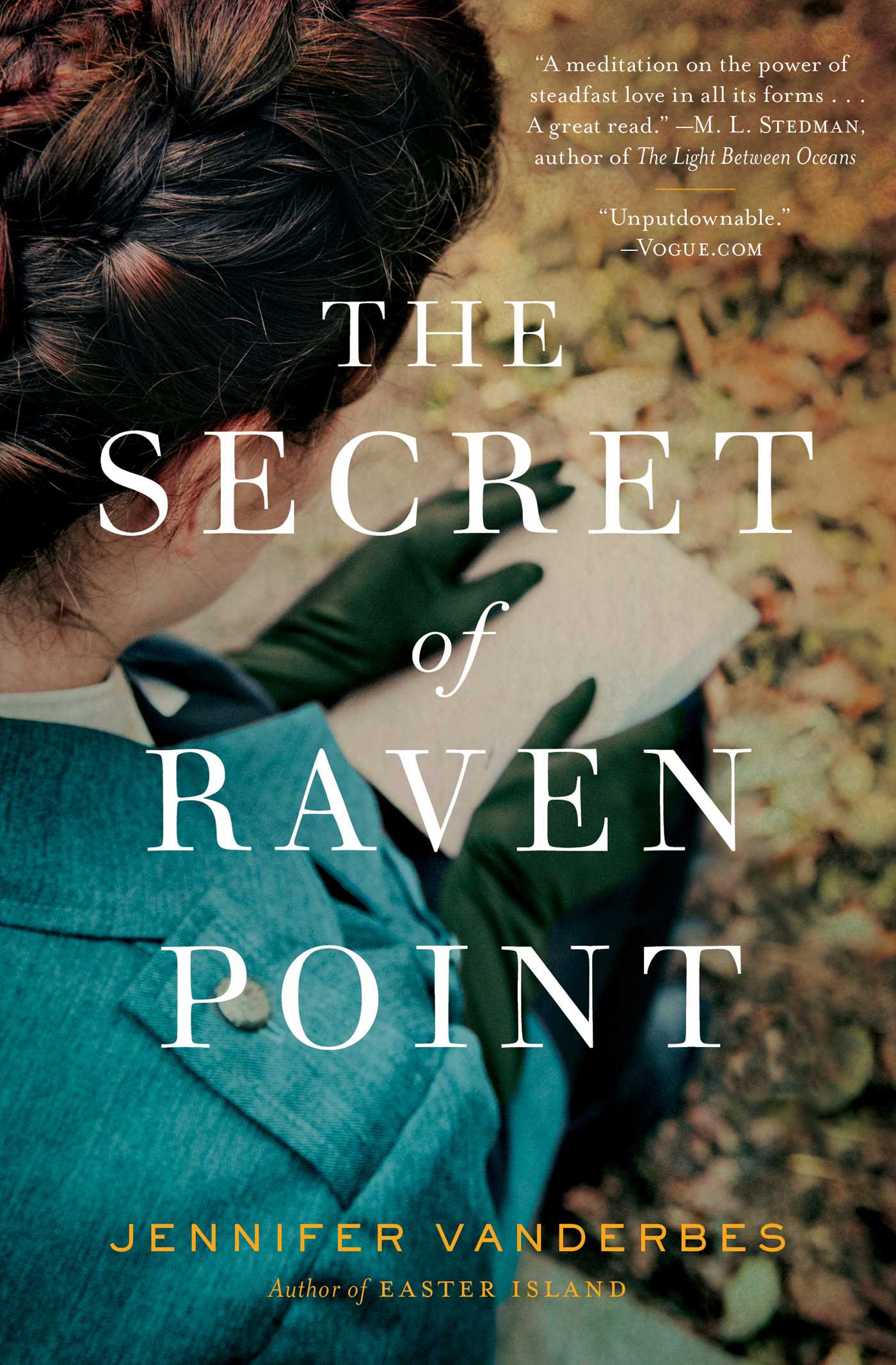
War changes all those who encounter it, which this novel explores through Juliet Dufresne. She enlists in the army during World War II and serves along the front lines to try to find her brother, who has mysteriously vanished. During her long and difficult travels, she comes across Christopher Barnaby, a catatonic soldier who might know just where her brother has disappeared to. With the help of the young psychiatrist Dr. Henry Willard, Juliet will dive into Christopher’s traumatic memories of combat, reflecting on the very nature of war itself. Dark yet heartfelt, THE SECRET OF RAVEN POINT will make you question what you would do in the face of unrelenting violence.

When seventeen-year-old Juliet Dufresne receives a cryptic letter from her enlisted brother and then discovers that he’s been reported missing in action on the Italian front, she lies about her age and travels to the front lines as an army nurse, determined to find him.
13 Books Bird Lovers Will Flock To
By Amy Hendricks | September 20, 2016
Secrets, Spies, and Sacrifice: 11 Captivating Novels About World War II
By Chris Delaney | December 3, 2015

Dhananjaya Rajaratnam, who goes by Danny, is an undocumented immigrant working in Sydney as a cleaner, slowly trying to build a better life for himself. All is going according to plan until one of his clients is brutally murdered, and he suspects one of his other clients of having perpetrated the deed. Danny’s faced with a life-altering dilemma: come forward with what he knows and get deported back to Sri Lanka, or say nothing and keep living his life with his job and girlfriend as justice goes unserved? Heartbreakingly beautiful, AMNESTY explores the challenges of being undocumented and the quandary about doing what is right within a system that consistently punishes people regardless of their character.

An “urgent and significant book [that] speaks to our times” ( The New York Times Book Review ) from the bestselling, Man Booker Prize–winning author of The White Tiger and Selection Day about a young illegal immigrant who must decide whether to report crucial information about a murder—and thereby risk deportation.
Danny—formerly Dhananjaya Rajaratnam—is an illegal immigrant in Sydney, Australia, denied refugee status after he fled from Sri Lanka. Working as a cleaner, living out of a grocery storeroom, for three years he’s been trying to create a new identity for himself. And now, with his beloved vegan girlfriend, Sonja, with his hidden accent and highlights in his hair, he is as close as he has ever come to living a normal life.
But then one morning, Danny learns a female client of his has been murdered. The deed was done with a knife, at a creek he’d been to with her before; and a jacket was left at the scene, which he believes belongs to another of his clients—a doctor with whom Danny knows the woman was having an affair. Suddenly Danny is confronted with a choice: Come forward with his knowledge about the crime and risk being deported? Or say nothing, and let justice go undone? Over the course of this day, evaluating the weight of his past, his dreams for the future, and the unpredictable, often absurd reality of living invisibly and undocumented, he must wrestle with his conscience and decide if a person without rights still has responsibilities.
“Searing and inventive,” Amnesty is a timeless and universal story that succeeds at “illuminating the courage of displaced peoples and the cruelties of those who conspire against them” ( Star Tribune , Minneapolis).
12 Heart-Stirring Books New in Paperback This February
By Alice Martin | February 15, 2021

“Stunning and relentless. This is Jaws at 35,000 feet.” —Don Winslow “ Falling is the best kind of thriller…Nonstop, totally authentic suspense.” —James Patterson “Amazing...Intense suspense, shocks and scares...Chilling.” —Lee Child “The perfect summer thriller. Relentlessly paced and unforgettable.” —Janet Evanovich
You just boarded a flight to New York.
There are one hundred and forty-three other passengers onboard.
What you don’t know is that thirty minutes before the flight your pilot’s family was kidnapped.
For his family to live, everyone on your plane must die.
The only way the family will survive is if the pilot follows his orders and crashes the plane.
Enjoy the flight.
10 Provocative Thrillers I Can’t Stop Thinking About
By Sara Roncero-Menendez | April 20, 2022
10 Debut Novels Making a Splash This Summer
By Alice Martin | July 19, 2021
Librarian Picks: 9 Delightful Books to Read Under the Summer Sky
By Carol Ann Tack | June 29, 2021
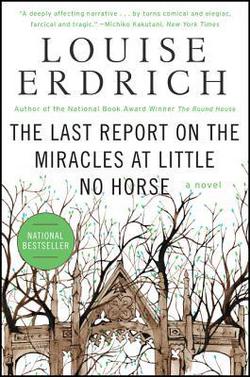
Louise Erdrich is a master of character studies and stories with complicated moral dilemmas. THE LAST REPORT ON THE MIRACLES AT LITTLE NO HORSE follows Father Damien Modeste, a priest on the Ojibwe reservation of Little No Horse. He carries a big secret: he was assigned female at birth but has been living as a man, a fact that he worries about being revealed as he approaches old age. That fear only intensifies when a troubled colleague comes to the reservation to investigate the life of the possibly false saint Sister Leopolda, who Damien knows all about. Caught between telling the truth about Leopolda and revealing himself, or lying to protect them both even though he believes she is evil, Damien confronts hard truths about himself and the world.

When the sins of your past come to haunt you, what would you do to get your life back? For Alex Meier, it means joining the CIA to infiltrate his native Berlin, a place he fled before World War II began. But from the start, Alex finds himself struggling with his new role, especially when he realizes his mission is to spy on the woman he left behind. A tale of survival, betrayal, and ever-shifting allegiances, LEAVING BERLIN is a twisty spy thriller that will have you rooting for Alex at every turn to get home, even when that means having to commit terrible crimes to get there.

New York Times Notable Book * NPR Best Books 2015 * Wall Street Journal Best Books of 2015
The acclaimed author of The Good German “deftly captures the ambience” ( The New York Times Book Review ) of postwar East Berlin in his “thought-provoking, pulse-pounding” ( Wall Street Journal) New York Times bestseller—a sweeping spy thriller about a city caught between political idealism and the harsh realities of Soviet occupation.
Berlin, 1948. Almost four years after the war’s end, the city is still in ruins, a physical wasteland and a political symbol about to rupture. In the West, a defiant, blockaded city is barely surviving on airlifted supplies; in the East, the heady early days of political reconstruction are being undermined by the murky compromises of the Cold War. Espionage, like the black market, is a fact of life. Even culture has become a battleground, with German intellectuals being lured back from exile to add credibility to the competing sectors.
Alex Meier, a young Jewish writer, fled the Nazis for America before the war. But the politics of his youth have now put him in the crosshairs of the McCarthy witch-hunts. Faced with deportation and the loss of his family, he makes a desperate bargain with the fledgling CIA: he will earn his way back to America by acting as their agent in his native Berlin. But almost from the start things go fatally wrong. A kidnapping misfires, an East German agent is killed, and Alex finds himself a wanted man. Worse, he discovers his real assignment—to spy on the woman he left behind, the only woman he has ever loved. Changing sides in Berlin is as easy as crossing a sector border. But where do we draw the lines of our moral boundaries? At betrayal? Survival? Murder? Joseph Kanon’s compelling thriller is a love story that brilliantly brings a shadowy period of history vividly to life.
November eBook Deals: 10 Absorbing Books to Be Thankful For
By Off the Shelf Staff | November 3, 2022
The 10 Most Popular Books of September
By Off the Shelf Staff | September 30, 2022
6 Historical Noir Reads with Pulse-Pounding Mysteries
By Chris Gaudio | August 22, 2022

The ties that bind us aren’t always cemented in blood. Gail and Jon Durbin have been trying for a baby, but several miscarriages and failed adoptions later, they are desperate for a child of their own. Carli is a pregnant teen who is more than willing to give her baby up to the Durbins so that she can get out of her mother’s house and go off to college and into the world. Unfortunately, Carli’s mom has other ideas after she has an encounter with the Durbins. A tale of three mothers trying to do what they think is best, OTHER PEOPLE’S CHILDREN will have you in tears, sympathizing with and hating various characters in turn and wondering what you would do with your hopes and dreams on the line.

A riveting debut novel about a couple whose dream of adopting a baby is shattered when the teenage mother reclaims her child.
What makes a family?
Gail and Jon Durbin moved to the Chicago suburbs to set up house as soon as Gail got pregnant. But then she miscarried—once, twice, three times. Determined to expand their family, the Durbins turn to adoption. When several adoptions fall through, Gail’s desire for a child overwhelms her.
Carli is a pregnant teenager from a blue-collar town nearby, with dreams of going to college and getting out of her mother’s home. When she makes the gut-wrenching decision to give her baby up for adoption, she chooses the Durbins. But Carli’s mother, Marla, has other plans for her grandbaby.
In Other People’s Children, three mothers make excruciating choices to protect their families and their dreams—choices that put them at decided odds against one another. You will root for each one of them and wonder just how far you’d go in the same situation. This riveting debut is a thoughtful exploration of love and family, and a heart-pounding page-turner you’ll find impossible to put down.
If You Love Kristin Hannah, Read These 6 Books Next
By Heather Waters | April 14, 2021
April Most Anticipated: 11 New Releases We Can’t Wait to Read
By Off the Shelf Staff | March 23, 2021
10 Debut Novels You’ll Be Delighted to Discover This Spring
By Alice Martin | March 22, 2021
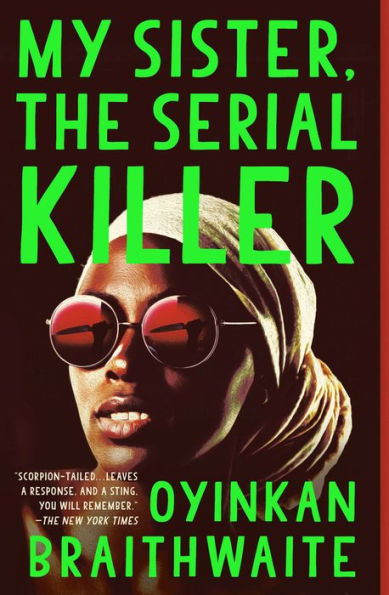
If you knew your sister was out every night, murdering men as fast as she could find them and leaving it to you to clean up the mess, what would you do? For Korede, secrecy is the key to keeping her family together and her sister, Ayoola, out of jail. However, that loyalty comes into question when Ayoola sets her sights on the doctor Korede is in love with, a doctor who’s more than a little interested in Ayoola. Mixing drama and a dark sense of humor, MY SISTER, THE SERIAL KILLER is the kind of morally gray story that asks readers to weigh the bonds of family versus one’s duty to do what’s right.

Readers’ Choice: 10 Books Sure to Spark Great Book Club Discussions
By Off the Shelf Staff | March 25, 2021
12 Utterly Captivating Novels by Nigerian Authors to Add to Your TBR
By Sarah Jane Abbott | October 2, 2020
7 Riveting Stories About Sisterhood That Perfectly Capture Its Complexity
By Holly Claytor | October 1, 2020
Solace in Solitude: 11 Refreshing Books for the Introverted Soul
By Sarah Jane Abbott | July 16, 2020
Indie Bookseller Picks: 5 Gripping Novels I Recommend to Add Some Suspense to Your Summer
By Alyssa Raymond | July 8, 2020

Each summer, the Adler family rents out their Atlantic City home to make a little extra cash, and they crowd into the small apartment above their family bakery. In the summer of 1934, Esther and Joseph house not only their daughters, Florence and Fannie, the latter of whom is in the middle of a risky pregnancy, but also a young woman from Nazi Germany. But there’s a terrible secret, one they must keep from Fannie, that leads to a web of lies that will consume the family in the sweltering summer months. FLORENCE ADLER SWIMS FOREVER highlights the bonds of family, and what people will do in order to protect the ones they love.

“The perfect summer read” ( USA TODAY ) begins with a shocking tragedy that results in three generations of the Adler family grappling with heartbreak, romance, and the weight of family secrets over the course of one summer.
*A New York Times Book Review Editors’ Choice * One of USA TODAY ’s “Best Books of 2020” * One of Good Morning America ’s “25 Novels You'll Want to Read This Summer” * One of Parade ’s “26 Best Books to Read This Summer”
Atlantic City, 1934 . Every summer, Esther and Joseph Adler rent their house out to vacationers escaping to “America’s Playground” and move into the small apartment above their bakery. Despite the cramped quarters, this is the apartment where they raised their two daughters, Fannie and Florence, and it always feels like home.
Now, Florence has returned from college, determined to spend the summer training to swim the English Channel, and Fannie, pregnant again after recently losing a baby, is on bedrest for the duration of her pregnancy. After Joseph insists they take in a mysterious young woman whom he recently helped emigrate from Nazi Germany, the apartment is bursting at the seams.
Esther only wants to keep her daughters close and safe but some matters are beyond her control: there’s Fannie’s risky pregnancy—not to mention her always-scheming husband, Isaac—and the fact that the handsome heir of a hotel notorious for its anti-Semitic policies, seems to be in love with Florence.
When tragedy strikes, Esther makes the shocking decision to hide the truth—at least until Fannie’s baby is born—and pulls the family into an elaborate web of secret-keeping and lies, bringing long-buried tensions to the surface that reveal how quickly the act of protecting those we love can turn into betrayal.
“Readers of Emma Straub and Curtis Sittenfeld will devour this richly drawn debut family saga” ( Library Journal ) that’s based on a true story and is a breathtaking portrayal of how the human spirit can endure—and even thrive—after tragedy.
8 Emotional Books That Cut Deep
By Karen Bellovich | October 18, 2023
10 Literary Beach Reads to Activate Your Vacation Mode
By Zeniya Cooley | May 24, 2023
Summer Book Club Picks: 11 Novels Guaranteed to Enliven Discussions
By Alice Martin | July 19, 2022
10 Books That Take Place Over One Magical Summer
By Alice Martin | June 20, 2022
The 12 Most Popular Books of June
By Off the Shelf Staff | June 30, 2021
Photo credit: iStock / Farknot_Architect
You must be logged in to add books to your shelf.
Please log in or sign up now.

30 BEST Moral Stories in English For Children That You Need to Know
Stories have power. If you would like to teach your children some values through moral stories in English, you have come to the right place.

If your child is old enough, it might be helpful to discuss a story in-depth after they finish reading it. Stories have power, and they can prove to be teachable moments. Moral stories such as the popular thirsty crow story or the greedy dog story in English can teach our kids important life lessons. These discussions also offer an opportunity for you to bond with your kids.
How Moral Stories Benefit Kids
There are plenty of moral stories in English rich with benefits for kids. They activate your child’s imagination, entertain them, and make them happy. Short moral stories are ideal for maintaining their attention and keeping them focused during the entire story.
However, the best moral stories in English teach your children universal truths. Reading the same moral stories to them repetitively will help them to familiarise themselves with the story and its moral lesson. The best part about moral stories is that they can teach your kid life lessons in a fun and easy way.
Short moral stories for kids are the best way to teach valuable life lessons to kids. It is a fun and easy way through which children can understand complex concepts. Short stories work well as they’re just long enough for your child to concentrate.
Moral Stories for Kids
1. the boy who cried wolf.
There once was a boy who grew bored while watching over the village sheep. He wanted to make things more exciting. So, he yelled out that he saw a wolf chasing the sheep. All the villagers came running to drive the wolf away. However, they saw no wolf. The boy was amused, but the villagers were not. They told him not to do it again. Shortly after, he repeated this antic. The villagers came running again, only to find that he was lying. Later that day, the boy really sees a wolf sneaking amongst the flock. He jumped up and called out for help. But no one came this time because they thought he was still joking around. At sunset, the villagers looked for the boy. He had not returned with their sheep. They found him crying. He told them that there really was a wolf, and the entire flock was gone. An old man came to comfort him and told him that nobody would believe a liar even when they are being honest.
Moral : Lying breaks trust.

DHA Brain Health Gummies
Looking for a tasty and healthy way to support your child's brain development? Look no further than Little Joys DHA Brain Health Gummies ! These gummies are packed with essential nutrients like DHA and choline, which boost memory✅, concentration✅, and overall brain health. ✅
With four delicious fruits and veggies and zero added sugar , they're a treat that both parents and kids can feel good about. So why wait? Give your child's brain the boost it needs!🔥
2. The Golden Touch
The Greek king Midas did a good deed for a Satyr. This prompted Dionysus, the god of wine, to grant him a wish. Midas asked for everything he touched to turn to gold. Dionysus’ warned him not to do so, but Midas could not be swayed. Midas excitedly started touching everything and turning them into gold. Soon, he became hungry. But he couldn’t eat anything because even his food turned to gold. His beloved daughter saw him in distress and ran to hug him. However, she, too, turned to gold. He realised then the golden touch was not a blessing.
Moral : Greed leads one to downfall.
3. The Fox and the Grapes
A hungry fox once looked everywhere for food. He couldn’t find anything until he stumbled upon a farmer’s wall. He saw big, purple, juicy grapes. He jumped as high as possible to reach the grapes. No matter how many times he tried, he failed. Finally, he gave up and went home, thinking to himself that the grapes must have been sour anyway.
Moral : Nothing comes easy, do not hate what you can’t have.
4. The Proud Rose
In the desert existed a rose and a cactus. The beautiful rose would take every opportunity to insult the cactus. The other plants tried to defend the cactus, but the rose was too obsessed with its own looks. There was no water during a particularly hot summer. The rose started to wither away. But the cactus had become a source of water for sparrows. The rose asked the cactus for water, and the nice cactus readily agreed.
Moral : Never judge someone according to how they look.
5. The Milkmaid and Her Pail
Molly, the milkmaid’s job was to milk the cows and sell the milk at the market. She started thinking about the things she would spend her money on. While walking to the market, she spotted a chicken and thought that she could earn more money by buying a chicken and selling its eggs. She started to think how jealous she could make the other milkmaid with all the things she could buy from the milk and egg money. She started to skip in excitement, and soon the milk spilled over. She went home with empty pails and no money. Her mother then reminds her that she shouldn’t count her chicken until they hatch.
Moral : Do not depend on something until you are sure it will happen.
6. A Wise Old Owl
An old owl would observe incidents happening around his oak tree every day. The more things he saw, the less he would speak. He heard people talking and sharing stories as well. The old owl had seen so much and heard all kinds of stories. All of these experiences helped the owl to become wiser day by day.
Moral : Talk less and be more observant.
7. The Golden Egg
A farmer had a goose that laid one golden egg a day. He would sell the golden eggs, and they enjoyed a comfortable life. However, the farmer became greedy and wanted more than one egg a day. His wife foolishly agreed to his idea. The next day the farmer cut open the goose after it laid the golden egg. He could only find blood and guts. He realised his mistake. He now had no source of income, and the couple became poorer every day.
Moral : Think before you act.

Brain Health Kit
Looking for an all-in-one solution to support your child's brain development? Little Joys has got you covered with their Brain Health Kit ! Enriched with DHA, an essential nutrient for brain development, this kit combines the goodness of DHA Brain Gummies and NutriMix Gummies. 🔥
With a delicious chocolate flavor✅ and gummy format✅, your kids will ask for more on their own - no more fussy pills ❌ or bitter syrups! ❌ Give your child the brain-boosting nutrients they need in a fun and tasty way! 😋
8. The Farmer and the Well
A farmer bought a well from his neighbour to water his farm. The neighbour sold him the well but did not allow him to draw water from it. The farmer went to the emperor for justice. His courtier questioned the neighbour, who said that he had sold the well but not the water within it. The neighbour was told to either pay rent for the water to remove it all immediately. Realising that his trick didn’t work, he apologised and went home.
Moral : Cheating will get you nowhere.
9. Elephant and Friends
A lonely elephant was looking for friends in the forest. The monkey declined to be the elephant’s friend because the elephant could not swing in the trees. The rabbit turned the elephant because it was too big to fit in the burrow. The frog refused to be the elephant’s friend because it could not jump. Every other animal said no to the poor elephant. The next day, all the animals in the forest were running away in fear. The elephant stopped a bear who said that the tiger was attacking them all. The elephant nicely asked the tiger to stop, but the tiger told the elephant to stay out of the way. The elephant proceeded to kick the tiger and scare it away. The other animals then realised that the elephant was the perfect size to be their friend.
Moral : Friends can be any shape or size.
10. When Adversity Knocks
There once was a girl who was frustrated with life and asked her father for advice. He asked her to bring an egg, two tea leaves, and a potato. He then started boiling water in three separate vessels. He put the egg, potato, and tea leaves in one vessel each. After a few minutes, he asked her to peel the egg and potato and strain the leaves. He explained to his daughter that:
- The soft egg was now hard.
- The hard potato was now soft.
- The tea had changed the water itself.
When adversity is at our door, we can respond to it in different ways.
Moral : We decide how to respond to difficult situations.
11. The Needle Tree
There were two brothers; the older one was always mean to the younger one. The older one would chop firewood in the forest and sell it in the market. One day, he stumbled across a magical tree. The tree begged him not to cut him down and promised him golden apples in exchange. The older brother felt disappointed with the number of apples he received. He decided to cut down the tree anyway, but the tree showered him with hundreds of needles. The boy was left lying on the forest ground in pain. His younger brother finally found him and carefully took out every needle. The older brother finally apologised for treating his brother badly. The magical tree saw this exchange. It decided to give them more golden apples.
Moral : Kindness will always be rewarded.
12. A Glass of Milk
There was a poor boy who would sell newspapers to pay for school. One day, he was ravenous and decided to ask for food at the next house he visited. Several people denied him food. However, a girl at one house offered him a glass of milk. She refused to take payment for it. After many years, this girl fell sick. No doctor wanted to help her. She decided to go to the best doctor in the town. The doctor spent months treating her, though she could not afford the service. When she received the hospital bill, it read ‘Paid in full, with a glass of milk.’
Moral : Good deeds are always rewarded.
13. The Ants and the Grasshopper
A family of ants was drying out the grain they had stored during the summer. A hungry grasshopper comes to them and asks for some food. They asked him why he had not saved any food for the winter. The grasshopper said he was too busy making music during the summer that he didn’t save any food. The ants had no sympathy for the grasshopper and went back to work. Can you guess the ant and grasshopper story moral?
Moral : There’s a time to work and a time to play.
14. The Bundle of Sticks
An old man had three sons. They were hard workers but always fought. He could never unite them. He then fell ill and asked his sons to unite. They paid him no heed. He decided to teach them a lesson to set aside their differences. He gave them a bundle of sticks and told them to break it into two. Whoever finishes first would win. They quickly did this and started fighting again. He then gave them another bundle of sticks and told them to break it as a bundle and not separately. Despite their best efforts, they could not do it. He told them it was easy to break the sticks individually. But if you stay united, no one can hurt you. They finally understood the value of unity.
Moral : There’s strength in unity.
15. The Bear and the Two Friends
Two friends were walking through the forest. Since it was dangerous, they promised to stay close to each other. They see a bear approaching them. One friend scurries up a tree, leaving the other one behind. The other friend decided to pretend to be dead. The bear approached him, smelled his ear and then left. The friend in the tree climbed down and asked the other friend what the bear had told him. He replies, “The bear simply advised against believing a false friend.”
Moral : True friends stick with you through all situations.
16. The Miser and His Gold
Once, there was a miser who would hide all his gold under the stones in his garden. He never spent his gold, and without fail, he would count his coins before going to bed every day. One day a thief spotted him counting his coins. After the miser went to sleep, the thief stole all the gold. The next day, the miser saw that all his gold was missing and started wailing. His neighbours came running and asked him what had happened. The neighbours asked him why he didn’t keep the gold in the house since it would be easy to access inside. The mise revealed he never planned on spending the gold. The neighbours told him he might as well save his stones, as the unused gold was just as useless.
Moral : A possession is important only if you use it.
17. The Dog At the Well
On a farm lived a mother dog and her pups. The mother dog warned her pups to never play near the well. However, one curious puppy decided to peek over the well. He saw his own reflection in the well and assumed it was another dog. He started barking at his reflection as he thought the other dog was imitating him. He jumped into the well to fight the other puppy, only to realise that there was no other puppy. He kept on barking till the farmer came and saved him. The puppy never went back to the well again.
Moral : Heed the warnings of those who are wiser.
18. Controlling Anger
There was a young boy who could not control his anger. He would say whatever came to his mind, even if it hurts people. His father asked him to hammer in a nail in the backyard fence whenever he got angry. In the beginning, he used up a lot of nails. But as time went by, he started using less. The father then asked him to start removing a nail each day; he didn’t get angry. When he removed all the nails, the father asked him to see the holes in the fence. He reminded him that the fence would never be the same. Likewise, the things he had said to people could never be erased.
Moral : Anger leaves scars on people.
19. The Leap at Rhodes
There was a man who used to travel to foreign lands. He would only talk about his adventures and deeds. He claimed he had made a great leap in a city called Rhodes. He bragged about it to no end. One listener told him to prove it physically, and he could not.
Moral : It is the deed that counts.
20. The Wolf and the Sheep
There was a wolf who got injured while fighting a bear. He wasn’t able to get himself food or water. One day a sheep passed by him. He asked the sheep to get him water, so he had the strength to get solid food. The sheep quickly realised he was the solid food, said he would not get the wolf any water, and went away.
Moral : You can spot a person’s ulterior motives if you pay attention.
21. The Tortoise And The Bird
A tortoise was resting under a tree. On this tree, a bird had built its nest. The tortoise mocked the bird for having a home built with broken twigs, which it had to build itself. He bragged about his own shell and said the bird must be jealous. The bird told the tortoise that its nest might be shabby, but it had space for its friends and family. At the same time, the tortoise’s shell could never accommodate anyone else except the tortoise himself.
Moral : A crowded hut is better than a lonely mansion.
22. The Cows And The Tiger
Four cows lived in a forest. They were good friends who did everything together. No other predators were able to kill them for food. One day, they fought and decided to graze in different directions. A tiger saw this and decided it would be easy to kill them now. The tiger hid in a bush and killed the cows one by one.
Moral : There is strength in numbers.
23. The Four Students
Four friends who hated studying partied all night before their exams. They asked the Dean to give them a second chance by lying about their whereabouts. They told the Dean they had gone to a wedding the night before, and on their way back, they had a flat tire, requiring them to push the car all the way back. The Dean agreed to let them take the test again. They studied hard for the exam. On the exam day, they were made to sit in separate classrooms and were given only two questions:
- Which tire of the car burst: a) Front Left b) Front right c) Rear left d) Rear right
Moral : You may be smart, but there are smarter people than you.
24. The Stork and the Crab
There once was an old stork who could not catch fish anymore. As he grew hungrier, he devised a plan. He told the fish in the tank that the farmers would soon empty out the tank and grow crops there. He offered to take the distressed fish to a bigger tank further away. The fish happily agreed, but the stork would take them to a rock and kill them. There was also a crab in the tank who wished to be saved. The stork, thinking he could try some new food, agreed to take him. However, the crab quickly noticed the fish bones on the rock. He immediately dug his claws into the stork’s neck and killed him. He then went back to the old tank and informed the other fish.
Moral : A sharp mind is your greatest strength.
25. The Camel And The Baby
A baby camel once asked her mother why they had humps, round hooves, and long eyelashes. The mother explained that the humps could store water, the rounded hooves were to help them walk through the desert, and the long eyelashes protected their eyes from sand. The baby thought over this and then asked her mother if they have all these qualities for the desert, why are they in a zoo? The mother was dumbfounded.
Moral : Your strengths and skills are of no use in the wrong place.
26. The Rabbit and the Partridge
A partridge could not find food near its home, so it travelled far away to some cornfields. It stayed there for a few days before returning home. Meanwhile, a rabbit had found the empty nest and made itself at home. When the partridge returned, they both fought over whose house it was. The other animals suggested going to a judge. They found a praying cat by the river and decided to ask for help. Seeing how the cat was praying, they trusted it. The cat heard them both out but asked them to come closer as he couldn’t hear well. When they got closer, the cat killed and ate them both.
Moral : Don’t trust strangers no matter how friendly they seem.
27. The Wolf And The Shepherds
One day a wolf was chased away for trying to steal some sheep from a farm. Later that week, the wolf returned to the farm, hoping to find food. He found that the farmer’s family was eating lamb roast. He was dismayed that he was chased off for wanting the same thing the farmer’s family had done.
Moral : We are quick to condemn others without realising our own faults.
28. The Young Crab And His Mother
One day, a young crab was trying to move. But, he could only move sideways. The mother admonishes him and tells him to walk forward by pointing his toes out front. The young crab says he doesn’t know how, so the mother gets up to show him. However, she cannot walk forward either. She realises how unfair she was being and apologises to him.
Moral : Do not condemn others for what you cannot do yourself.
29. The Other Side Of The Wall
There was a young woman who was fond of gardening. She took great care of her garden. One day she found a plant in a catalogue and decided she wanted to plant it. She planted it at the base of the stonewall in her garden. It quickly grew, but no flowers bloomed on the tree. She thought she would cut it down, but her neighbour called her and thanked her for the beautiful flowers blooming on its vines. She rushes over and realises that the vine had crept through the crevices of the stonewall. The flowers had bloomed generously on the other side.
Moral : You may not see the results, but that doesn’t mean your efforts bore no fruit.
30. The Wet Pants
There was once a young boy in school. He had wet his pants and was scared that his class would make fun of him. He noticed that the teacher and a classmate were walking towards him with a goldfish bowl. The young girl trips and drops the fishbowl in his lap. The rest of the classmates think it is her fault for wetting his pants. Later, he asks her if she did that on purpose. She tells him, “I wet my pants once too.”
Moral : We all have good and bad days. Your true friends will help you out.
Tips on Making Storytime Interesting for Your Kids
While moral stories in English are important to share with your kids, it matters how you narrate them. To make the story less preachy and more engaging and fun for them, here is how you can do it:
- Read the story out in creative ways . You can adapt the persona of a character to catch their interest. You can use different voices for different characters or act out the scenes. Bringing life to the characters and acting out the different parts of the story will make the story fun and memorable for your child.
- If you are reading out from a book or using pictures, keep it in front of your kids . You can ask them to help you turn pages or to trace the words you are reading. This is a great way to bond while reading moral stories in English.
- After you finish reciting the story, discuss it with your children . You can ask them questions and discuss the moral at the end. This will help you to know if your child has picked up on the moral of the story. Asking them questions will also keep them engaged and promote their speech development. You can even share your own perspectives and explain the meaning to them. This can help them build their vocabulary.
- Ask your child to read along with you . You can both read the story aloud. This will encourage them to develop a reading habit while improving their reading skills.
- Take the story outside . You don’t necessarily need to sit at home or in their bedroom to read out a story. You can read it in the park, a garden, the terrace, or any outside space. This will give more depth to the story and make your kid enjoy it even more.
- Read the story at different times of the day and not just at bedtime. This will help you understand their attention span. If you know when they have the strongest attention span, you can read stories at that time.
Summing up on Moral Stories for Kids
Young children will learn about the world around them. They spend their childhood picking up social cues. They can become kinder individuals when you read different types of friendship moral stories in English to them . There are tons of moral stories in English you can find which will help their personality development. Take some time out in the day to spend with your child and read them these valuable moral stories in English.
Click Here To Read Our Other Similar Blogs
14 Easy & Fun Brain Exercises for Kids That You Need to Know!
45 Fun Animal Riddles With Answers for Kids for Brain Development
Cavities in Kids - Causes, Treatment, Prevention & More
How to Increase Brain Power of Child ~ Pediatrician Recommended
Related Articles

30 Best Indoor Games for Kids To Keep Them Hooked, Fit & Energetic


20 Best Popular Fairy Tale Stories in English That Your Kid Will Love

Top 22 Best Outdoor Games List in India for Kids That You Didn't Know

Is Maltodextrin Safe For Your Children- Doctor’s Recommendation

20 Moral Values for Kids That You Should Teach Them At An Early Stage

Top Doctors That Your Child Needs That You Didn't Know

Better2Learn.com
Knowledge Has No Limits
25+ Best Moral Stories In English For Kids & Students
Here are 25+ Best Moral Stories In English For Kids & Students. Moral stories have been an integral part of every culture since time immemorial, resonating with people of all ages across generations. Through inspirational narratives, these stories give valuable lessons and principles that shape our character and help us discern right from wrong.
This article aims to compile a collection of heartwarming Moral Stories in English, each weaving its tale of morality and wisdom. Let us dive into the world of these timeless stories and draw insights that can enrich our lives. So, make sure to try all of them.
Moral Stories In English:
Moral stories often contain a message or a moral that imparts valuable lessons about honesty, kindness, perseverance, and other virtues. These stories present scenarios and characters that children and adults can relate to, allowing them to understand and learn from the experiences of others. We have collected more than 25+ Moral Stories In English .
Short Moral Stories In English:

Short moral stories in English are stunning stories that convey a valuable lesson or moral. These stories are powerful tools to teach readers, especially children, essential values and ethics engagingly and entertainingly. They often feature relatable characters and situations that readers can easily connect with. Below there are 10+ examples of Short Moral Stories In English to explore.
1. The Little Ant and the Rubber Tree:
Once, there was a little ant who wanted to climb a tall rubber tree. With determination, the ant kept trying, refusing to give up. Despite challenges and setbacks, it persevered and eventually reached the top. The ant’s never-give-up attitude taught us the importance of resilience and determination in achieving our goals.
2. The Boy and the Starfish:
One day, a boy was walking on the beach when he noticed thousands of starfish stranded on the shore. He began picking them up and throwing them back into the sea, one by one. A stranger passing by asked, “Why waste your time? There are too many. You can’t make a difference.” Smiling, the boy replied, “I made a difference to that one!” This reminds us that even small acts of kindness can significantly impact someone’s life.
3. The Greedy Lion:
In a lush jungle, a proud lion kept all the prey to himself, refusing to share with others. However, as time passed, the lion grew lonely and unhappy. The other animals had left due to his greed. Realizing the consequence of his actions, the lion learned the importance of sharing and friendly coexistence.
4. The Persistent Tortoise:
A racing competition was held between a fast rabbit and a slow tortoise. Many laughed at the tortoise, mocking its chances of winning. The race began, and the rabbit zoomed ahead, confident of victory. Unexpectedly, the rabbit got tired and decided to take a nap. The persistent tortoise kept going, slowly but steadily. When the rabbit woke up, it found the tortoise crossing the finish line.
5. The Greedy Monkey:
In a lush forest, a hungry monkey spotted a bunch of bananas hanging from a tree. Full of greed, it reached for all the bananas, filling its hands. But its hands were now too big to come out of the small gap. The monkey’s greed trapped it, unable to move or eat the bananas.
6. The Generous Gardener:
In a village, a skilled gardener toiled and nurtured beautiful flowers. One day, he decided to share some of his flowers with others. This act of kindness spread happiness throughout the village. People admired the gardener’s humility and the vivid hues of the blossoms. Inspired by his generosity, villagers also started helping each other selflessly. The gardener’s simple act of sharing taught everyone the incredible joy that comes from giving and caring for others.
7. Time is Precious:
In a small village, there lived a hardworking farmer named Raj. One day, he found a magical pocket watch. It could stop time at his command. Overwhelmed by the possibilities, Raj used it carelessly, wasting precious hours. Realizing his mistake, he decided to use the watch wisely. He started helping others, using his extra time for good deeds. Raj learned that time is invaluable and should always be well-spent.
8. The Honest Woodcutter:
Deep in the forest, an honest woodcutter accidentally dropped his axe into a river. A magical fairy emerged, offering to retrieve his axe or a golden one instead. The woodcutter chose his plain axe. Impressed by his honesty, the fairy rewarded him by retrieving his axe and gifting him the golden one. The woodcutter’s honesty brought him more excellent fortune and happiness, proving that integrity is always rewarded in the long run.
9. The Kind Sparrow:
In a busy city surrounded by tall buildings, a young girl named Lily noticed a wounded sparrow on the sidewalk. She gently placed it in a shoebox and took it home, nursing it back to health. Once recovered, the sparrow flew away, but not for long. Every day, it came back to Lily’s windowsill, chirping joyfully. The little sparrow’s unwavering friendship reminded Lily that acts of compassion and kindness are always reciprocated.
Moral: Kindness Never Goes Unnoticed.
10. The Enchanted Mirror:
Once there was a village where an enchanted mirror possessed the power to reveal the truth. People lined up to see their reflections, hoping only to see what they desired. But those who feared the truth shattered the mirror, never realizing the opportunity for growth and self-improvement.
Moral Stories For Kids In English:
This is the section about Moral Stories For Kids In English . Here are 5+ stories to explore.
1. The Lion and the Mouse:
Once, a mighty lion spared the life of a tiny mouse. Later, the mouse came to the lion’s help, biting through the ropes that trapped him. The lion learned that an act of kindness, no matter how small, can be repaid when needed.
2. The Wise Old Owl:
In a forest, a group of birds was mesmerized by the elegant feathers of the peacock. Each bird expressed their admiration, except for the wise owl who said, “Feathers may be beautiful, but it is wisdom that truly matters.”
3. The Clever Fox and the Grapes:
Once, a fox spotted a juicy grapevine hanging from a tree. Determined to enjoy the grapes, he jumped again and again but couldn’t reach them. Exhausted, the fox reluctantly gave up, saying, “Those grapes were probably sour anyway.”
4. The Wise Old Oak:
In a dense forest, a wise old oak tree named Oliver stood tall. Every day, animals gathered around Oliver, seeking advice. One stormy night, a group of frightened animals took shelter under Oliver’s sturdy branches.
5. The Curious Cat:
Once upon a time, there was a curious cat named Whiskers. One sunny day, Whiskers spotted a shiny object by the window. Ignoring their owner’s warnings, they jumped onto the shelf and knocked over a precious vase.
Friendship Moral Stories In English:
These specific section is about Friendship Moral Stories In English . Here are 5 examples to practice.
1. The Loyal Companions:
Once upon a time, in a dense forest, there lived a clever rabbit named Ruby and a wise tortoise named Toby. Despite their differences, they became the best of friends. One day, a colossal storm hit their forest, and Ruby’s burrow was flooded. Sensing danger, Toby carried Ruby on his back and found a new home. They realized that friendship is not about similarities but about supporting and caring for each other.
2. The Bracelet of Unity:
In a small town, three friends, Lily, Emma, and Sarah, found a magical bracelet. It had a secret power: when worn together, it granted extraordinary strength. Tempted by its power, they disagreed on who should possess it. Realizing their bond was more incredible, they decided to share the bracelet. United, they protected their town from evil. They learned that friendship is stronger when shared, and its power lies in sticking together through thick and thin.
3. The Caring Tree:
Once upon a time, in a dense forest, stood a mighty tree. Its branches offered shade and shelter to all the creatures in need. One day, a small bird took refuge in a tree during a storm. Grateful for its help, the bird returned the favor by picking off parasites from the tree’s leaves. Soon, more animals joined them, forming a beautiful friendship. The tree’s kindness created a community filled with joy and harmony.
4. The Ripple Effect of Friendship:
Once, two friends walked by a river. The first friend saw a drowning butterfly and saved it. Grateful, the butterfly granted them both a wish. The first friend wished for riches, while the second friend asked for kindness to spread.
5. Honesty is Essential:
In search of amusement, a mischievous boy repeatedly cried, “Wolf!” to fool the villagers. When a real wolf finally attacked his flock, the boy shouted for help. However, thinking it was another prank, nobody came to his rescue.
Small Moral Stories In English:
This section is for Small Moral Stories In English . Make sure to explore all of them.
1. The Power of Dreams:
A young girl planted magical seeds and watered them with love and hope. The seeds grew into beautiful flowers that spread joy and happiness. She realized that dreams have the power to make the world a better place.
2. The Value of Honesty:
A boy found a key but couldn’t find its owner. He gave it to a friend, claiming he found it. Later, he discovered the key was his father’s. The boy learned honesty is always the best policy.
4. The Beauty of Diversity:
Colors in the rainbow argued over who was the most important. To teach them a lesson, the rainbow disappeared, and the world seemed dull. They learned that each color contributes to the world’s beauty and diversity.
5. Being Content with Who You Are:
A frog saw an ox and wished to be as significant. The magical fairy granted its wish. But when the frog saw its reflection in the pond, it was disappointed. I realized that wanting to be someone else was pointless.
6. The Consequences of Greed:
A squirrel collected more acorns than needed, leaving none for other animals. When winter came, the acorns spoiled, and the squirrel faced starvation. I learned the importance of sharing and not being greedy.
7. The Rainbow Fish:
A beautiful fish had sparkling scales. Other fish admired its beauty but felt left out. The rainbow fish shared its rankings, making everyone happy. I realized that true happiness lies in sharing and caring for others.
The Power of Moral Stories:
- Moral stories have the power to teach important life lessons.
- Moral stories can inspire and motivate.
- They encourage critical thinking and decision-making skills
- Moral stories promote ethical behavior.
- These stories can help individuals process emotions, find hope, and heal emotional wounds.
- By reading or listening to these stories, individuals can develop empathy and a better understanding of different perspectives, cultures, and values.
Overall, the power of moral stories lies in their ability to educate, inspire, and shape individuals’ values and behavior.
Conclusion:
Moral stories in English carry tremendous significance, offering timeless wisdom and valuable life lessons. From character development to teaching important values, these stories continue to play a vital role in molding individuals of all ages. By embracing moral stories and their profound impact, we can nurture compassion, understanding, and moral integrity, ultimately creating a better society for future generations.
Share this:
Related post, 20+ best short moral stories in hindi for class 1, 7+ best short motivational story in hindi | नई प्रेरणादायक कहानियाँ, 15+ best daravni bhootni ki kahani hindi mein, leave a reply cancel reply.
Your email address will not be published. Required fields are marked *
Save my name, email, and website in this browser for the next time I comment.
Notify me of follow-up comments by email.
Notify me of new posts by email.
Best Pronoun Worksheet for Class 2 with Answers & PDF | 5 Sets
Chandrayaan 3 essay in english | best 10 lines, 150, 250 & 500 words essay on chandrayaan-3, 5 best my family essay for class 1.

Learn and Grow
32 Moral Stories in English That Will Touch Your Heart
By Caitriona Maria
October 2, 2022
Disclosure: This article may contain affiliate links, meaning that when you make a purchase, I earn a small commission. Affiliate links cost you nothing to use and help keep my content free. For more info, see the Disclosure Policy.
There is a reason why moral stories have been around for centuries. They teach us a lot about life and remind us of what is truly important.
Today we will share 32 moral stories in English that will inspire your child to be a better person. These stories will surely warm their hearts and make them think about the world in a new way.
These stories deal with different aspects of life, such as love, family, friendship, and more. We hope you enjoy them!
Screen time you feel good about? Build reading, math, creativity, and thinking skills with Homer. Increase Early Reading Scores by 74% in children aged 2-8, all while having fun! Try it free for 30 days.
Moral Stories in English
1. the lion and the mouse.
Moral: Kindness is never wasted.
A well-known fable by Aesop is “The Lion and The Mouse.” This story is about a lion who spared the life of a mouse. The mouse then returns the favor by helping the lion when he is in danger. This story shows us that life is full of surprises, and kind deeds get rewarded.
Read the short version.
2. The Ant and the Grasshopper
Moral: There is a time for work and a time for play.
“The Ant and the Grasshopper” is another popular moral story. This tale is about a grasshopper who spends his days singing and playing instead of preparing for winter. The ant works hard all summer to store up food. When winter comes, the grasshopper has nothing to eat, while the ant is warm and well-fed. This story teaches us the importance of hard work and planning ahead.
3. The Boy Who Cried Wolf
Moral: Liars aren’t believed even when they tell the truth.
“The Boy Who Cried Wolf” is a classic story that has been around for centuries. This story is about a shepherd boy who tricks the villagers by crying “wolf” when there is no danger. The villagers eventually get tired of his games and don’t believe him when he cries “wolf” for real. This story teaches us the importance of telling the truth.
4. The Hare and the Tortoise
Moral: You can be more successful by doing things slowly and steadily rather than quickly and carelessly.
The fable is about a hare who mocks a tortoise for being slow. The tortoise then challenges the hare to a race. The hare runs fast at first but then takes a nap in the middle of the race. The tortoise slowly but surely passes the hare and wins the race. Slow and steady wins the race!
5. The Blue Jackal
Moral: Don’t be too greedy.
“The Blue Jackal” is a moral story about a jackal that jumps into a large pool of blue dye. When he returned to the jungle, all the animals were confused to see such a strange-looking animal. Then he had a clever idea. He pretended that he was sent there by the creator of the universe and announced himself as king. Everyone believed him until they soon later figured out he was just a jackal.
6. The Goose and the Golden Egg
Moral: Those who have plenty want more and so lose all they have.
In the tale “The Goose and the Golden Egg,” a farmer finds a golden goose. He is so excited about his new discovery that he kills the goose to get all the gold. However, when he opens up the goose, he finds that it is just like any other goose. This story teaches us that greed does not pay off in the end.
7. A Wise Old Owl
Moral: When you speak less and listen more, you become wiser and smarter
“A Wise Old Owl” teaches us about being wise and the virtue of silence. The story is about an owl who is wise and hears many things. He spoke less and less and heard more and more. This is available as both a nursery rhyme and a moral story.
8. Jack and the Beanstalk
Moral: Take advantage of the opportunities life provides for you.
“Jack and the Beanstalk” is a classic moral story passed down for generations. In this tale, Jack trades his cow for some magic beans. His mother is very angry with him but decides to plant the beans anyway. The following day, Jack wakes up to find a giant beanstalk growing outside his window. He climbs the beanstalk and finds a giant’s castle in the clouds.
Read it here.
9. The Ugly Duckling
Moral: Don’t judge a person by outward appearance.
“The Ugly Duckling” is a celebrated Hans Christian Andersen story that teaches us about inner beauty. In this tale, an ugly duckling is born into a family of beautiful ducks. The other ducks make fun of him, and he feels very alone. He eventually grows up to be a beautiful swan. This story teaches us what ‘s on the inside counts and raises questions about bullying and discrimination.
10. The Brahim’s Dream
Moral: Do not build castles in the air.
In the tale, a man called Brahim receives so much rice and is so happy he can’t keep his eyes off the bowl. That night, he has a dream in which he trades rice for money, and a series of events lead to him becoming a wealthy farmer and having his own wife and son. When he wakes up, he realizes that it is only a dream.
11. The Gingerbread Man
Moral: Be careful when dealing with strangers.
In the tale, a gingerbread man comes to life and runs away from the people who want to eat him. He meets many animals along the way, but none of them can catch him. Eventually, he meets a fox who tricks him into coming close enough to eat him. This story teaches us to be careful of strangers.
12. The Three Little Pigs
Moral: Hard work pays off.
“The Three Little Pigs” is a classic moral story that has been told for generations. In this tale, three little pigs build houses out of straw, sticks, and bricks. The big bad wolf comes and blows down the first two houses, but he can’t blow down the third house. This story teaches us the importance of hard work and doing things the right way.
13. The Fox and the Goat
Moral: Look before you leap.
“The Fox and the Goat” is a tale about a fox who falls into a deep well. A thirsty goat comes by the well. The fox comes up with a plan to get out of the well. He tells the goat that the water is the finest. The goat jumps in, and the fox jumps on its horns to escape. This story teaches us to think before we act.
14. The Camel and the Pig
Moral: It is always best to be yourself.
“The Camel and the Pig” examines the question: is it better to be short or tall? In this Indian fable, a camel and pig are arguing about which is better. They were both hungry. The camel could reach over a low wall and eat the plants from the garden. The pig could not. They came to another garden, this time with a high wall. The pig could squeeze his short body under the gate. The camel couldn’t.
15. The Emperor’s New Clothes
Moral: Speak up for the truth and what’s right.
“The Emperor’s New Clothes” is a fun story that teaches us about bravery, vanity, truth, wisdom, and naivety. In this tale, an emperor is tricked by two weavers who say they can make him a magical suit of clothes. The emperor agrees to wear the clothes, but in reality, he is wearing nothing at all. It takes a brave little boy to point out that the emperor is naked, and everyone finally sees the truth.
16. The Midas Touch
Moral: You should never be greedy in life.
“The Midas Touch” is a moral story that teaches us about being greedy. In this tale, King Midas is granted a wish by a fairy. He wishes that everything he touches turns into gold. At first, he is excited but realizes he can’t even touch his daughter without turning her into gold. This story teaches us that greed is not good.
17. Elephant and Friends
Moral: Friends come in all shapes and sizes.
“Elephant and Friends” is a moral story that teaches us about being kind. In this tale, an elephant is not accepted because he cannot do anything the other animals can do. One day, a tiger comes to eat the animals, and the elephant helps his friends who are in danger. This story teaches us the importance of being kind to others and that friends come in all shapes and sizes.
18. The Fox and the Stork
Moral: Don’t play tricks on your neighbor unless you can tolerate the same treatment.
“The Fox and the Stork” teaches us about being kind. In this tale, a fox invites a stork over for dinner . The fox serves soup but only gives the stork a shallow bowl, so he can’t eat any of it. The stork gets revenge by inviting the fox over for dinner and serving him food that he can’t eat.
19. Be Wise While Counting
Moral: A witty answer will serve its purpose.
“Be Wise While Counting” is about an emperor called Akbar who often asked strange questions and riddles. Once, he asked a question, and his courtiers couldn’t think of the answer. One man named Birbal, who knew the emperor’s nature, gave a witty answer that served its purpose.
20. Three Billy Goats Gruff
Moral: Don’t be greedy.
“Three Billy Goats Gruff” is a moral story that teaches us about bravery and greed. In this tale, three billy goats must cross a bridge to get to the other side. A troll lives under the bridge and wants to eat them. The first two goats trick the troll into waiting for a bigger meal, and the third goat is brave and charges at the troll. The lesson is not to be greedy for the biggest prize and appreciate what you have.
21. The Dog at the Well
Moral: Always do what your elders say. Question them, but don’t defy them.
“The Dog at the Well” is about a pup who is told by his mother not to go near the well. One day, the puppy goes to the well and falls in. He barks until the farmer rescues him.
Moral: Life still moves on after death.
“Bambi” is about a young deer named Bambi who is born in the forest. He makes friends with all the animals and learns important life lessons from them. One day, a hunter kills Bambi’s mother. His father, the old stag, eventually dies, and Bambi becomes the Great Prince of the Forest, and he falls in love with a young doe. This story teaches us how to cope with loss and devastation.
23. The Elves and the Shoemaker
Moral: Be thankful for the help from others and try to help others when they need it.
“The Elves and the Shoemaker” teaches us the importance of hard work. In this tale, two elves voluntarily come to help a shoemaker make shoes. The elves do all of the work while the shoemaker sleeps. In the morning, the shoemaker wakes up to find that his shoes are finished. This continues every night until the shoemaker is rich. In the end, the shoemaker returns the favor.
24. The Clever Monkey Rides Again
Moral: Don’t be a bully.
“The Clever Monkey” is a classic story from West Africa about a lion who is a bully to the other animals in the jungle. A clever monkey tricks and ridicules the lion, and he never returns to that part of the jungle again. Readers learn the importance of courage and not bullying others.
25. The Parable of the Prodigal Son
Moral: God is willing to forgive us for our sins.
“The Parable of the Prodigal Son” is a bible story that teaches us about forgiveness. In this parable, a man has two sons. The younger son asks for his inheritance and then leaves home. He squanders all of his money and ends up penniless. He returns home, and his father forgives him. This story teaches us the importance of forgiveness and second chances.
26. The Needle Tree
Moral: Remember to be thankful and kind, and you will be rewarded.
“The Needle Tree” is a story about a mean boy who mistreats his brother. The mean brother finds a magical tree that produces golden apples. He threatens to cut down the tree if it doesn’t make more golden apples. The tree showered him with needles, and the caring younger sibling of the boy helped him. The boy apologizes for mistreating him, and the tree begins to give them both golden apples again.
27. The Milkmaid and Her Pail
Moral: Don’t count your chickens before they have hatched.
“The Milkmaid and Her Pail” is about a milkmaid walking to town with a pail of milk. She’s daydreaming about all of the things she’ll buy with the money she gets from selling the milk. She is so caught up in her daydreams that she tosses her head and spills all the milk.
28. The Bear and the Two Friends
Moral: A friend who does not help his friend in times of need is not a true friend.
In this tale, two friends need to get to the village, but they must cross the forest first. They come across a wild bear. One friend climbed up the tree and refused to help his other friend. The other friend pretended he was dead until the bear went away.
29. Pinocchio
Moral: Honesty is the best policy.
“Pinocchio” is a story about a wooden puppet who comes to life. Pinocchio lies, and his nose grows longer each time he tells a lie. In the end, Pinocchio learns that honesty is the best policy.
30. The Frog Prince Story
Moral: Don’t judge a book by its cover.
“The Frog Prince Story” is about a frog who fetches the princess’s golden ball. The princess agrees to take care of the frog, even though she doesn’t want to. She grew fond of him. One day, the frog turns into a prince. In the end, she learns never to judge by first glance.
Read the extended version.
31. Robin Hood Story
Moral: It is better to give than to receive.
“Robin Hood Story” is about a man who takes from the rich and gives to the poor. He wants to do the “right thing” and doesn’t want to let the oppressive laws stop him. Many believed he was a thief and a wrongdoer of the law.
32. Peter Pan Story
Moral: Everyone has to grow up and embrace the adventure
“Peter Pan Story” is about a boy who never wants to grow up and is eternally youthful. He lives in a world of make-believe and fantasy. Peter Pan needs to rescue the children from Captain Hook . He takes his friend back to Neverland every year until she grows up and can no longer go with him.
How To Make Reading More Interesting For Kids?
There are many ways to make reading more interesting for kids.
- One way is to read aloud to them with expression. This will help them to understand the emotions behind the story.
- You can let them choose their own books to read . This will help them to find stories that they are interested in.
- Ask them questions about the story as they are reading it. This will help them to think critically about what they are reading.
Using these methods, you can help your child develop a love for reading.
In Conclusion
These are just some of the many moral stories in English that have been passed down for generations. These stories teach us important lessons about life , love, and friendship. What’s your favorite moral story? Share it with us in the comments below!
Language Pack
6-day english challenge.
Sign up for my free 6-day challenge + English vocabulary planner to improve your English skills. Practice for just 10 minutes per day and see the results! Sign up here.
One-on-One and Group Classes (Free Trial!)
Language lessons and targeted rapid learning at Lingoda to improve confidence. Classes are available 24/7 in English, Business English, German, French, and Spanish. Get a 7-day trial here.
Learn to READ AND WRITE
Learn how to write the letters of the alphabet and common English words with my printables available here . Improve early reading scores by 74% with the early learning program Homer.
Most Common Words in English
Did you know 3000 words in English make up about 95% of everyday conversation? Learn the 2000 most common words in English completely FREE when you sign up for English Class 101— no credit card required! Also, check out their monthly free gifts selection.
English Language Learning Videos
Study and learn English independently and at your own pace with the successful Building Your English Brain and English Vocabulary Launch: Upgrade your Speaking (intermediate).
Caitriona Maria is an education writer and founder of TPR Teaching, crafting inspiring pieces that promote the importance of developing new skills. For 7 years, she has been committed to providing students with the best learning opportunities possible, both domestically and abroad. Dedicated to unlocking students' potential, Caitriona has taught English in several countries and continues to explore new cultures through her travels.
“Objection, Hearsay!” Simplified Meaning and Explanation
10 best free coloring pages for kids to enjoy.
That is long
You cannot copy content of this page

7 Best Short Moral Stories
Short Moral Stories are a great source of entertainment along with their learning aspect. Some of the best stories that have been portrayed in movies or books always have a learning or moral element. It becomes extremely crucial to narrate and make your kids familiar with stories with great morals . Stories can help in developing in kids while embedding essential values in them that they will require in the future to be great individuals and an important asset for society. Therefore, Podium brings you some of the best English short moral stories for kids to learn.
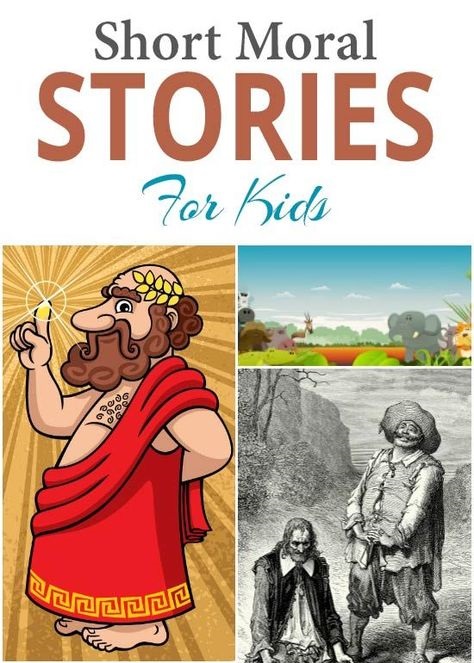
Clever Fish
Time is valuable, the gift of honesty, two lazy brothers, too many bananas, no smiles today, the magical cow, frequently asked questions.
A fisherman was heading to the river to catch some fish. He threw his net into the river and he just sat waiting there for fish to come into the net. He was fishing so that he could sell a lot of fish in the market and get some good money out of it. After some time , the fisherman heard some hustle and bustle in the net. The fisherman thought he must have got a lot of fish in the net, he actually took the net out of water . The fisherman was very disappointed because he only got a tiny little fish in the net, he was annoyed. He grabbed hold of that fish but then suddenly, the fish started talking to him.

Tiny little fish begged the fisherman to leave and let her go. But the fisherman did not pay any attention to the request of the fish. The fish kept on requesting the fisherman, “I can help you a lot if you think fisherman. If you leave me back in the water, I will tell all my friends about you and I will bring them near to the bank of the river. So that, when you come next time, you will have much more fish.” The fisherman thought to himself, “Wow, this is not a bad deal at all.” He was thinking if he let go of one tiny little fish today, tomorrow he will get a lot more fish because this tiny little fish will bring all her friends to me.

The Moral of the Story
The tiny little fish was able to convince the fisherman and he allowed the fish to go back into the river. The tiny little fish was really happy and swam away happily into the river never to come back. Poor fisherman, he came the next day expecting that there will be a lot of fish that this tiny little fish would bring. But that tiny little fish was very clever and because of her cleverness, she saved her life from the fisherman. So children, the moral of this story is you have to be really clever to save your life from such challenging moments.
Arjun was a very lazy boy. He always used to postpone things. He had a bad habit of procrastination. Arjun’s father was fed up with him, and that is why he emphasized the importance of time and time management to Arjun. He said that you should never waste time. Arjun promised his father that he would never postpone things from now on. One of Arjun’s teachers called him and told him that he had won the singing competition that was held a month ago, although, he needs to collect the winning prize the next day itself. Although as usual, Arjun didn’t care and went to take the prize the next day. To Arjun’s surprise, the prize was a ticket to the circus that was done yesterday, making the prize worthless. Thus, Arjun learnt a lesson from this incident.

The moral of the story is that time is very valuable. You should always do things on time and never procrastinate.
A long time ago in a village lived a painter named Jack. Jack was known for his honesty and nice behaviour. Although, Jack was a poor guy and he was a painter. His earnings were very less. His life was full of struggles and an entire day of hard work could only provide him two meals a day. He was wished for a bigger project so that he could earn a lot more. Jack was fully committed to small tasks as well.
One day the landlord of the village called Jack and said, “Listen to me Jack, I have called you for a very important job. Do you want to do it?” Jack replied, “Sure sir, I will definitely do it. Tell me what work is it?” The landlord then expressed his requirements and wanted Jack to paint his boat near the river bank. He wanted the work to be finished by today itself. Jack replied, “Okay sir, I will finish the work by today only.” Jack was very happy about getting work. Later the landlord asked Jack about his charges for the work, to which Jack replied, “I generally charge 1500 bucks for this job, rest you have to decide.” The landlord agreed to Jack’s charges of 1500 bucks and asked that the work should be good. Jack reassured the landlord and asked him not to worry.

The landlord then took Jack near the river to see his boat. After seeing the boat, Jack asked for some time from the landlord as he went away to bring his materials and stuff. As soon as Jack returned with his material, he started painting the boat. As Jack was painting the boat, he noticed a big hole in the boat.
Jack thought if he paints the boat without fixing the hole, the boat will sink and decided to first block the hole and then continue with his painting. Jack then blocked the hole and painted the whole boat later. He then went to the landlord and informed him that the work is finished. The landlord agreed and asked Jack to accompany him to the boat. They reached the shore and the landlord said to Jack as he saw the boat, “Wow Jack! You have done commendable work. Do me a favour, visit me tomorrow morning and collect your wages.” Both of them then headed straight to their homes.
The family of the landlord went sightseeing a day after in the same boat. Later in the evening, the servant of the landlord, Charlie, returned from vacation and enquired about everyone as he couldn’t spot anyone in the house. The landlord told him everything. On listening to the landlord, Charlie got stressed. The landlord asked Charlie after seeing him stressed, “What happened Charlie? Why do you look so tensed?” Charlie told him about the hole in the boat. The landlord freaked out after hearing this.
Within a few minutes, the family of the landlord returned back home after a day-long journey. The landlord took a sigh of relief after seeing his wife and kids completely fine. The next day, the landlord called Jack and said to him, “Here Jack, take your pay. You have done a great job. I am very happy with your work quality.” After counting the money, Jack got massively surprised. The amount was more than what he was hired for. Jack said to the landlord, “Sir, you have given me more amount by mistake.” “No Jack, I haven’t paid you any extra amount. Take it, you deserve this money, it is all yours” the landlord added. Jack questioned again, “But sir we agreed for only 1500 bucks. These are 6000 bucks. How come it is the right time.”
The landlord later explained to Jack that the increase in money is because Jack has done great work. Jack got confused. The landlord then continued, “You blocked the hole in the boat about which I was totally unaware of. If you wanted, you could have left the hole as it was or could have asked for more money but you didn’t either of them. Because of you blocking the hole, my family was able to travel safely in the boat. Had not you blocked the hole, my family could have drowned. Because of you only they are safe. This is why this money is for you, your hard work, and your honesty.”
Jack got very happy for the money and for the landlord’s kindness. Jack then thanked the landlord and happily went back to his home.

Honesty and hard work always pay off in the end.
In a state lived two brothers named Tim and George. They were slackers since childhood. The reason behind them lingering here and there was their lazy attitude. Whenever they were told to work, they used to sleep due to their lazy attitude. Tim and George’s mother was fed up with them. She couldn’t figure out what she must do to make her kids work hard. One day Tim and George were resting under a mango tree . After some time, a mango fell in between them. Since both of them were feeling extremely lazy, none of them made efforts to pick the mango. They just kept on staring at the mango.

As they were resting, the minister of the state was passing by the same route. On seeing the minister, Tim said to the minister, “Good afternoon Minister. We need a favour from you.” The minister replied, “Are you two being serious?” Tim continued, “If possible, can you please pass me this mango?” The minister found Tim very weird. He said, “the mango is lying in front of you. You can pick it yourself.” Tim replied, “It is not possible for me sir. I will have to work very hard to grab it.” “What sort of hard work is this?” The Minister replied and added, “You can’t lean your body two inches further?” to which Geroge replied, “Yes sir, this is the only problem. Who likes to work? Please give us the mango.”
The minister got angry as he disliked their laidback attitude and went away. Tim and George remained intact in their positions. The minister then went to Tim and George’s place and met their mother. Their mother claimed she doesn’t know how to change them. The minister asked their mother to send them to his palace.
Both Tim and George went to the palace the other day and met the king. The king said to Tim and George, “I have some special work for you two. From tomorrow onwards, you two will guard one end of the palace. Since you both don’t like to do so much work, you will be able to do this task.” The minister asked both of them to be careful as there is a lot of precious material in the area that Tim and George will be guarding and we don’t want any sort of mishappening.
Tim and George then begin to guard the palace. But after some time, they sat down and slept. Due to their carelessness, that end of the palace got robbed. The next morning when they woke up, they found the minister standing in front of them. The minister yells at them and expressed his disappointment. The minister emphasized, “Because of your laziness, the minister has suffered heavy losses last night. You two are punishable for a death penalty now.” As soon as they heard the minister, both Tim and George freaked out. As soon as they are presented in front of the lion , they bow down to the king and cry for their lives. After hearing their plea, the king forgave Tim and George.
From this story, we learned the lesson that we must never be lazy.
Shringeri Shrinivas was having a very bad day. He asked so many people to take the bananas that he had grown on his farm. “No, thank you,” they all said. “The quality of the bananas are too good, we like them but we have had too many. We cannot eat anymore.” Poor Shringeri Shrinivas! He then got the idea to take assistance from the Farmer’s Centre in Doddooru, a big town near his village. Off he went, carrying the best crop of bananas.

A few days later, Shringeri Shrinivas returned home looking very happy. He started growing bananas on his farm amusingly now. Although this time around, Shringeri did not offer fruits to anybody surprisingly. Not to his family, not to his neighbour, not to his friends, not to the traders, and not even to his cows! Everyone became very curious. Where were all the bananas going? Then one-day Shivanna, Shringeri’s neighbour organized a big pooja to please the Gods. The priest of the pooja requested Shivanna to gather 108 ripe bananas as they will be essential to the pooja. Shivanna ran to Shringeri Shrinivas. “I am sorry for saying no to you before but now I need 108 ripe bananas. Can you help me, please?’ Shringeri Shrinivas tapped his chin. “Well, let me see what I can do”
The pooja started. The whole village came to watch. The priest began chanting. Then the priest asked for the bananas to offer them to the gods. Just then, in came Shringeri Shrinivas carrying a big bag. From the bag, he carefully took out 27 packets. On each packet was written- “High-Quality Banana Halwa, S.S. Farms.” Shringeri Shrinivas offered one to the priest. “Each packet contains the pulp of four bananas. There are 27 packets. So here are your 108 ripe bananas!” This later cracked up the entire village and everyone started laughing at Shringeri Shrinivas. This made it clear what Shringeri has been doing with all those bananas now.

Never act too smart and become overconfident.
Shanti and Arun were good friends. Shanti was always cheerful. One day, Shanti walked into the classroom slowly. Her head was bent down. She looked sad. “Did someone scold you?” asked Arun. Shanti shook her head. She sat down and did not lookup. She did not answer ‘Present!’ when Miss Sona called her name. Miss Sona called again, louder this time, “Shanti Kumari!” Shanti raised her hand. “Do you have a sore throat?” her teacher asked. Shanti shook her head. “Are you feeling okay?” Miss Sona asked. Shanti stayed quiet.

Arun wanted to make her smile. He had an idea! He took something out from his bag. When he ran to show it to Shanti, he slipped and the item went flying towards Shanti. Shanti saw it and caught it. It was a big green rubber frog! Shanti’s eyes flew open. She opened her mouth to laugh. That is when Arun and her friends saw why she had not smiled or talked all day! Four of her front teeth were missing!
Always surround yourself with good company and friends and be there for one another in whatever way possible.
A long time ago in a small village lived two farmers named Lewis and Harry. Lewis and Harry were very rich farmers. They had a huge farm and many cows but they were not happy, they wanted more. In their neighbourhood lived another farmer named George. George was a poor farmer. He had only one cow and a small farm. But he was happy with what he had. Every night before sleeping, he used to thank god for what he had. Everything was running smoothly until one day Lewis and Harry came to George’s house to purchase his cow. But George didn’t want to sell his beloved cow, so he clearly said, “I don’t want to sell my cow, please leave my house.” Hearing George’s response, Lewis and Harry got angry. They decided to take revenge and they made a plan.

They burned George’s crop at night. George saw his farm in the morning and he was heartbroken. Even after a week, he could not think of any solution. Also, the poor cow starved as he could not feed her. So he thought it is better to sell the cow as he couldn’t feed her. The next morning, along with the cow, he took whatever little silver coins he had and left for the market. On the way to market, George thought of what if some robbers attack me on the way. Because of that, he hid his silver coins in the pocket of the cow’s jacket. After travelling for a while, he got tired and decided to rest in an inn. He tied the cow outside the inn and went inside.
Just then suddenly, a silver coin rolled out of the cow’s jacket. The owner of the inn saw this and he got amazed thinking this must be a magical cow. The owner got greedy. He approached George and asked him to sell the cow to him for a pouch of silver coins. George knew this is not the actual price but thinking this was God’s wish, George agreed to sell the cow to the inn’s owner. George took the pouch of silver coins and left happily back to his village. On reaching his house, he sat on his bed and begin to count the coins.
Just then Lewis and Harry came to his house to mock him but they found that George is surrounded by many silver coins. They were surprised. They could not believe their eyes. George told them everything and after hearing his story, Lewis and Harry couldn’t believe their plan had failed. They planned so much to take revenge but they ended up with nothing.
From this story, we learned that nothing can be gained by doing harm to another person.
In this article, we learned multiple stories and the morals that they had in them. It is important for kids to read such stories and incorporate the good values shown and portrayed in the stories as it is a major part of their development. However, we should also focus on the evil characters in the stories and learn what to not do in the future and become good human beings.
You can also check out how to write a short story yourself here!
Question 01: Are moral stories a necessity for a kid’s development?
Answer: Yes. they are, as moral stories teach kids the difference between what is right and what is wrong.
Question 02: Name some short story authors that one should know.
| 1 | |
| 2 | |
| 3 | |
| 4 | |
| 5 | |
| 6 | |
| 7 | |
| 8 | |
| 9 | |
| 10 |
Share with your friends
Related Posts:

Leave a Reply Cancel reply
Your email address will not be published. Required fields are marked *
Save my name, email, and website in this browser for the next time I comment.

My Little Moppet
Top Parenting blog in India
8 must-read short English moral stories for kids
Published: December 27, 2021 | Last Updated on: May 12, 2023 | by Dr Hemapriya
Stories are the best form of learning for children. They’re the most entertaining yet effective means of expanding children’s vocabulary along with imparting good values. Reading stories to children provides a great way to teach them life lessons in a way they can understand.
The great part about these short English stories for kids is that they’ve been created keeping children’s interests and attention span in mind.
To make it easier for you, we’ve created a list of 8 must-read short English moral stories for kids:

1. The Golden Egg
This is one of the most famous short English stories for kids. Once upon a time, a farmer had a goose that laid one golden egg each day. The egg supplied sufficient cash for the farmer and his wife to fulfill their everyday needs. One day when the goose laid its golden egg, the farmer got greedy. He grabbed a quick knife and cut open the goose’s stomach to get all the eggs at once. He killed the goose but found no eggs.

Moral of the story: Think before you act.
2. A Glass of Milk
Once there was a poor boy who was going door to door asking for food since he was very hungry but nobody gave him anything except a girl. When the girl saw the poor state of the boy, she gave him a glass of milk for free. Years later that same girl fell ill and went to the best doctor in town. She was finally cured but didn’t have enough money to pay the bill. However, when the hospital handed her the bill, it said ‘Paid in full, with a glass of milk’.

Moral of the story: Kindness never goes unrewarded.
3. The Bear and the Two Friends
One day two friends were walking in a forest and they promised to stick with each other in case anything dangerous happens. Suddenly, they saw a bear coming towards them. One friend quickly ran and climbed a tree, leaving the other behind. The second friend lied down and pretended to be dead. The bear simply sniffed him and then went on his way. The friend who climbed the tree asked what the bear said to him & he told that the bear whispered in his ear “never trust fake friends”.

Moral of the story: True friends never leave you behind in a difficult time
4. Elephant and Friends
There was an elephant who had no friends. She met a rabbit, a frog, and a monkey but they all said one thing “you are too big, you cannot be my friend.” The elephant was disappointed. One day a tiger was about to attack all the small animals. The elephant went to the tiger and kicked him to protect the small animals of the forest. When the other animals heard about it, they said sorry and became friends with the elephant.

Moral of the story: Do not judge a book by its cover.
5. The Bundle of Sticks
An old man had 3 sons who were hard workers but fought all the time. The old man got tired of them fighting and decided to teach them a lesson. He gave all three of them a bundle of sticks and told them to break all the sticks one by one. It only them a few minutes to do so. The old man then told his sons to break the sticks together as a bundle. This turned out to be impossible because the sticks were too strong together. The sons understood the message through this lesson and stopped quarreling.

Moral: Strength lies in unity
6. The Fox & the Grapes
One of the most popular short English stories for kids , this story revolves around a thirsty fox who sees a bunch of grapes. He tries to jump to get them but they are out of his reach. The fox feels disappointed and decides that the grapes must be sour and walks away.

Moral of the story: Sometimes people belittle what they can’t have.
7. The tortoise and The Hare
One day a hare and a tortoise decided to participate in a race to see who wins. The hare being a fast animal, was overconfident that the tortoise will lose the race because he is slow. So he decided to stop and take a nap. The tortoise, on the other hand, continued to move forward with determination and won the race while the rabbit kept sleeping.

Moral of the story: Slow and steady wins the race.
8. The Boy Who Cried, Wolf
There was once a boy who was kept in charge of taking care of a herd of sheep. Every time he got bored, he screamed “Wolf! Wolf!”. The villagers would come rushing to help but realized that it was just a prank. One evening, a wolf actually came and scared the sheep. When the boy screamed for help, nobody came to help him because he had lost his credibility.

Moral of the story: We must not tell lies.
We all remember spending hours reading short stories when we were kids. Most of us have read a lot of the stories mentioned above and associated my childhood with them. All these stories had a highly entertaining way of delivering an important life lesson to us, which they did so effectively that we remember them to this day.

Stories play a great role in the growth of a child. They are a highly effective way in which parents can impart great lessons of morals, ethics, and develop their child’s understanding of what is right and wrong. Although we highly recommend these short English stories for kids, there are definitely so many more you can find for your kids. The motive is always to learn.

Buy Healthy Nutritious Baby, Toddler food made by our own Doctor Mom !
You may also like.

Leave a Reply Cancel reply
Your email address will not be published. Required fields are marked *
Save my name, email, and website in this browser for the next time I comment.
Browse & Buy Our Products Online

Useful Links
Our facebook page.

Read Short Moral Stories in English + PDF
Reading short moral stories in English can help you learn important life lessons while improving your English.
Discover a world of wisdom and entertainment with our collection of short moral stories in English. Each story is designed to inspire and teach valuable life lessons, perfect for children and language learners alike. You see, these little stories are like tiny treasure chests filled with valuable lessons. They can teach you important things about being a good person and making the right choices. Plus, they can make your English better and even help you feel more for others. I read some of these stories when I was preparing for my exams with examlabs and found them very interesting.
You can also get free 100 short English stories and moral stories for kids PDF down below.
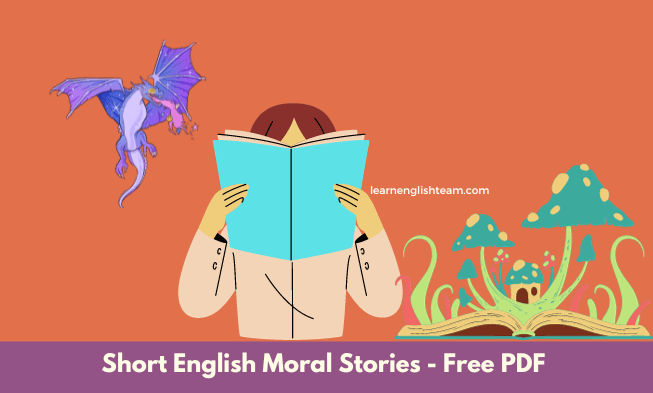
Story 1 – Don’t Change The World

Once upon a time, there was a king who ruled a prosperous country. One day, he went for a trip to some distant areas of his country. When he was back to his palace, he complained that his feet were very painful, because it was the first time that he went for such a long trip, and the road that he went through was very rough and stony. He then ordered his people to cover every road of the entire country with leather.
Definitely, this would need thousands of cows’ skin, and would cost a huge amount of money. Then one of his wise servants dared himself to tell the king, “Why do you have to spend that unnecessary amount of money? Why don’t you just cut a little piece of leather to cover your feet?”
The king was surprised, but he later agreed to his suggestion, to make a “shoe” for himself.
Moral : to make this world a happy place to live, you better change yourself – your heart; and not the world.
Story 2 – The Travelers and the Tree

Two men were walking along one summer day. Soon it became too hot to go any further and, seeing a large plane tree nearby, they threw themselves on the ground to rest in its shade.
Gazing up into the branches one man said to the other: “What a useless tree this is. It does not have fruit or nuts that we can eat and we cannot even use its wood for anything.”
“Don’t be so ungrateful,” rustled the tree in reply.
“I am being extremely useful to you at this very moment, shielding you from the hot sun. And you call me a good-for-nothing!”
Moral : All of God’s creations have a purpose.
Check Also: Free English Story Books (Level 1) PDF English Story Books for Beginners (Level 2-3-4) Simple Past Tense Exercises (Short Story PDF)
Story 3 – The Hare and Tortoise

A tortoise one day met a hare who made fun of her. “My, my, you move so slowly, you will never get far!”
The tortoises, upset by the hare’s manner, said, “Let’s have a race and see who is faster.”
The hare laughed and said, “You must be joking! But all right, we’ll see who reaches the other side of the hill first.” Off he ran, leaving the tortoise far behind.
After a while, the hare stopped to wait for the tortoise to come long. He waited and waited till he felt sleepy. “I might as well take a nap,” he thought. “Even if she catches up with me, I can easily win the race.” So he lay down under a shady tree and closed his eyes.
When the tortoise passed the sleeping hare, she walked on slowly but steadily. By the time the hare woke up, the tortoise was near the finishing line. He ran as fast as he could, but he could not catch up with the tortoise.
Moral : It doesn’t matter how slowly you go as long as you don’t stop!
Story 4- The Wolf and The Lamb

A lamb was grazing with a flock of sheep one day. She soon found some sweet grass at the edge of the field. Farther and farther she went, away from the others.
She was enjoying herself so much that she did not notice a wolf coming nearer to her. However, when it pounced on her, she was quick to start pleading, “Please, please don’t eat me yet. My stomach is full of grass. If you wait a while, I will taste much better.”
The wolf thought that was a good idea, so he sat down and waited.
After a while, the lamb said, “If you allow me to dance, the grass in my stomach will be digested faster.” Again the wolf agreed.
While the lamb was dancing, she had a new idea. She said, “Please take the bell from around my neck. If you ring it as hard as you can, I will be able to dance even faster.”
The wolf took the bell and rang it as hard as he could. The shepherd heard the bell ringing and quickly sent his dogs to find the missing lamb. The barking dogs frightened the wolf away and saved the lamb’s life.
Moral: The weak can be cleverer than fierce and strong.
Story 5 – The Thirsty Crow

One hot day, a thirsty crow flew all over the fields looking for water. For a long time, she could not find any. She felt very weak, almost giving up hope.
Suddenly, she saw a water jug below her. She flew straight down to see if there was any water inside. Yes, she could see some water inside the jug!
The crow tried to push her head into the jug. Sadly, she found that the neck of the jug was too narrow. Then she tried to push the jug down for the water to flow out. She found that the jug was too heavy.
The crow thought hard for a while. Then looking around her, she saw some pebbles. She suddenly had a good idea. She started picking up the pebbles one by one, dropping each into the jug. As more and more pebbles filled the jug, the water level kept rising.
Soon it was high enough for the crow to drink. Her plan had worked!
Moral : If you try hard enough, you may soon find an answer to your problem.
Story 6 – A Pond Full of Milk
Once there was a king who told some of his workers to dig a pond. Once the pond was dug, the king made an announcement to his people saying that one person from each household had to bring a glass of milk during the night and pour it into the pond. So, the pond should be full of milk by the morning.
After receiving the order, everyone went home.
One man prepared to take the milk during the night. He thought that since everyone will bring milk, he could just hide a glass of water and pour it inside the pond. Because it will be dark at night, no one will notice. So he quickly went and poured the water in the pond and came back.
In the morning, the king came to visit the pond and to his surprise the pond was only filled with water!
What has happened is that everyone was thinking like the other man, “I don’t have to put the milk in, someone else will do it.”
Moral: When everyone expects someone else to take action, nothing gets done, and collective responsibility is essential for achieving a common goal.
Story 7: The Clever Boy
A man with his donkey carrying two sacks of wheat was on his way to the market. After a little while he was tired and they rested under a tree. When he woke up from his nap he could not see the donkey and started searching for the donkey everywhere. On the way he met a boy, he asked the boy, “Have you seen my donkey?” The boy asked, “Is the donkey’s left eye blind, his right foot lame and is he carrying a load of wheat?” The man was happy and said, “Yes, exactly! Where have you seen it?” the boy answered, “I haven’t seen it.” This made the man very angry and he took the boy to the village chief for punishment.
The judge asked, “Dear boy, if you had not seen the donkey, how could you describe it?” The boy answered, “I saw the tracks of a donkey and the right and left tracks were different from this. I understood that the donkey that passed there was limping. And the grass on the right side of the road was eaten but the grass on the left was not. From that I understood that his left eye was blind. There were wheat seeds scattered on the ground and I understood that he must have been carrying a load of wheat. The judge understood the boy’s cleverness and told the man to forgive the boy.
Moral : This story teaches us that we should not be quick to judge the people.
Story 8: A Merchant and his Donkey
One beautiful spring morning, a merchant loaded his donkey with bags of salt to go to the market in order to sell them. The merchant and his donkey were walking along together. They had not walked far when they reached a river on the road.
Unfortunately, the donkey slipped and fell into the river and noticed that the bags of salt loaded on his back became lighter.
There was nothing the merchant could do, except return home where he loaded his donkey with more bags of salt. As they reached the slippery riverbank, now deliberately, the donkey fell into the river and wasted all the bags of salt on its back again. The merchant quickly discovered the donkey’s trick. He then returned home again but re-loaded his donkey with bags of sponges.
The foolish, tricky donkey again set on its way. On reaching the river he again fell into the water. But instead of the load becoming lighter, it became heavier.
Moral : Deceitful actions ultimately lead to consequences that are harder to bear, highlighting the importance of honesty and integrity.
Story 9: The Fox Who Got Caught In The Tree Trunk
Once upon a time, there was a hungry fox that was looking for something to ear. He was very hungry. No matter how hard he tried, the fox could not find food. Finally he went to the edge of the forest and searched there for food. Suddenly he caught sight of a big tree with a hole in it.
Inside the hole was a package. The hungry fox immediately thought that there might be food in it, and he became very happy. He jumped into the hole and when he opened the package, he saw there was a lot of food, bread, meat and fruit in it!
An old woodcutter had placed the food in the tree trunk while he cut down trees in the forest. He was going to eat it for his lunch. The fox happily began to eat. After the fox had finished eating, he felt thirsty and decided to leave the trunk and drink some water from a nearby spring. However, no matter how hard he tried, he could not get out of the hole. Do you know why? Yes, the fox had eaten so much food that he became too big to fit through the hole.
The fox was very sad and upset. He told himself, “I wish that I had thought a little before jumping into the hole.”
Moral : It’s important to think before taking actions.
Story 10: Wealth – Success and Love
A woman came out of her house and saw 3 old men with long white beards sitting in her front yard. She did not recognize them. She said “I don’t think I know you, but you must be hungry. Please come in and have something to eat.”
“Is your husband at home?”, they asked. “No,” she replied. “He’s out.” “Then we cannot come in,” they replied.
In the evening when her husband came home, she told him what had happened.
“Go tell them I am home and invite them in!”
The woman went out and invited the men in.
“We do not go into a House together,” they replied. “Why is that?” she asked.
One of the old men explained: “His name is Wealth,” he said pointing to one of his friends, and said pointing to another one, “He is Success, and I am Love.” Then he added, “Now go in and discuss with your husband which one of us you want in your home.”
The woman went in and told her husband what was said. Her husband was overjoyed. “How nice!,” he said. “Since that is the case, let us invite Wealth. Let him come and fill our home with wealth!”
His wife disagreed. “My dear, why don’t we invite Success?”
Their daughter-in-law was listening from the other corner of the house. She jumped in with her own suggestion: “Would it not be better to invite Love? Our home will then be filled with love!”
“Let us heed our daughter-in-law’s advice,” said the husband to his wife.
“Go out and invite Love to be our guest.”
The woman went out and asked the 3 old men, “Which one of you is Love? Please come in and be our guest.”
Love got up and started walking toward the house. The other 2 also got up and followed him. Surprised, the lady asked Wealth and Success: “I only invited Love, Why are you coming in?”
The old men replied together: “If you had invited Wealth or Success, the other two of us would’ve stayed out, but since you invited Love, wherever he goes, we go with him.
Moral: Wherever there is Love, there is also Wealth and Success!”
Short English Moral Stories PDF
Moral Stories in English PDF – download
Moral Stories for Kids PDF – download
You May Also Like

Difference Between MISTAKE, FAULT, ERROR, WRONG and BLUNDER

How to Write Letters in English ✉ (formal & informal)

Other Ways to Say SAID + PDF ✔
Very nice stories. Thanks.
- Write for Tell-A-Tale

40 Short Bedtime Panchatantra Stories You MUST Read to Your 3-10 Year Olds
The Panchatantra collection of short stories was written in Sanskrit by Indian scholar and author, Vishnu Sharma , between 1200 CE – 300 CE. Some scholars also believe that it was written in around 3 CE. Panchatantra stories are one of the most widely translated books in the history and are known for their wisdom on practical life. The stories themselves are delightfully narrated, with animals and birds often being the central characters. Thus they provide valuable life lessons in a light-hearted manner. While some of the stories may not be appropriate for children in this age group, most of them appeal to early stage learners, due to the colorful characters.
Here we list the most famous stories from the Panchatantra for kids. These stories can be used by parents, teachers and children for storytelling sessions, role plays, moral educations classes, school competitions etc.
1. The Monkey and the Crocodile
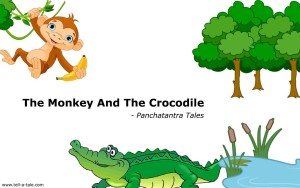
The most popular and most widely narrated of the Panchatantra stories. The monkey and crocodile become friends, but the crocodile’s wicked wife has other intentions. She wants to eat the monkey’s heart! Read the complete story here .
Moral of the story: Choose your friends wisely.
Kids love the monkey who saves his skin from a deceitful friend through quick thinking. The story teaches kids the importance of choosing the right friends and also possessing presence of mind. Both of these are valuable lessons for your toddlers as they set out to meet their first friends at school.
2. The Stork and the Crab
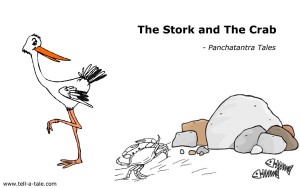
An old stork finds an easier way of hunting fishes. He promises them that he will take them safely to a bigger lake, with lots of water; but instead carries them to a rock where he kills and eats them. However, he soon meets his match in the form of the crab. How? Read it here .
Moral of the story: A sharp mind is the greatest strength.
Another story that teaches the importance of choosing the right friends and also the importance of the presence of mind. Kids will love the crab that turns a hero for all the fish in the tank by killing the bad stork.
- Also Read: How Storytelling Can Benefit Teenagers
3. The Loyal Mongoose

The Loyal Mongoose which was killed by a woman Panchatantra Story
“Think before you act” ! Once a loyal mongoose is left to guard his master’s sleeping infant. When the mongoose sees a snake coming to bite the infant, he attacks and kills the viper. The farmer’s wife, who has not seen the snake and mongoose fight, sees the blood on the mongoose’s mouth on returning home and expects the worst. She kills the mongoose in a fit of anger, only to realize her mistake later. [ Complete Story ]
Moral of the story: Think before you act.
The message is conveyed in a brutal yet effective manner. Although kids rarely think before they act, it never harms to start teaching them this habit early.
4. The Brahmin’s Dream
Building castles in the air never gets you anywhere. Once a poor Brahmin (pious man) is gifted a pot of flour. He returns home and daydreams about all that he will achieve with a pot of flour. Only to wake up in the end, and find himself surrounded by broken pieces of the earthen pot and covered in flour!
Here is the complete tale .
Moral of the story: Do not build castles in the air. They will fall.
The story is full of actions and sounds; enact it to your kids and they will love it. On a serious note, it will remind kids that hard work is more important than day-dreaming.
- Buy the Complete collection of 365 Panchatantra short stories in English from Amazon (IN) and Amazon.com .
5. Union is Strength
Long ago, there lived a flock of pigeons in a dense forest. One day all the pigeons were caught in a hunter’s net. How did they get out? By being united of course. Flap, flap your wings and fly away! Read the complete story here .
Moral of the story: Unity is strength.
This story is as much for adults as for kids, serving as a reminder that the greatest obstacles can be overcome by staying united. Kids at this age have their first encounter with the outside world. You can stress how important it is to stay together and not discriminate.
6. The Cat’s Judgement

A partridge and a rabbit get into an argument. They decide to find a third person to settle their argument and come across a praying cat…Read this story to find out what happened next (Hint: It’s not so difficult to guess!)
Moral of the story: Never trust a stranger, even though he may seem very friendly.
7. The Tiger, The Brahmin and The Jackal

Once a tiger promises a brahmin to set him free from his cage, promising him no harm. But once free, the tiger tells the brahmin that he is hungry and would he should prepare for death. When the brahmin pleads the tiger to spare his life, the tiger agrees to abide by the decision of the first three things the Brahmin chose to question as to the justice of the tiger’s action. The brahmin asks a tree, a buffalo and a jackal. Find what happens next.
8. The Elephants and the Mice
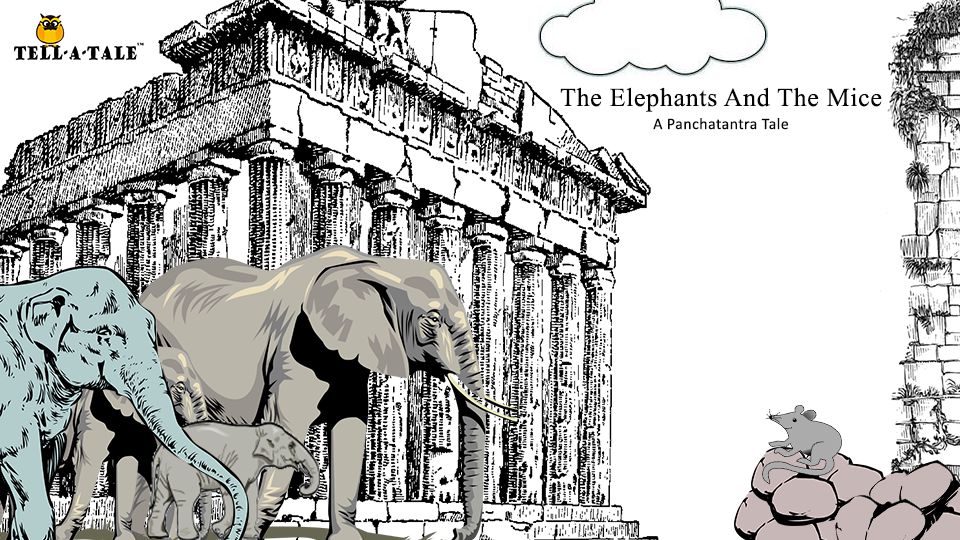
A herd of elephants looking for water pass through a deserted city, populated only by mice. The mice, afraid of being trampled by the large herd, request the elephants to take a different path, a request their leader graciously agrees. Years later, the mice hear of the elephants that the King’s hunters have captured for his army, and rush to help them. They gnaw at the ropes tying the elephants and set them free.
Tell your child the importance of standing up for your friends just as the mice stood by their friends, the elephants, and saved them from the King’s hunters.
Moral of the story: A friend in need is a friend indeed.
Press NEXT to read more.
You may also like

The Story of a Kind Hearted Little Girl Named Tara
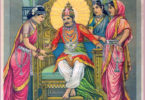
Lesser Known Stories About King Dasharatha of Ayodhya

TULSI VIVAH

Book Review: Sidereal Destiny by Vaishnavi Sanoj
About the author.
Team Tell A Tale
Leave a comment x.
This site uses Akismet to reduce spam. Learn how your comment data is processed .
43 Comments
Very nice compilation. I love all these stories myself 🙂
Thank you 🙂
thanks this story. my sister loves it very much share more of these amazing stories share to every one. thank you
https://www.youtube.com/playlist?list=PLgxyzknmaiVwqcUMeU-LV-ACW3GIEX9PW Please check this link and give your valuable comments and feedbacks ..Thank You!
Nice video. I have also written in Panchatantra stories in odia language. Please visit my site moralstoriez.com
May I request you to kindly forward those oriya panchtantra stories in video format to me. I m interested to show the stories to my sons little kids.
me too!!!! like mythological stories very much
I also love stories
very very very good pile
Very good story
stories are good and easily understanding ,thank you
nice stories for children giving many morals and nice compilation
very nice…
very nice..
i love it very nice
Nice stories. I have also written in Panchatantra stories in odia language. Please visit my site moralstoriez.com
Very Nice…All Stories
Very nice stories Thanks for collecting such stories
i am like this stores THANK YOU
Best stories ever I enjoyed reading your stories and even i liked it so much I want more such moral stories
Very nice stories. it remind again my childhood. where teachers uses stories to teach morality.
Very Nice Stories.
nice and real stories
Excellent story …………. .
Not at all nice story they are totally copied stories.The Panchatantra has a new story but this pepole coiped the story of Panchatantra.
Very interesting stories and the morals are really true i give the story a 👍👍👍👍👍
WOW THESE ALL ARE MY FAV. STORIES, I LIKE IT…..
Who is author of these book
SO GOOD STORIES I LOVE THEM
Can we take these stories and narrate with a video .. on YouTube . We are going to specify the source as your website. Please let us know if there is any copyright to be taken?
There is a copyright to be taken. Please reach out to [email protected] to discuss terms and conditions.
Nice stories as usual India stories will be nice Like Panchatantra.
Have always loved these Panchatantra stories and the beauty is that you are never too old or too young to enjoy these. For kids, its further add on with all those moral lessons and life skill that they would imbibe and that would remain with them through out. Thanks!
Really very nice collection of stories. Keep it up
Thanking for sharing the story
Very nice stories collection
I want in kannada
Philosophy Break Your home for learning about philosophy
Introductory philosophy courses distilling the subject's greatest wisdom.
Reading Lists
Curated reading lists on philosophy's best and most important works.
Latest Breaks
Bite-size philosophy articles designed to stimulate your brain.

Ethics and Morality The Best 10 Books to Read
I s it ever permissible to tell a lie, to steal something, to intentionally hurt or even kill someone? If not, why not? What’s the right thing to do, and what makes it right? What do we mean by ‘good’? What do we mean by ‘evil’? What do we owe to each other as humans? What do we owe to non-human life? What’s the justification for any moral belief, and where do morals come from ? Are ethical systems culture-dependent, or are there some rules that transcend culture — or even transcend species?
All these questions and more form the basis of ethics and morality, a core branch of philosophical study throughout the history of recorded human thought.
Most of us feel we have some sort of internal moral compass, or at least a sense of what’s fair and unfair; but acknowledging we’re morally sensitive tends to be where consensus in ethics ends and controversy begins. Indeed, arguing about right and wrong and morally judging people is a favored pastime not just of philosophers but of most human beings.
In one concise email each Sunday, I break down a famous idea from philosophy. You get the distillation straight to your inbox:
💭 One short philosophical email each Sunday. Unsubscribe any time.
This reading list is designed to give you a complete view of how different thinkers in philosophy have thought about good, evil, and everything in between.
From introductory texts and anthologies, through to important primary works from the philosophical greats themselves — after consuming this list, you’ll have much more clarity about core moral arguments and ethical systems, and be able to make measured, informed contributions to even the most heated of contemporary debates. Let’s dive in!
1. Ethics: The Fundamentals, by Julia Driver

Ethics: The Fundamentals
BY JULIA DRIVER
Published in 2006, Julia Driver’s Ethics: The Fundamentals is a very good starting place for anyone curious about ethics and morality. In highly readable, thoughtful style, Driver introduces a number of key ethical systems, including virtue ethics, Kantian ethics, divine command theory, and feminist ethics.
Packed with real-life examples and coming in at an accessible 192 pages, Ethics: The Fundamentals is a brilliant introduction to the major movements within ethics and morality.
2. Being Good: A Short Introduction to Ethics, by Simon Blackburn
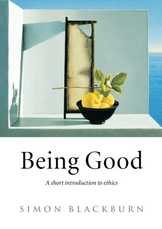
Being Good: A Short Introduction to Ethics
BY SIMON BLACKBURN
Simon Blackburn, author of the best-selling general introduction to philosophy, Think (which features on our introduction to philosophy reading list ), writes with admirable clear-headedness in his 2003 Being Good: A Short Introduction to Ethics .
Blackburn largely focuses his 172-page introduction around problems within ethics, from our status as moral beings to the foundations of moral judgements. This is a good primer for anyone interested in the complex issues inherent within the study of morality.
3. Ethics: History, Theory, and Contemporary Issues, by Steven Cahn & Peter Markie
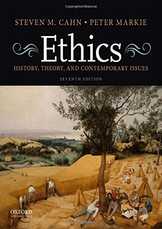
Ethics: History, Theory, and Contemporary Issues
BY STEVEN CAHN & PETER MARKIE
If you’re looking for a one-stop shop for all things ethics and morality, look no further than Steven Cahn and Peter Markie’s 1998 Ethics: History, Theory, and Contemporary Issues .
Spanning 2,500 years of ethical theory, this epic 976-page collection features extracts from the best moral thinkers past and present. Cahn and Markie’s helpful contextual notes, concise introductions, and brilliant organization throughout make this anthology an essential addition for serious students of ethics and morality.
4. How to Live a Good Life (According to 7 of the World’s Wisest Philosophies), by Philosophy Break
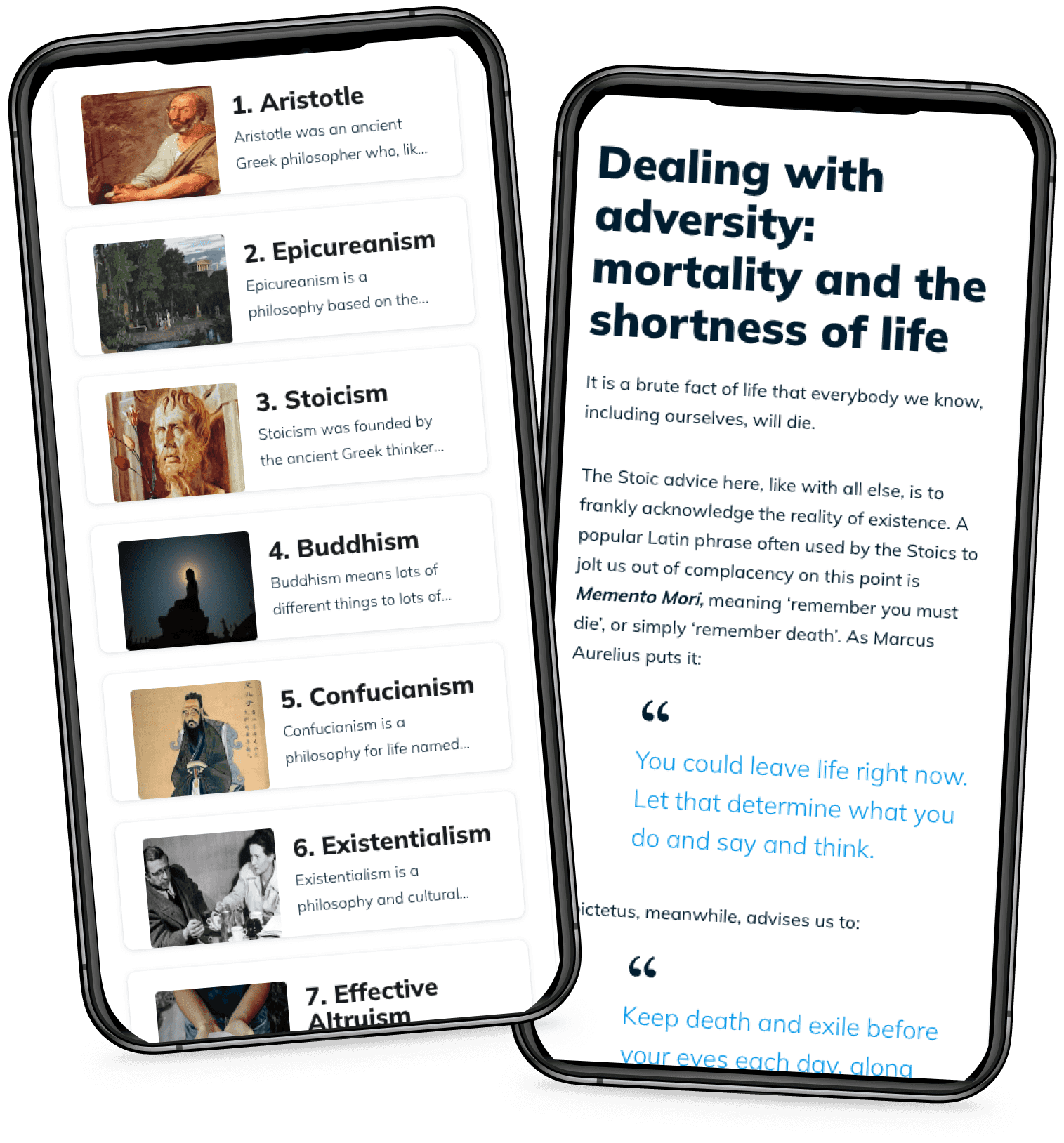
How to Live a Good Life (According to 7 of the World’s Wisest Philosophies)
BY PHILOSOPHY BREAK
★★★★★ (50+ reviews)
If your interest in moral philosophy falls mostly into the more practical ‘how can I live a good life?’ category, then the 2023 How to Live a Good Life (According to 7 of the World’s Wisest Philosophies) is for you. This concise online guide is designed to help you understand some of life’s most influential ethical frameworks — including Buddhism, Stoicism, Existentialism, and more — examine the pros and cons of each, and discover how they might apply to your own life.
Of course, we’re a little biased, as we produced this one — but How to Live a Good Life (According to 7 of the World’s Wisest Philosophies) gets rave reviews, is better value than buying introductory books for all philosophies covered, and could be just what you’re after!
5. The Nicomachean Ethics, by Aristotle
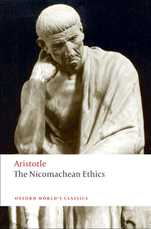
The Nicomachean Ethics
BY ARISTOTLE
Turning from introductions and anthologies to primary ethical texts, where better to start than with a discussion of morality that, though over two thousand years old, is one of the subject’s finest works and still drives discussion today?
In The Nicomachean Ethics , ancient Greek philosopher Aristotle’s guiding question is: what is the best thing for a human being? His answer is eudaimonia , which is variously translated from Greek as ‘well-being’, ‘happiness’, ‘blessedness’, and in the context of the virtue ethics Aristotle endorsed, ‘human flourishing’.
The Nicomachean Ethics is Aristotle’s exploration into how we can achieve eudaimonia by living well, and includes his theory of the ‘golden mean’ , his influential views on friendship , as well as his argument that leisure should define us more than work . It’s an essential text for anyone interested in the foundations and development of ethical thinking in Western society.
6. Groundwork of the Metaphysics of Morals, by Immanuel Kant
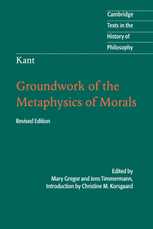
Groundwork of the Metaphysics of Morals
BY IMMANUEL KANT
Another kingpin of the philosophical tradition, Immanuel Kant lays out his monumentally influential ethical vision in the 1785 Groundwork of the Metaphysics of Morals .
Kant argues that human beings are ends in themselves, never to be used by anyone merely as a means, and that morality is rooted in and justified by reason.
Kant’s deontological or ‘duty-based’ ethical system is still defended by many thinkers today, and this is the best book with which to explore it. If you’re interested in ethics, this brilliant, difficult book belongs on your bookshelf!
7. Utilitarianism, by John Stuart Mill

Utilitarianism
BY JOHN STUART MILL
Aristotle’s virtue ethics, Kant’s duty-based ethics — it would be unforgivable if we didn’t mention Jeremy Bentham’s utilitarianism (‘the greatest happiness for the greatest number’) as another foundational moral system in Western thinking.
While Bentham is the well-known figurehead of the movement, the basis of utilitarian thinking is perhaps laid out most powerfully in John Stuart Mill’s 1861 Utilitarianism , an absolutely classic exposition and defence of the widely-held moral position. This particular edition also contains Mill’s 1868 speech on capital punishment, which is a fantastically stimulating read.
8. On the Genealogy of Morals, by Friedrich Nietzsche
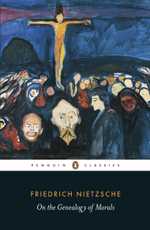
On the Genealogy of Morals
BY FRIEDRICH NIETZSCHE
Unlike other philosophers on this list, German philosopher Friedrich Nietzsche was not so interested in prescribing an explicit ‘one size fits all’ moral system, rather he was committed to understanding the history of Western moral thinking, and diagnosing exactly what’s wrong with it.
In his 1887 masterwork, On the Genealogy of Morals , Nietzsche explosively critiques all moral systems that came before him and drags the reader out of any preconceptions about what constitutes ‘good’, ‘evil’, ‘bad conscience’, as well as ascetic ideals and the purpose of life.
Nietzsche proposes a total ‘revaluation of values’, arguing all moral philosophy since Socrates has been the morality of the weak, and that if human civilization is to progress we must embrace impulses that cohere with saying ‘yes’ to life, impulses which differ for each individual.
A hugely entertaining and challenging read, On the Genealogy of Morals is highly recommended for anyone interested in dwelling on where moral systems comes from, and how they should evolve.
9. Practical Ethics, by Peter Singer

Practical Ethics
BY PETER SINGER
Is it ethical to buy luxuries when others do not have enough to eat? Should we buy meat from intensively reared animals? If your carbon footprint is above the global average, are you doing something immoral?
These questions and more are lucidly addressed in moral philosopher Peter Singer’s hugely popular introduction to applied ethics, Practical Ethics . Singer provokes readers by carrying out seemingly commonsensical moral arguments to their sometimes disturbing conclusions, and shows the errors in much of our thinking about right and wrong (see Singer’s famous thought experiment on the life you can save here ).
First published in 1979, the text is now in its third edition — its enduring popularity and slick style make it an ideal text for anyone interested in dwelling on contemporary moral issues.
10. What We Owe to Each Other, by T. M. Scanlon
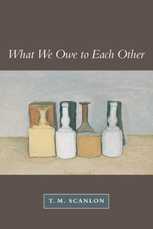
What We Owe to Each Other
BY T. M. SCANLON
Published in 1998, American philosopher T. M. Scanlon’s What We Owe to Each Other has quickly established itself as a modern classic of moral philosophy.
Within 432 thought-provoking pages, Scanlon outlines his contractualist view of ethics, in which he states that thinking about right and wrong means thinking about what we do in terms that could be justified to others and that could not be reasonably rejected.
A scrupulous and relentlessly exacting read, this is a fine example of how to write about moral philosophy for any aspiring student of the subject.
Further reading
Are there any other books you think should be on this list? Let us know via email or drop us a message on Twitter or Instagram .
In the meantime, why not explore more of our reading lists on the best philosophy books :

View All Reading Lists
Essential Philosophy Books by Subject
Get one mind-opening philosophical idea distilled to your inbox every Sunday (free):
About the author.

Jack Maden Founder Philosophy Break
Having received great value from studying philosophy for 15+ years (picking up a master’s degree along the way), I founded Philosophy Break in 2018 as an online social enterprise dedicated to making the subject’s wisdom accessible to all. Learn more about me and the project here.
If you enjoy learning about humanity’s greatest thinkers, you might like my free Sunday email. I break down one mind-opening idea from philosophy, and invite you to share your view.
Subscribe for free here , and join 14,000+ philosophers enjoying a nugget of profundity each week (free forever, no spam, unsubscribe any time).

Get one mind-opening philosophical idea distilled to your inbox every Sunday (free)

From the Buddha to Nietzsche: join 14,000+ subscribers enjoying a nugget of profundity from the great philosophers every Sunday:
★★★★★ (50+ reviews for Philosophy Break). Unsubscribe any time.
Each philosophy break takes only a few minutes to read, and is crafted to expand your mind and spark your curiosity.

Elizabeth Anderson on the Tyranny of Being Employed
7 -MIN BREAK
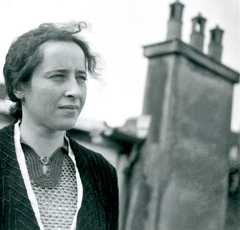
Hannah Arendt On Standing Up to the Banality of Evil
5 -MIN BREAK

Pantheism: Spinoza and the God that Einstein Believed In
2 -MIN BREAK

Mono No Aware: Beauty and Impermanence in Japanese Philosophy
4 -MIN BREAK
View All Breaks
PHILOSOPHY 101
- What is Philosophy?
- Why is Philosophy Important?
- Philosophy’s Best Books
- About Philosophy Break
- Support the Project
- Instagram / Threads / Facebook
- TikTok / Twitter
Philosophy Break is an online social enterprise dedicated to making the wisdom of philosophy instantly accessible (and useful!) for people striving to live happy, meaningful, and fulfilling lives. Learn more about us here . To offset a fraction of what it costs to maintain Philosophy Break, we participate in the Amazon Associates Program. This means if you purchase something on Amazon from a link on here, we may earn a small percentage of the sale, at no extra cost to you. This helps support Philosophy Break, and is very much appreciated.
Access our generic Amazon Affiliate link here
Privacy Policy | Cookie Policy
© Philosophy Break Ltd, 2024

- Privacy Policy
- Terms And Conditions
50+ Best Moral Stories in English For Children
- by Studyvillage
- March 5, 2024 March 5, 2024
Hello, welcome to this blog post about Best Moral Stories in English , stories have the power to capture our imagination, teaching us important lessons.

And take us on adventures to far-flung countries, learning English through stories can be a fun and engaging way to develop their language skills as well as their love of reading and writing.
- 1.1 Long Story in English for Students
- 1.2 Short Story in English with Moral
Best Moral Stories in English
The King Cobra and the Ants.
Once there lived a king cobra in a small hole. When he was small he ate little creatures. As he grew up he began to eat eggs, lizards, frogs and rabbits. And when he grew up further he started to eat even other smaller snakes. His pride grew with him. All small animals began to fear the king cobra. This boosted up his pride. He began to think “Now I am the most powerful creature. I am the king of the forest. All animals fear me. Let me move from this small hole to a bigger place”. He searched for a place to suit his size and status. Finally he came across a big tree. He selected the tree for his house. He saw an ant hill near the tree. He thought “Why should there be an ugly ant hill near my royal house?” He hissed aloud “I am king Cobra, the king of the forest. I order the ants to vacate immediately”. There was no reply. He got wild and struck at the ant hill. What a surprise! In a minute thousands of ants swarmed up the king cobra biting him everywhere. The king cobra could not bear the pain. He ran away.
Moral Story : Pride goes before fall.
The Red Hen and Her Friends.
Once, there lived a hen with her five chicks. The hen was as red as beetroot. She had three friends : a duck, a cat and a dog. They all lived happily. One day, the red hen stumbled on to a wheat seed. “Hey, who among you wish to plant this seed?” she asked.
“Not me, friend” refused the duck. “Nor can I.” declined the cat. “Count me not.” the dog turned his back.
“All right. I will do it then by myself,” said the hen. She planted the see and watered it. Alas! It grew quickly to yield the brownish wheat. “Hi! There, who among you wish to harvest the wheat?” asked the red hen.
“Not me, friend,” the duck sounded bored. “Nor can I.” shrugged the cat. “Count me not!” avoided the dog.
“If so, I will do it by myself,” the red hen spoke up as she laboured all day along. By evening she had two gunny bags full of wheat.
“Hello pal! Who among you will lend me a hand to grind this wheat? She queried. All the three refused as usual. “I will see that I grind this by myself. I will make flour, knead dough and bake bread!” she announced. The next day she baked delicious bread. “Howdy, who among you wish to eat this bread?” she asked merrily.
“I want to!” answered the duck, smacking her lips. “Me too!” said the cat with his mouth watering. “Yummy, smells good,” spoke up the dog, shuffling his feet eagerly.
“None of you can have a bite! I slaved in the field and at home. Only my children and I are entitled to eat this bread!” So saying the red hen fed her chicks and ate a sumptuous meal that day.
Moral Story : There are no gains without pains.
The Donkey’s Brain

In the forest lived a lion. He had a jackal as his partner. They both always went together for hunting. The lion used to kill the animals and the jackal got his share for helping the lion then and there. One day, the lion fell-sick. He could not go out. But he was very hungry. He called the jackal and said, “Dear friend, I am hungry. But, I am too sick to hunt. You have to help me get some food”. The jackal went off in search of prey. He found a donkey at last. He said to the donkey, “Hello, Donkey Sir! The king of the forest wants to make you his minister”. The foolish donkey was too happy to think of the plot. He followed the jackal. The lion killed the donkey. But, before eating, he felt so thirsty. He said to the jackal, “Take care of the donkey. I will return in no time”. As soon as the lion left, the jackal started eating the brain of the donkey. When the lion returned he found the donkey’s brain missing. He asked the jackal. “Where is the donkey’s brain?” The jackal answered timidly, “If he had a brain would he have come here?”
Moral Story : A small thought saves a lot.
Selfish Friendship.
Once a cat was caught in a hunter’s net. A mouse used to live in a nearby hole. The mouse seeing the cat in the net started playing around the cat. Soon a mongoose came there. He wanted to kill the mouse. As he lifted his head, he saw an owl sitting on a tree trying to catch him. The mongoose went very near the cat’s net to save himself. The mouse thought “When the hunter takes away the cat, the mongoose will not spare me and the owl is there to enjoy both of us.”
The Mouse went to the cat and said,
“I can cut the net if you promise to save my life from the mongoose and the owl.” The cat agreed. The mouse started cutting the net slowly and freed the cat only when the hunter was just near the cat. The cat took to heels and so ran the mongoose too. The owl was very much disappointed to see even the mouse running away to safety. A few days later, the cat being hungry, went to the hole of the mouse and requested him to come out for a game. The mouse replied,
“I sought friendship and saved you to save my life.” Now you can go home.
Moral Story : Don’t nurture friendship with selfish people.
Long Story in English for Students
Bell The Cat
There was a grocery shop in a town. Plenty of mice lived in that grocery shop. Food was in plenty for them. They ate everything and spoiled all the bags. They also wasted the bread, biscuits and fruits of the shop. The grocer got really worried. So, he thought “I should buy a cat and let it stay at the grocery. Only then I can save my things.” He bought a nice, big fat cat and let him stay there. The cat had a nice time hunting the mice and killing them. The mice could not move freely now. They were afraid that anytime the cat would eat them up. The mice wanted to do something. They held a meeting and all of them tweeted “We must get rid of the cat. Can someone give a suggestion”? All the mice sat and brooded. A smart looking mouse stood up and said, “The cat moves softly. That is the problem. If we can tie a bell around her neck, then things will be fine. We can know the movements of the cat”. “Yes, that is answer,” stated all the mice. An old mouse slowly stood up and asked, “Who would tie the bell?” After some moments there was no one there to answer this question.
Moral Story : Empty solutions are of no worth.
Short Stories On Happiness And Contentment
The Foolish Donkey.
A salt seller used to carry the salt bag on his donkey to the market every day. On the way they had to cross a stream. One day the donkey suddenly tumbled down the stream and the salt bag also fell into the water. The salt dissolved in the water and hence the bag became very light to carry. The donkey was happy. Then the donkey started to play the same trick every day. The salt seller came to understand the trick and decided to teach a lesson to it. The next day he loaded a cotton bag on the donkey. Again it played the same trick hoping that the cotton bag would be still become lighter. But the dampened cotton became very heavy to carry and it suffered much. It learnt a lesson. Afterwards it did not play the trick and the seller was happy.
Moral Story : Luck won’t favour always.
The King’s Painting
There was a king with only one leg and one eye but was generous and competent as a ruler. One day while walking in his palace, the king noticed the portraits of his ancestors along the hallway. He also wanted his portrait painted by an artist but was unsure how it would turn out due to his physical abnormalities. The King invited all the painters across the kingdoms and asked who could paint a beautiful picture of him. The painters were confused about how to make a beautiful picture of the King with only one leg and one eye.
All the painters politely refused to make a painting of the King. Then one young painter came forward and ensured to make a beautiful portrait of the King. After a few days, the young painter unveiled the portrait in the court in which the King was seen sitting on the horse with one leg visible, holding his bow and aiming the arrow with one eye closed. There was no sign of physical deficiencies in the king in the painting. The King was pleased to see that the painter had creatively presented the King’s positive characteristics but not highlighted the abnormalities.
Moral Story : Look at the positive aspects of someone without emphasizing the limitations.
The Shepherd Boy and the Wolf
A shepherd boy in a village used to take his herd of sheep across the fields near the forest. He felt this job was very dull and wanted to have some fun. One day while grazing the sheep, he shouted, “Wolf! Wolf! The wolf is carrying away a lamb!” Farmers working in the nearby fields came running for help but didn’t find any wolf. The boy laughed and replied, “It was just fun. There is no wolf here”.
The boy played a similar trick repeatedly for many days. After some days, while the shepherd boy was in the field with the herd of sheep, suddenly, a wolf came out from the nearby forest and attacked one of the lambs. The boy was frightened and cried loudly, “Wolf! Wolf! The wolf is carrying a lamb away!” The farmers thought the boy was playing mischief again. So, no one paid attention to him and didn’t come to his help.
Moral Story : No one believes a liar even if they speak the truth once.
Short Story in English with Moral
The Miser and His Gold

Once, there was a miser who would hide all his gold under the stones in his garden. He never spent his gold, and without fail, he would count his coins before going to bed every day. One day a thief spotted him counting his coins. After the miser went to sleep, the thief stole all the gold. The next day, the miser saw that all his gold was missing and started wailing. His neighbours came running and asked him what had happened. The neighbours asked him why he didn’t keep the gold in the house since it would be easy to access inside. The mise revealed he never planned on spending the gold. The neighbours told him he might as well save his stones, as the unused gold was just as useless.
Moral Story : A possession is important only if you use it.
The Needle Tree
There were two brothers; the older one was always mean to the younger one. The older one would chop firewood in the forest and sell it in the market. One day, he stumbled across a magical tree. The tree begged him not to cut him down and promised him golden apples in exchange. The older brother felt disappointed with the number of apples he received. He decided to cut down the tree anyway, but the tree showered him with hundreds of needles. The boy was left lying on the forest ground in pain. His younger brother finally found him and carefully took out every needle. The older brother finally apologised for treating his brother badly. The magical tree saw this exchange. It decided to give them more golden apples.
Moral Story : Kindness will always be rewarded.
The Bundle of Sticks
An old man had three sons. They were hard workers but always fought. He could never unite them. He then fell ill and asked his sons to unite. They paid him no heed. He decided to teach them a lesson to set aside their differences. He gave them a bundle of sticks and told them to break it into two. Whoever finishes first would win. They quickly did this and started fighting again. He then gave them another bundle of sticks and told them to break it as a bundle and not separately. Despite their best efforts, they could not do it. He told them it was easy to break the sticks individually. But if you stay united, no one can hurt you. They finally understood the value of unity.
Moral Story : There’s strength in unity.
- Beautiful Easter Stories for Kids
- Yuuki and the Tsunami Story
We hope you liked our English story. This story is not just for children but for everyone, if you liked Best Moral Stories in English then please let us know by commenting and share it with as many people as possible.
Leave a Reply Cancel reply
Your email address will not be published. Required fields are marked *
Save my name, email, and website in this browser for the next time I comment.
Notify me of follow-up comments by email.
Notify me of new posts by email.
The Definitive Voice of Entertainment News
Subscribe for full access to The Hollywood Reporter
site categories
‘a good girl’s guide to murder’ review: emma myers solves a mystery in netflix’s solid six-parter.
A teenage gumshoe gets to the bottom of a homicide case years earlier in a small English village in this adaptation of Holly Jackson's YA novel.
By Daniel Fienberg
Daniel Fienberg
Chief Television Critic
- Share on Facebook
- Share to Flipboard
- Send an Email
- Show additional share options
- Share on LinkedIn
- Share on Pinterest
- Share on Reddit
- Share on Tumblr
- Share on Whats App
- Print the Article
- Post a Comment

One needn’t have read Holly Jackson’s novel of the same name to immediately identify exactly what Netflix ‘s A Good Girl’s Guide to Murder is up to. The six-part series fits squarely into a well-trod, but deservedly beloved tradition of mysteries about meddling teenage gumshoes, with traces of everything from Nancy Drew to Harriet the Spy to Veronica Mars , if you’re looking for American antecedents. Or, with its small village British setting, maybe it’s more Miss Teen Marple?
Related Stories
Tom blyth, emily bader to star in netflix and 3000 pictures adaptation of emily henry book 'people we meet on vacation', ramy youssef inks first-look deal with netflix, a girl's guide to murder.
Myers plays Pippa Fitz-Amobi, a 17-year-old resident of bucolic Little Kilton. Pippa has loving parents (Anna Maxwell Martin and Gary Beadle), a core group of friends led by bestie Cara (Asha Banks) and she’s one year away from heading off to Cambridge for uni. Everything is neatly in order.
For her EPQ — Extended Project Qualification, basically a senior project — Pippa casts aside her plans for an essay on feminism in the gothic novel to do something more controversial.
For five years, Pippa has fixated on the disappearance of local teen Andie (India Lillie Davies). It’s been widely assumed that Andie’s boyfriend Sal Singh (Rahul Pattni) killed her and killed himself. He even confessed! But Pippa has never been convinced and she decides to make solving the crime into her school project, going so far as to turn her bedroom wall into one of those TV murder boards with lines connecting various suspects and timelines.
Soon, Pippa is getting close enough to the truth that she’s receiving threatening texts and notes and the people she loves might be in jeopardy.
Like the best protagonists in this genre, Pippa Fitz-Amobi isn’t always the most appealing of characters. She’s a meddler and a prototypical narcissist, thinking only in terms of her own fixation on the Andie mystery without giving any consideration to the communal wounds she might be exposing. She’s a “good girl,” but she’s judgmental and hurts others’ feelings. And like most 17-year-olds, Pippa isn’t always the most trained of detectives. She misinterprets data, questions suspects without strategy and keeps breaking into places she definitely doesn’t belong, contributing to the show’s most palpable set pieces.
A platter-eyed ingenue without guile, Myers perfectly captures a young woman who finds herself unprepared for heightened emotions she’s only read about in books (she’s introduced reading Jane Eyre , which isn’t a coincidence). Whether it’s terror or sadness or the first buddings of romance or the kind of investigative posturing she must have seen in a movie — the first three, Wells-directed, episodes lean more toward humor — Pippa wears her feelings on her surface and Myers makes them feel real, however contrived the plot.
That she’s playing 17, but reads as slightly younger, points to some of the show’s minor demographic confusion. It’s mostly suited for tween viewers, with tame language, limited onscreen violence and no onscreen sexuality — Pippa’s chaste flirtations with Ravi are kept vague enough to prevent questions of age-appropriateness. The show’s depiction of drug use is quaint and a literally underground rave borders on hilarious. But when the series goes dark in its closing episode, some details go very dark and mature, even if it’s still more kid-friendly than the murky twists and turns in Veronica Mars .
Insight into teenage life in 2024 is limited to the series’ reliance on social media for every major plot point, while insight into small-town life in 2024 is close to nil, even if Little Kilton seems like a fine place to live, other than the occasional homicides. More nuance and definitely more characterization — Pippa’s non-Cara friends and several key adults lack even a single dimension — could have been woven into the first five episodes, which string out a fairly obvious “twist” for far too long, leading up to a finale in which one or two reveals are nonsensical.
THR Newsletters
Sign up for THR news straight to your inbox every day
More from The Hollywood Reporter
‘house of the dragon’ finale sets up new power dynamics — but you’ll have to wait for season 3, hbo releases first footage of ‘last of us’ season 2 and ‘knight of the seven kingdoms’, julia louis dreyfus says kamala harris is too smart to take advice from ‘veep’ character selina meyer, jon hamm, elizabeth debicki and other emmy vets’ advice to first-time nominees: “drink a lot of water”, justin simien recalls feeling “grief” over scrapped ‘star wars: lando’ series, ‘unprisoned’ boss on standout episode of season 2 and why tv “could use a lot more humor”.
Advertisement
Supported by
Italian Boxer Quits Bout, Sparking Furor Over Gender at Olympics
The Italian, Angela Carini, stopped fighting only 46 seconds into her matchup against Imane Khelif of Algeria, who had been barred from a women’s event last year.
- Share full article

By Tariq Panja and Jeré Longman
Reporting from Paris
An Italian boxer abandoned her bout at the Paris Olympics after only 46 seconds on Thursday, refusing to continue after taking a heavy punch from an Algerian opponent who had been disqualified from last year’s world championships over questions about her eligibility to compete in women’s sports.
The Italian boxer, Angela Carini, withdrew after her Algerian opponent, Imane Khelif, landed a powerful blow that struck Carini square in the face. Carini paused for a moment, then turned her back to Khelif and walked to her corner. Her coaches quickly signaled that she would not continue, and the referee stopped the fight.
Khelif, 25, was permitted to compete at the Olympics even though she had been barred last year after boxing officials said she did not meet eligibility requirements to compete in a women’s event. Another athlete also barred from last year’s world championships under similar circumstances, Lin Yu-ting, has also been cleared to fight in Paris.
The International Boxing Association, which ran those championships and ordered the disqualifications, offered little insight into the reasons for the boxers’ removal, saying in a statement that the disqualifications came after “the athletes did not undergo a testosterone examination but were subject to a separate and recognized test .”
The association said that test, the specifics of which it said were confidential, “conclusively indicated that both athletes did not meet the required necessary eligibility criteria and were found to have competitive advantages over other female competitors.”
Those rules, which the boxing association adopted for the 2016 Rio Games, are the same ones the International Olympic Committee is operating under as the authority running the boxing tournament at the Paris Games. But the rules, the I.O.C. confirmed, do not include language about testosterone or restrictions on gender eligibility beyond a single line saying “gender tests may be conducted.”
We are having trouble retrieving the article content.
Please enable JavaScript in your browser settings.
Thank you for your patience while we verify access. If you are in Reader mode please exit and log into your Times account, or subscribe for all of The Times.
Thank you for your patience while we verify access.
Already a subscriber? Log in .
Want all of The Times? Subscribe .

IMAGES
VIDEO
COMMENTS
Moral: Patience is a virtue, and some things take time to grow and develop. 19. The Lost Teddy Bear. In a cheerful neighbourhood, there was a little girl named Lily who had a beloved teddy bear named Teddy. Teddy went everywhere with Lily and was her best friend. One day, Lily and her family went on a picnic in the park.
It is a fantasy, but the book draws inspiration from the Second Sino-Japanese War and the Rape of Nanking. Crime Fiction Lover reviews Jessica Barry's Freefall, a crime novel: In some crime novels, the wrongdoing hits you between the eyes from page one. With others it's a more subtle process, and that's OK too.
I would venture to guess that their voices would sound something like the writing of Mexican novelist Fernanda Melchor.". Best of 2020 Book Marks book reviews. Adam Morgan. Adam Morgan is a culture journalist and critic whose work appears in Esquire, Inverse, and elsewhere.
8 Stories With Moral Lessons for Children 1. "King Midas and the Golden Touch" Adapted From Ovid (Greed) King Midas is very rich and loves gold. His wish is to be able to turn whatever he touches into gold. One day his wish is granted. Read "King Midas and the Golden Touch" 2. "Harry and the Haystack" by Unknown (Obey Your Parents)
The power in these stories rests in their veracity, vitality and vulnerability.". -Michelle Filgate ( The Washington Post) 6. The Dangers of Smoking in Bed by Mariana Enriquez. (Hogarth) 15 Rave 2 Positive. Read a story from The Dangers of Smoking in Bed here.
8 Standout Short Stories With Moral Lessons. A moral, for all intended purposes, is another word for THEME. A theme is the message of a text. Because it is a message, it MUST be written in a complete sentence and contain a connection to a topic or idea from the text.
10 lines short stories with moral. 1. Aesop's fables are a great example of 10 lines short stories with moral for kids. They teach valuable lessons about life and how to live it in a simple, yet effective way. 2. Another 10 lines short story with moral for kids is "The Ant and the Grasshopper".
Book Review. Story of the Everything, the Nothing, and Other Strange Stories. by Peter Dabbene "Story of the Everything, the Nothing, and Other Strange Stories" is Gyula Gábor Tóth's unusual and whimsical collection of illustrated fables. Made up of interactive, silly, and thought-provoking tales, the book includes entries... Read More. Share
Louise Erdrich is a master of character studies and stories with complicated moral dilemmas. THE LAST REPORT ON THE MIRACLES AT LITTLE NO HORSE follows Father Damien Modeste, a priest on the Ojibwe reservation of Little No Horse. ... *A New York Times Book Review Editors' Choice * One of USA TODAY's "Best Books of 2020" * One of Good ...
Moral Stories for Kids. 1. The Boy Who Cried Wolf. There once was a boy who grew bored while watching over the village sheep. He wanted to make things more exciting. So, he yelled out that he saw a wolf chasing the sheep. All the villagers came running to drive the wolf away.
Moral: Consistency and persistence triumph over overconfidence and laziness. 5. The Greedy Monkey: In a lush forest, a hungry monkey spotted a bunch of bananas hanging from a tree. Full of greed, it reached for all the bananas, filling its hands. But its hands were now too big to come out of the small gap.
Moral Stories in English. 1. The Lion and the Mouse. Moral: Kindness is never wasted. A well-known fable by Aesop is "The Lion and The Mouse.". This story is about a lion who spared the life of a mouse. The mouse then returns the favor by helping the lion when he is in danger.
The 20 best morality books recommended by Sue Coe, Newsweek, USA Today, Marc Bekoff, Reid Hoffman, Hugo Rifkind and others. Categories Experts Newsletter icon-search
The Moral of the Story. The moral of the story is that time is very valuable. You should always do things on time and never procrastinate. The Gift of Honesty. A long time ago in a village lived a painter named Jack. Jack was known for his honesty and nice behaviour. Although, Jack was a poor guy and he was a painter. His earnings were very less.
To make it easier for you, we've created a list of 8 must-read short English moral stories for kids: Download FREE Recipe Ebooks for Babies & Toddlers. 1. The Golden Egg. This is one of the most famous short English stories for kids. Once upon a time, a farmer had a goose that laid one golden egg each day. The egg supplied sufficient cash for ...
Free English Story Books (Level 1) PDF English Story Books for Beginners (Level 2-3-4) Simple Past Tense Exercises (Short Story PDF) Story 3 - The Hare and Tortoise The Hare and Tortoise Moral Story. A tortoise one day met a hare who made fun of her. "My, my, you move so slowly, you will never get far!"
Online library of short fables for kids to read and learn. Aesop's and Panchtrantra's moral based stories for learning what matters the most. Read more.
These stories can be used by parents, teachers and children for storytelling sessions, role plays, moral educations classes, school competitions etc. 1. The Monkey and the Crocodile. The most popular and most widely narrated of the Panchatantra stories. The monkey and crocodile become friends, but the crocodile's wicked wife has other intentions.
An amazing collection of short moral stories in English from India and around the world. Start with classic moral stories for kids. 1. The Lion and The Mouse. When a lion was resting in the jungle, a mouse began racing up and down his body for amusement. The lion's sleep was interrupted, and he awoke enraged.
Packed with real-life examples and coming in at an accessible 192 pages, Ethics: The Fundamentals is a brilliant introduction to the major movements within ethics and morality. 2. Being Good: A Short Introduction to Ethics, by Simon Blackburn.
The King Cobra and the Ants. Once there lived a king cobra in a small hole. When he was small he ate little creatures. As he grew up he began to eat eggs, lizards, frogs and rabbits. And when he grew up further he started to eat even other smaller snakes. His pride grew with him. All small animals began to fear the king cobra.
At Moral Stories, we have a collection of educational, inspirational, motivational stories and fables for everyone of any age. "Learning What Matters" - Is what we at moralstories.org focus on. ☈ Favorites. The Way God Helps. 50 Comments. The Giving Tree. 171 Comments. Having a Best Friend.
A teenage gumshoe gets to the bottom of a homicide case years earlier in a small English village in this adaptation of Holly Jackson's YA novel. By Daniel Fienberg Chief Television Critic Myers ...
The Italian, Angela Carini, stopped fighting only 46 seconds into her matchup against Imane Khelif of Algeria, who had been barred from a women's event last year.